You are using an outdated browser. Upgrade your browser today or install Google Chrome Frame to better experience this site.

Tunisia Traveler View
Travel health notices, vaccines and medicines, non-vaccine-preventable diseases, stay healthy and safe.
- Packing List
After Your Trip
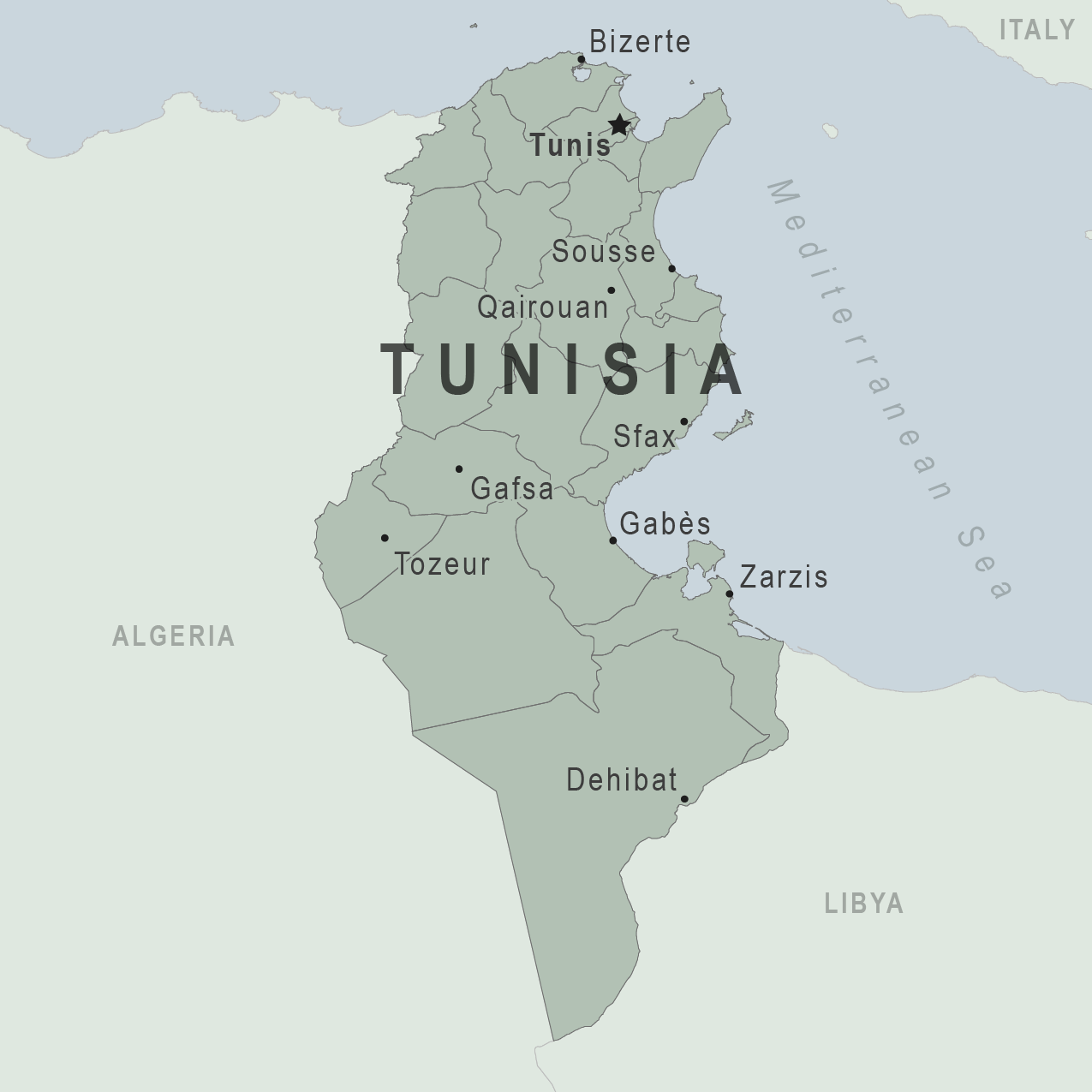
There are no notices currently in effect for Tunisia.
⇧ Top
Check the vaccines and medicines list and visit your doctor at least a month before your trip to get vaccines or medicines you may need. If you or your doctor need help finding a location that provides certain vaccines or medicines, visit the Find a Clinic page.
Routine vaccines
Recommendations.
Make sure you are up-to-date on all routine vaccines before every trip. Some of these vaccines include
- Chickenpox (Varicella)
- Diphtheria-Tetanus-Pertussis
- Flu (influenza)
- Measles-Mumps-Rubella (MMR)
Immunization schedules
All eligible travelers should be up to date with their COVID-19 vaccines. Please see Your COVID-19 Vaccination for more information.
COVID-19 vaccine
Hepatitis A
Recommended for unvaccinated travelers one year old or older going to Tunisia.
Infants 6 to 11 months old should also be vaccinated against Hepatitis A. The dose does not count toward the routine 2-dose series.
Travelers allergic to a vaccine component or who are younger than 6 months should receive a single dose of immune globulin, which provides effective protection for up to 2 months depending on dosage given.
Unvaccinated travelers who are over 40 years old, immunocompromised, or have chronic medical conditions planning to depart to a risk area in less than 2 weeks should get the initial dose of vaccine and at the same appointment receive immune globulin.
Hepatitis A - CDC Yellow Book
Dosing info - Hep A
Hepatitis B
Recommended for unvaccinated travelers younger than 60 years old traveling to Tunisia. Unvaccinated travelers 60 years and older may get vaccinated before traveling to Tunisia.
Hepatitis B - CDC Yellow Book
Dosing info - Hep B
Cases of measles are on the rise worldwide. Travelers are at risk of measles if they have not been fully vaccinated at least two weeks prior to departure, or have not had measles in the past, and travel internationally to areas where measles is spreading.
All international travelers should be fully vaccinated against measles with the measles-mumps-rubella (MMR) vaccine, including an early dose for infants 6–11 months, according to CDC’s measles vaccination recommendations for international travel .
Measles (Rubeola) - CDC Yellow Book
Rabid dogs are commonly found in Tunisia. However, if you are bitten or scratched by a dog or other mammal while in Tunisia, rabies treatment is often available.
Consider rabies vaccination before your trip if your activities mean you will be around dogs or wildlife.
Travelers more likely to encounter rabid animals include
- Campers, adventure travelers, or cave explorers (spelunkers)
- Veterinarians, animal handlers, field biologists, or laboratory workers handling animal specimens
- Visitors to rural areas
Since children are more likely to be bitten or scratched by a dog or other animals, consider rabies vaccination for children traveling to Tunisia.
Rabies - CDC Yellow Book
Recommended for most travelers, especially those staying with friends or relatives or visiting smaller cities or rural areas.
Typhoid - CDC Yellow Book
Dosing info - Typhoid
- Avoid contaminated water
Leptospirosis
How most people get sick (most common modes of transmission)
- Touching urine or other body fluids from an animal infected with leptospirosis
- Swimming or wading in urine-contaminated fresh water, or contact with urine-contaminated mud
- Drinking water or eating food contaminated with animal urine
- Avoid contaminated water and soil
Clinical Guidance
Schistosomiasis
- Wading, swimming, bathing, or washing in contaminated freshwater streams, rivers, ponds, lakes, or untreated pools.
Avoid bug bites
Leishmaniasis
- Sand fly bite
- Avoid Bug Bites
Airborne & droplet
- Breathing in air or accidentally eating food contaminated with the urine, droppings, or saliva of infected rodents
- Bite from an infected rodent
- Less commonly, being around someone sick with hantavirus (only occurs with Andes virus)
- Avoid rodents and areas where they live
- Avoid sick people
Tuberculosis (TB)
- Breathe in TB bacteria that is in the air from an infected and contagious person coughing, speaking, or singing.
Counsel your patients on actions they can take on their trip to stay healthy and safe.
Eat and drink safely
Food and water standards around the world vary based on the destination. Standards may also differ within a country and risk may change depending on activity type (e.g., hiking versus business trip). You can learn more about safe food and drink choices when traveling by accessing the resources below.
- Choose Safe Food and Drinks When Traveling
- Water Treatment Options When Hiking, Camping or Traveling
- Global Water, Sanitation and Hygiene | Healthy Water
- Avoid Contaminated Water During Travel
You can also visit the Department of State Country Information Pages for additional information about food and water safety.
Prevent bug bites
Bugs (like mosquitoes, ticks, and fleas) can spread a number of diseases in Tunisia. Many of these diseases cannot be prevented with a vaccine or medicine. You can reduce your risk by taking steps to prevent bug bites.
What can I do to prevent bug bites?
- Cover exposed skin by wearing long-sleeved shirts, long pants, and hats.
- Use an appropriate insect repellent (see below).
- Use permethrin-treated clothing and gear (such as boots, pants, socks, and tents). Do not use permethrin directly on skin.
- Stay and sleep in air-conditioned or screened rooms.
- Use a bed net if the area where you are sleeping is exposed to the outdoors.
What type of insect repellent should I use?
- FOR PROTECTION AGAINST TICKS AND MOSQUITOES: Use a repellent that contains 20% or more DEET for protection that lasts up to several hours.
- Picaridin (also known as KBR 3023, Bayrepel, and icaridin)
- Oil of lemon eucalyptus (OLE) or para-menthane-diol (PMD)
- 2-undecanone
- Always use insect repellent as directed.
What should I do if I am bitten by bugs?
- Avoid scratching bug bites, and apply hydrocortisone cream or calamine lotion to reduce the itching.
- Check your entire body for ticks after outdoor activity. Be sure to remove ticks properly.
What can I do to avoid bed bugs?
Although bed bugs do not carry disease, they are an annoyance. See our information page about avoiding bug bites for some easy tips to avoid them. For more information on bed bugs, see Bed Bugs .
For more detailed information on avoiding bug bites, see Avoid Bug Bites .
Stay safe outdoors
If your travel plans in Tunisia include outdoor activities, take these steps to stay safe and healthy during your trip.
- Stay alert to changing weather conditions and adjust your plans if conditions become unsafe.
- Prepare for activities by wearing the right clothes and packing protective items, such as bug spray, sunscreen, and a basic first aid kit.
- Consider learning basic first aid and CPR before travel. Bring a travel health kit with items appropriate for your activities.
- If you are outside for many hours in heat, eat salty snacks and drink water to stay hydrated and replace salt lost through sweating.
- Protect yourself from UV radiation : use sunscreen with an SPF of at least 15, wear protective clothing, and seek shade during the hottest time of day (10 a.m.–4 p.m.).
- Be especially careful during summer months and at high elevation. Because sunlight reflects off snow, sand, and water, sun exposure may be increased during activities like skiing, swimming, and sailing.
- Very cold temperatures can be dangerous. Dress in layers and cover heads, hands, and feet properly if you are visiting a cold location.
Stay safe around water
- Swim only in designated swimming areas. Obey lifeguards and warning flags on beaches.
- Practice safe boating—follow all boating safety laws, do not drink alcohol if driving a boat, and always wear a life jacket.
- Do not dive into shallow water.
- Do not swim in freshwater in developing areas or where sanitation is poor.
- Avoid swallowing water when swimming. Untreated water can carry germs that make you sick.
- To prevent infections, wear shoes on beaches where there may be animal waste.
Keep away from animals
Most animals avoid people, but they may attack if they feel threatened, are protecting their young or territory, or if they are injured or ill. Animal bites and scratches can lead to serious diseases such as rabies.
Follow these tips to protect yourself:
- Do not touch or feed any animals you do not know.
- Do not allow animals to lick open wounds, and do not get animal saliva in your eyes or mouth.
- Avoid rodents and their urine and feces.
- Traveling pets should be supervised closely and not allowed to come in contact with local animals.
- If you wake in a room with a bat, seek medical care immediately. Bat bites may be hard to see.
All animals can pose a threat, but be extra careful around dogs, bats, monkeys, sea animals such as jellyfish, and snakes. If you are bitten or scratched by an animal, immediately:
- Wash the wound with soap and clean water.
- Go to a doctor right away.
- Tell your doctor about your injury when you get back to the United States.
Consider buying medical evacuation insurance. Rabies is a deadly disease that must be treated quickly, and treatment may not be available in some countries.
Reduce your exposure to germs
Follow these tips to avoid getting sick or spreading illness to others while traveling:
- Wash your hands often, especially before eating.
- If soap and water aren’t available, clean hands with hand sanitizer (containing at least 60% alcohol).
- Don’t touch your eyes, nose, or mouth. If you need to touch your face, make sure your hands are clean.
- Cover your mouth and nose with a tissue or your sleeve (not your hands) when coughing or sneezing.
- Try to avoid contact with people who are sick.
- If you are sick, stay home or in your hotel room, unless you need medical care.
Avoid sharing body fluids
Diseases can be spread through body fluids, such as saliva, blood, vomit, and semen.
Protect yourself:
- Use latex condoms correctly.
- Do not inject drugs.
- Limit alcohol consumption. People take more risks when intoxicated.
- Do not share needles or any devices that can break the skin. That includes needles for tattoos, piercings, and acupuncture.
- If you receive medical or dental care, make sure the equipment is disinfected or sanitized.
Know how to get medical care while traveling
Plan for how you will get health care during your trip, should the need arise:
- Carry a list of local doctors and hospitals at your destination.
- Review your health insurance plan to determine what medical services it would cover during your trip. Consider purchasing travel health and medical evacuation insurance.
- Carry a card that identifies, in the local language, your blood type, chronic conditions or serious allergies, and the generic names of any medications you take.
- Some prescription drugs may be illegal in other countries. Call Tunisia’s embassy to verify that all of your prescription(s) are legal to bring with you.
- Bring all the medicines (including over-the-counter medicines) you think you might need during your trip, including extra in case of travel delays. Ask your doctor to help you get prescriptions filled early if you need to.
Many foreign hospitals and clinics are accredited by the Joint Commission International. A list of accredited facilities is available at their website ( www.jointcommissioninternational.org ).
In some countries, medicine (prescription and over-the-counter) may be substandard or counterfeit. Bring the medicines you will need from the United States to avoid having to buy them at your destination.
Select safe transportation
Motor vehicle crashes are the #1 killer of healthy US citizens in foreign countries.
In many places cars, buses, large trucks, rickshaws, bikes, people on foot, and even animals share the same lanes of traffic, increasing the risk for crashes.
Be smart when you are traveling on foot.
- Use sidewalks and marked crosswalks.
- Pay attention to the traffic around you, especially in crowded areas.
- Remember, people on foot do not always have the right of way in other countries.
Riding/Driving
Choose a safe vehicle.
- Choose official taxis or public transportation, such as trains and buses.
- Ride only in cars that have seatbelts.
- Avoid overcrowded, overloaded, top-heavy buses and minivans.
- Avoid riding on motorcycles or motorbikes, especially motorbike taxis. (Many crashes are caused by inexperienced motorbike drivers.)
- Choose newer vehicles—they may have more safety features, such as airbags, and be more reliable.
- Choose larger vehicles, which may provide more protection in crashes.
Think about the driver.
- Do not drive after drinking alcohol or ride with someone who has been drinking.
- Consider hiring a licensed, trained driver familiar with the area.
- Arrange payment before departing.
Follow basic safety tips.
- Wear a seatbelt at all times.
- Sit in the back seat of cars and taxis.
- When on motorbikes or bicycles, always wear a helmet. (Bring a helmet from home, if needed.)
- Avoid driving at night; street lighting in certain parts of Tunisia may be poor.
- Do not use a cell phone or text while driving (illegal in many countries).
- Travel during daylight hours only, especially in rural areas.
- If you choose to drive a vehicle in Tunisia, learn the local traffic laws and have the proper paperwork.
- Get any driving permits and insurance you may need. Get an International Driving Permit (IDP). Carry the IDP and a US-issued driver's license at all times.
- Check with your auto insurance policy's international coverage, and get more coverage if needed. Make sure you have liability insurance.
- Avoid using local, unscheduled aircraft.
- If possible, fly on larger planes (more than 30 seats); larger airplanes are more likely to have regular safety inspections.
- Try to schedule flights during daylight hours and in good weather.
Medical Evacuation Insurance
If you are seriously injured, emergency care may not be available or may not meet US standards. Trauma care centers are uncommon outside urban areas. Having medical evacuation insurance can be helpful for these reasons.
Helpful Resources
Road Safety Overseas (Information from the US Department of State): Includes tips on driving in other countries, International Driving Permits, auto insurance, and other resources.
The Association for International Road Travel has country-specific Road Travel Reports available for most countries for a minimal fee.
Maintain personal security
Use the same common sense traveling overseas that you would at home, and always stay alert and aware of your surroundings.
Before you leave
- Research your destination(s), including local laws, customs, and culture.
- Monitor travel advisories and alerts and read travel tips from the US Department of State.
- Enroll in the Smart Traveler Enrollment Program (STEP) .
- Leave a copy of your itinerary, contact information, credit cards, and passport with someone at home.
- Pack as light as possible, and leave at home any item you could not replace.
While at your destination(s)
- Carry contact information for the nearest US embassy or consulate .
- Carry a photocopy of your passport and entry stamp; leave the actual passport securely in your hotel.
- Follow all local laws and social customs.
- Do not wear expensive clothing or jewelry.
- Always keep hotel doors locked, and store valuables in secure areas.
- If possible, choose hotel rooms between the 2nd and 6th floors.
Healthy Travel Packing List
Remind your patients to pack health and safety items. Use the Healthy Travel Packing List for Tunisia for a list of health-related items they should consider packing.
If you are not feeling well after your trip, you may need to see a doctor. If you need help finding a travel medicine specialist, see Find a Clinic . Be sure to tell your doctor about your travel, including where you went and what you did on your trip. Also tell your doctor if you were bitten or scratched by an animal while traveling.
For more information on what to do if you are sick after your trip, see Getting Sick after Travel .
Map Disclaimer - The boundaries and names shown and the designations used on maps do not imply the expression of any opinion whatsoever on the part of the Centers for Disease Control and Prevention concerning the legal status of any country, territory, city or area or of its authorities, or concerning the delimitation of its frontiers or boundaries. Approximate border lines for which there may not yet be full agreement are generally marked.
Other Destinations
If you need help finding travel information:
Message & data rates may apply. CDC Privacy Policy
File Formats Help:
- Adobe PDF file
- Microsoft PowerPoint file
- Microsoft Word file
- Microsoft Excel file
- Audio/Video file
- Apple Quicktime file
- RealPlayer file
- Zip Archive file
Exit Notification / Disclaimer Policy
- The Centers for Disease Control and Prevention (CDC) cannot attest to the accuracy of a non-federal website.
- Linking to a non-federal website does not constitute an endorsement by CDC or any of its employees of the sponsors or the information and products presented on the website.
- You will be subject to the destination website's privacy policy when you follow the link.
- CDC is not responsible for Section 508 compliance (accessibility) on other federal or private website.
Travel to Tunisia in 2024: Tips + Itinerary
By Joan Torres 20 Comments Last updated on April 29, 2024

From the most epic Roman ruins in Africa to crystal Mediterranean beaches, the Sahara and a great Berber culture, Tunisia is a small piece of land with a lot to offer and is a great alternative to Morocco as, basically, you get a similar Maghrebi culture with the difference that many parts of Tunisia remain unvisited and the country is mostly free of the classic scams.
The golden era in which Tunisia used to be a prime tourist destination came to an end with the 2015 terrorist attacks – unfortunately – but, even during those times, the vast majority of visitors were resort-like tourists, the most adventurous ones visiting the most typical tourist attractions on an organized tour.
Even my parents visited Tunisia for a few days many years ago, but went there with everything organized.
This means that Tunisia hasn’t really witnessed the arrival of independent travelers and I believe this is one of the things that make any trip to Tunisia a great travel experience, as you will be continuously meeting curious, kind-hearted locals everywhere you go.
No more than a few hours from any European city by air, this is perhaps, the closest and easiest exotic, offbeat destination to visit during your 1 or 2-week holiday.
This guide contains everything you need to know to travel to Tunisia , including travel tips and a compelling 2-week itinerary.
I also recommend you read: How to visit Tunis in 3 days

In this Tunisia travel guide you will find:
Table of Contents
- Getting there
- Travel insurance
- Best time to visit
- Tour or not?
- The people, the country
- Moving around
- Is it safe?
- Day 1, 2 – Tunis
- Day 3 – Sousse
- Day 4 – Monastir
- Day 5 – Kairouan
- Day 6 – El Jem
- Day 7 – Sfax
- Day 8, 9 – Tataouine & around
- Day 10, 11 – Tozeur & around
- Day 12 – El Kef
- Day 13 – Jugurtha Tableland
- Day 14 – Dougga
- More information
our recommended travel insurance for Tunisia
IATI Insurance is the most versatile insurance for any destination, including Tunisia.
🪪 How to get a tourist visa for Tunisia
Pretty much any nationality can get a 3-month visa-free on arrival.
🛫 How to get to Tunisia
How to travel to tunisia by air.
Tunis International Airport has connections with several European cities and other major cities in Africa. I recommend you check on Tunisair and Skyscanner. I personally flew from Barcelona with Tunisair.
How to travel to Tunisia by land
Tunisia has a border with Algeria and Libya .
- Algeria – You can travel to Tunisia from Algeria and use the entry point near Tabarka – not sure if foreigners can use the other borders.
- Libya – You can’t really cross from Libya, not because the border is closed but because, currently, Libya is not issuing tourist visas and the only way to get in is via an agency who will fake a business visa for you, and they don’t recommend you enter or exit via Tunisia, as it would not be credible that you came to Libya for business purposes.

🚑 Travel Insurance for Tunisia
For Tunisia, get IATI Insurance :
- All types of plans: from families to budget backpackers
- Covers both short-term trips and up to 1-year long trips.
- Covers senior citizens too
- Readers of this blog can get a 5% exclusive discount
⛅ Best time to visit Tunisia
The best thing about Tunisia is that this is really a year-round destination.
The northern part of the country is purely Mediterranean, with mild winters and hot summers so, if you fancy the beach, July and August should prove best, and towns and cities are great to visit any time of the year. The arid south, however, is best visited in winter, otherwise, the heat might not let you enjoy it that much.
I visited Tunisia for 3 weeks from mid-April to the beginning of May and it was the perfect time. The weather in the northern part was absolutely pleasant, with a little rain sometimes, and the heat in the southern part was still quite bearable.

Should you travel in Tunisia independently or on an organized tour?
I visited Tunisia 100% independently, and I recommend you do the same.
However, if you are short of time and want to visit specific places on organized tours, I recommend you use GetYourGuide , a website where you can book any type of tour, from half-day trips to several-day tours with just one click.
🕌 The people and the culture
They are too African to be considered European, but they are too European to be considered African.
These are the words from an expat American woman living in the city of Tunis who I had the chance to meet during my trip to Tunisia.
Along with Beirut , Tunis might be the most secular and open-minded Arab city and you just need to go to the city center and see how people dress.
You find traditional, religious people too, of course, but the beauty of Tunis, and Tunisia in general, is that everybody is free to practice Islam the way they please and, on most occasions, you won’t be judged.

This is why in Tunis you are likely to see a young girl with a short skirt walking in a local market among other women wearing the full hijab, a mix you will rarely see in other Arab countries.
Sousse, Monastir and Sfax are other modern cities with a significant number of liberal people, especially among the young generation.
However, religion still plays an important role in Tunisia’s society. Even Tunis has its traditional districts and the rural areas are very conservative.
But what is true is that in Tunisia there isn’t much fundamentalism compared to other Arab nations and countries in the Middle East.

Arabic is the official language in the country, and I believe it is quite similar to the Arabic spoken in Morocco and Algeria.
However, it is very different from other Middle Eastern countries, from Egypt to Oman .
In fact, they don’t even understand each other. When I was living in Dubai, in my office there were Arabs from all the Arab countries and Tunisians would always address Middle Easterners in English.
French & English – Given this used to be a French colony, except for uneducated people from rural areas, pretty much everybody in the country speaks impeccable French, and the best educated Tunisians also have good English, so traveling in Tunisia doesn’t imply any language barrier.

🍲 Food: What can you eat when you visit Tunisia?
Just before my trip to Tunisia, I had spent around 5 weeks in Morocco, so I wasn’t really expecting to taste many different flavors, but I was very wrong.
First of all, Tunisian food is extremely spicy. Like a lot spicy, sometimes Indian-level spicy.
I don’t know why, but Tunisia must be the only Mediterranean country that uses chilis in their cuisine. They love it and also a chilli sauce named harissa , which they put everywhere.
One Tunisian lady told me that every time she travels to Europe, even if it is just for a few days, she always brings some harissa .
Moreover, due to its proximity to Italy, Italian food is a thing here, and the truth is that spaghetti with tomato sauce is a staple, something you can order in any local eatery for less than $1 sometimes, but it isn’t very good pasta to be honest.
Overall, Tunisian food is good, however, whereas in the city of Tunis (and Sousse as well) I had quite a few feasts, in the rest of the country most places would only serve very basic stuff, especially in the south, Tozeur and El Kef.

Must-try dishes in during your trip in Tunisia
- Brik – The most popular snack in Tunisia consists of a filled fried pastry, usually with egg or tuna. By the way, Tunisians love tuna.
- Ojja – Sort of a tomato stew that comes in different versions, from local sausage ( mergez ) to seafood. Ojja is available in pretty much any local eatery.
- Cous-cous – Maghrebi star-dish, and the Tunisian version is very spicy.
- Seafood – In the coastal towns of Tunisia you can find some really great seafood, the most remarkable I ate being some stewed octopus in a tomato gravy, absolutely tender and delicious. I ate it in Sousse, in a restaurant called Cafe Bellar.

🛺 How to move around: transportation
Typically, there are 2 ways to travel around Tunisia:
Traveling around Tunisia by train
The Tunisian train is great. It is reliable, relatively fast and just soooo good. There is a train line that goes along the coast all the way to Gabés and, as far as I am concerned, the whole line is fully operational.
During my visit, however, the line that connects Tunis with Gabés through Tozeur, in the west of the country, had been closed for several years, but it seems they have already resumed all trains. In any case, you can check timings on the official railway website .
Traveling around Tunisia by louage
Louages are the local mini-vans which basically, you will ride for traveling to places you can’t reach by train. I used them to travel to Kairouan, El Kef and Tozeur and some places in the south. They are very cheap.
💰 Money, budget and costs
In Tunisia, they use the Tunisian Dinar (TND) and approximately:
1 USD = 3.15 TND
Most cities will have ATMs and changing either € or USD should be very easy.
How much does it cost to travel to Tunisia?
Tunisia is cheap, much more than Morocco, mainly because of the currency’s devaluation after the massive drop in tourism. Cost of the most typical things:
- Street sandwich (falafel) – 1-2 dinar
- Local meal (1 ojja) – 5 dinars
- Meal in a good restaurant – 20 dinars
- Entrance fees to places like Dougga ruins, ribats, fortresses, museums – 8 to 12 dinars
- Budget hotel – 20-30 dinars
- Mid-range hotel – From 40-50 dinars
- Transportation – I paid around 4-7 dinars for most train journeys, same for louage.
On a tight budget, I seriously think you can go backpacking in Tunisia for $ a day 20.
Please note that the below table is just an approximation.

⚠️ Is it safe to travel to Tunisia?
Tunisia has had some safety concerns in the past, especially throughout 2015, and that was the main reason why tourism dropped dramatically.
However, the situation has improved drastically and for a better understanding, I recommend you read my analysis:
Is Tunisia a safe country to visit?
Tunisia Itinerary – Places to visit in 2 weeks
How long should you go backpacking in Tunisia for?
I personally spent almost 3 weeks, went a bit slower than the suggested itinerary and visited one or two additional places not included here such as Djerba Island.
Tunisia 2-week travel itinerary map
Day 1, 2 – Visit the capital of Tunis
A third Mediterranean, a third European and a third North African, Tunis is a city with many cultural contrasts and most likely, the starting point of your Tunisia travel itinerary.
On the one hand, the old city is composed of an African, Maghrebi medina, not very different from the ones you would find in Morocco, but without the feeling of being in a tourist trap.
And, on the other hand, you also have the European part of town, which is filled with French-style facades, boulangeries and a relatively Westernized atmosphere.
In addition, think about all the nightlife, nice restaurants, the Roman ruins of Carthage and the Mediterranean-like district of Sidi Bou Said, and I seriously believe that traveling to Tunisia just for visiting Tunis is truly worthwhile.
Things to do in Tunis
I spent whole 5 days in Tunis, and managed to squeeze the things I visited in a 3-day travel guide

Where to stay in Tunis
Backpacker Hostel – Medina Youth Hostel – Located in the heart of the medina, this is the most backpacking-friendly hostel in Tunis.
Mid-range hotel – Dar La Leila – Super nice, traditionally decorated lovely hotel, the top-rated hotel in Tunis, and super charming staff.
Top-end hotel – Dar El Jeld Hotel and Spa – A 5-star but traditional hotel that offers all the luxuries.
Best tours in Tunis
I recommend you look for tours via GetYourGuide .
Carthage and Sidi Bou Said – Roman ruins of Carthage and the Santorini-like city of Sidi Bou Said.
Bardo Museum & Medina – The classic medina + the museum containing one of the largest collections in the world of Roman mosaics.

Day 3 – The resort-like town of Sousse
This is the prime tourist destination in the country, for foreigneirs and Tunisians alike, but for independent travelers, it feels a bit odd.
It feels weird because the coastal front line of the new part of town is composed of ugly, mass tourism-like buildings, restaurants with over-priced menus and just the kind of trashy tourism I would try to run away from.
However, Sousse is the city that witnessed all those unfortunate terrorist events from 2015 , so during my visit in the month of May, it felt like a real ghost town and, in any case, the old part of Sousse is a great place to get lost in, among its narrow alleys.
Moreover, Sousse is a good base to explore a few places around such as Kairouan, Monastir or El Jem. I mean, you can find accommodation in those cities but Sousse has the largest offer of hotels, restaurants, and cafés so, for me, it made sense to hang out there for a while.
Looking for visiting Sousse on a tour? CLICK HERE TO CHECK ALL AVAILABLE TOURS IN SOUSSE
Things to do in Sousse
- Medina – Like all medinas in Africa, the medina of Sousse is a maze of streets where the highlight is getting lost and escaping from the main souvenir area.
- Great Mosque – From the 8th century. They make you pay an entrance fee, a bit unusual for being a regular mosque, but Tunisia is mostly like that.
- Ribat – Old Islamic fortress from the 8th century. It contains one of the oldest praying halls in Africa.
- Sousse Archaeological Museum – I am the least museum-friendly person but I loved the museum of Sousse because it contains some of the largest collections of Roman mosaics, including a massive one of Medusa . Check the official website for timings.
Ribat – A ribat is a small Arabic fortress typically found along the northern African coast, and built during the first years of the Muslim conquest. Most coastal towns in Tunisia have their own ribat and they tend to be pretty well-preserved. The word ”ribat” means ”defense of Islam”.

Where to stay in Sousse
Budget/backpacker – Hotel Paris – Basic hotel with relatively good Wi-Fi inside the medina. I stayed here.
Mid-range – Dar Antonia – Traditional, fancy dar in the medina.
How to get to Sousse from Tunis
There are several trains a day running to Sousse from Tunis central station.
A ticket would typically cost 10,000 dinars and it takes a bit more than 2 hours.

Day 4 – Day trip to Monastir
If you have the time, Monastir is a pleasant town that was founded as a Phoenician trading settlement more than 2,000 years ago.
Monastir is a peaceful, free-of-crowds town, as the touristic area is quite far away from the center, so it has managed to keep a certain charm, plus in my opinion, Monastir has the most well-preserved ribat in the country, a set of labyrinthic passages and stairways that seem taken from a movie.
Moreover, Monastir is the birthplace of Habib Bourguiba , the man who lead the country to independence from France and ruled the country from 1956 to 1987.
Other than that, Monastir is an all-right place to hang around for a while.
My visit here was a peculiar one. After visiting the ribat , I met with one local lady who had contacted me through Instagram and she took me to the local radio station’s offices – she was working there – and I kind of kept staring at what they were doing for a while.
Then, we went to Habib Bourguiba’s mausoleum.
You can also visit Monastir on an organized tour (along with Sousse) from Tunis. CLICK HERE TO LEARN MORE
How to get Monastir from Sousse
Monastir is a 20km train ride from Sousse and trains run continuously throughout the day for $1 or less.
The Great Roman Civil War Do you know about the famous Roman Civil War between Julius Caesar and Pompey ? It was the war that led Rome from a Republic to an Empire, and the last stage that guided Julius Caesar to victory occurred on the battlefield between Sousse and Monastir. The coolest thing about it is that today’s Monastir was Caesar’s base, and Sousse was Pompey’s. They even made a TV series on Netflix.

Day 5 – Day trip to Kairouan, the holiest city in Tunisia
Some sources claim Kairouan is the holiest Islamic city in Africa, and the fourth in the world after Mecca, Medina and the Dome of the Rock in Jerusalem.
I am not sure about that, however, because I have been to other places in the Middle East and Africa with the same claim but it is a fact that this is the holiest place to visit in Tunisia and the atmosphere is so different from anywhere along the coast, so low-key, so traditional and overwhelmingly welcoming.
Interested in visiting Kairouan on a guided tour? CLICK HERE TO SEE ALL AVAILABLE TOURS IN KAIROUAN

Things to do in Kairouan
At the Great Mosque, you can purchase one ticket that allows you to visit several sites and these are the ones I visited:
- Great Mosque – From the 7th century, one of the holiest Islamic places in Africa.
- Bir Barouta – An Ottoman-era building that was built around a well which apparently, connects to another well in Mecca. Sadly, they enslaved a poor camel that spends his day turning the well’s wheel.
- Zaouia of Sidi Sahab – Very beautiful Muslim complex with Andalusian-style tiles.
How to get to Kairouan from Sousse
There isn’t a train line passing through Kairouan, so you need to take a louage , which takes a bit more than 1 hour.
Sousse bus station is outside of town, here: 35.809717, 10.636374.
Mullah stories In Kairouan (in Zaouia of Sidi Sahab) I was approached by a kind Tunisian who gave me a 30-minute Islamic lesson in an attempt to persuade me to consider converting to Islam, and it was only 30 minutes because very kindly, I told him I had to leave. A very intense man, but I have bumped into many of those in my travels, and they always tell you the story of a British or an American who found God, hence inner-peace and happiness, after listening to his words.

Day 6 – Day trip to El Jem, an impressive Roman amphitheater
El Jem was one of my favorite places in my Tunisia itinerary.
This is home to one of the most epic Roman amphitheaters in the world, in fact, the 3rd largest one, built in the 2nd century, but for obvious reasons, it is much less crowded than the one in Rome.

Around 1km from the amphitheater, there is an archaeological museum also containing plenty of Roman mosaics, many of whom feature the scene when wild animals were released into the arena to eat convicts.
You must get the ticket at the amphitheater’s office, and it also includes the museum entrance.
Since it is on the way to Sfax, I took a train from Sousse early in the morning, visited El Jem for a few hours, and then I could easily get a train to Sfax.
Next to El Jem’s train station, there is a fancy hotel whose staff were kind enough to keep my backpack while I visited the city.
How to get to El Jem from Sousse
It’s a 1-hour train journey from Sousse central train station
Looking for guided visits to El Jem? CLICK HERE TO SEE ALL AVAILABLE TOURS TO EL JEM

Day 7 – Sfax, the coolest medina in Tunisia
Before traveling to Tunisia, I had read in a guidebook that the locals of Sfax were believed to be very thrifty hard-workers.
In my experience, most guidebooks are always filled with unlikely quotes but upon my arrival in Tunis, I spent some time discussing my Tunisian itinerary with a local guy who told me the exact same thing.
And, perhaps, this is the reason why, despite being untouched by tourism, Sfax has some sort of cosmopolitan feel by African standards, and many people there seem to be very open-minded.
Additionally, Sfax is also home to the best medina in the whole Tunisia, very big and authentic which hasn’t been spoiled yet by the arrival of tourists.
Things to do in Sfax
- Getting lost in the medina – As I said, this purely African medina is very traditional and authentic.
- Abandoned Synagogue – Tunisia used to be home to a large Jewish community and, in Sfax, there is an abandoned synagogue.
- Place de la Republique – French-style buildings at the entrance to the medina.
Where to stay in Sfax
There are 2 budget auberges (one next to other) 2km north west outside of the Medina.
For more hotel options in Sfax,
Jews in Tunisia Tunisia today has one of the largest Jewish communities in the Arab world, mainly living in Tunis city and Djerba Island. Of course, most of them migrated to Israel after the Israel-Palestinian war but many of them remain and a few synagogues are still functional, another fact that proves overall the tolerance in Tunisia.

Day 8, 9 – Tataouine & around: southern Berber lands
The lesser-visited southern part of Tunisia is an arid territory that extends all the way to the Libyan border.
Berber villages, camels, ancient ksars (fortified Berber villages), and just remoteness and inhospitality, no wonder why George Lucas decided to shoot Star Wars in these lands.
This is just so different from any place you visited in Tunisia, way more conservative and home to the Berbers, the indigenous people of North Africa before the Arabs came.
How to visit Tataouine The area is vast, touristic sites are scattered, and there is no public transportation. I mean, there are a few buses but it is not a convenient way to move around, not even for backpackers. The best way to explore this area is by either renting a car or going on a tour. I rented a car for a day in a rental car office in Medenine and paid less than $25.

Things to do in Tataouine & around
On a normal path, you will need an entire day to visit these places, and still, you may have to rush a bit. If you want to leave early in the morning, I suggest you rent the car on the day before, as rental car shops didn’t open until 9-10am.
The ”green pins” from the previous interactive map mark the following places:
- Ksar Ouled Soltane – The most well-preserved ghorfas in the area. Ghorfas are ancient 4-story buildings that Berbers used to store the grain.
- Chenini – For me, this was the best place to visit in Tataouine. A massive ancient ksar from the 12th century sitting on a hilltop. Gorgeous.
- Guermassa – Another great ksar, not as epic as Chenini’s but still great. I only saw it from the bottom because it takes almost 1 hour to go up and I didn’t have time. The top, however, can be reached by 4WD.
- Ghomrassen – Off the beaten track modern town with pretty cool local architecture, and the ideal place to stop for lunch.
- Ksar Hadada – This ksar used to be a movie set for Star Wars. I am not a big Star Wars fan, so for me, it was not that interesting, as it was nothing more than some commercial, over-restored ghorfas .

Where to stay in the area
I recommend you stay in Tataouine.
Budget – Auberge Alferdaus – An all right auberge/pension for budget travelers and backpackers.
Apartment – Dar Essadeg – Full traditional apartment.
Mid-range – Sangho Privilege Tataouine – For a comfortable stay, this oasis hotel has great facilities, including a pool, and it is not expensive at all for what you get.

Day 10, 11 – The oasis-town of Tozeur & around
Tozeur is a pleasant oasis town with a very unique old quarter whose buildings are made of bricks (hand-made apparently) and a base from which to explore other mountain oases and check out potential camel caravans.
They claim that those oases have been inhabited for 10,000 years.
If you have been reading my blog for a while, you will know that I like to be honest, and the truth is that this was my least favorite part of my trip to Tunisia.
First of all, because all those landscapes are in my opinion, a small version of the ones you find in north Oman , a country I visited multiple times. And second of all, because this was the only place where the main sites were just packed with tourists, many of them being the irresponsible type. But to be fair, it also didn’t help that the weather was awful (loads of wind and sand).
But anyways, traveling is extremely subjective and you might have a different experience.
Like Tataouine, the area around Tozeur is best explored by car or on an organized excursion. Most hotels can arrange it for you. I personally explored all places with a local friend I had met on Instagram.

Things to do in Tozeur
Please see the ”orange pins” from the previous interactive map.
- Chebika – A small village home to a massive palmeraie.
- Tamerza – Another small village with a palmeraie, a small canyon, and a waterfall.
- Midès – And another small oasis village but the highlight is the stunning views you get to see from the road that leads to it.
- Ong Jemal – A desert famous for its sunsets and the location of a Star Wars movie set, where the original decoration still remains. Tour agencies will tell you need a 4×4 to reach the place but it is not true.
Where to stay in Tozeur
Budget – Residence Warda – A budget pension good for backpackers.
Mid-range – Residence Loued – A very pleasant traditional hotel at the heart of the Old City.
How to get to Tozeur from Tataouine
The journey is rather more than 300km.
From Tataouine, you need to take a louage to Medenine and from Medenine, another one to Gabés (not sure if you can find a direct one from Tataouine).
If you are lucky and trains are functional, you should be able to take a train from Gabés to Tozeur. Otherwise, take a louage from Gabés to Gafsa and from Gafsa to Tozeur.

Day 12 – El Kef, traditional off the beaten track town
El Kef and the area around was my favorite part of my Tunisia itinerary.
It is a barely visited town and the top of the medina features a kasbah from where you get stunning views of the city and the green meadows surrounding it.
It has a very authentic, traditional atmosphere as well. I spent 3 nights here – as I used it as a base to explore some places around – and didn’t bump into a single tourist.
Where to stay in Le Kef
There aren’t many options, but I stayed in a hotel close to the Medina named Hotel Sicca Veneria , where I paid $15 a night. It was good!
How to get to Le Kef from Tozeur
It’s a long way, around 330km.
From Tozeur, you need to first get a louage to Gafsa. From Gafsa, a second louage to Kasserine and from Kasserine to Le Kef. It takes the entire day.

Day 13 – Day trip to Jugurtha Tableland
This off the beaten track gem was the top attraction I visited in Tunisia.
A natural military fortress, Jugurtha Tableland is a massive flat-topped mountain that rises above 1270 meters, and that has been used as a fortress for centuries, from the Romans to today’s Tunisian Army.
That’s why this is kind of a sensitive place, especially because this is a border area from where you see Algeria – stunning views of Algeria, by the way – so having a guard with you all the time is a must (free of charge).

How to get to Jugurtha Tableland from El Kef
From El Kef bus station, you can take a louage to the border town with Algeria named Qalat as Sanan.
Most likely, the driver will already know about your intentions, so he will drop you at the police station, where they will make you answer a few questions and register for visiting Jugurtha.
I was extremely stupid to forget my passport in El Kef but, luckily, my Spanish ID was enough for them.
Then, the police helped me looking for a taxi to take me to the bottom of Jughurta (4km), and I paid the equivalent of around $10.
Once you arrive, an official guide will welcome you and take you to the top.
It also possible to camp at the top, but you will have to get permission at the police office, and a guard will be with you all night – I mean, they have their own huts. However, be aware that it is extremely windy.

Day 14 – Day trip to Dougga Roman ruins
When I traveled to Tunisia, I also got the chance to check out this amazing place, a UNESCO World Heritage site since 1997 named Dougga,
Dougga has some of the most impressive Roman ruins I have ever seen outside of Rome, probably more stunning than the ruins of Baalbek in Lebanon , or Jerash in Jordan , not only for the ruins themselves, which are in great conditions but also because Dougga was set up in a prime, fertile location, today surrounded by beautiful olive trees and wheat plantations.
Absolutely gorgeous.
Dougga is dominated by the perfectly well-preserved Capitol, dedicated to Jupiter, but you can also find many other temples in good conditions and an amphitheater.
Allow yourself a few hours to visit the area and try to come by the end of the day, when little crowds are gone and, if possible, on a weekday.

How to get to Dougga from El Keff
It was a bit complicated.
From El Kef, I took a louage to a village named Al Karib. Once in Al Karib, I asked for a louage going to Dougga town, which is 4km from the ruins, but everybody kept me saying there weren’t any, so I decided to hitchhike the remaining 20km, but it was a bit hard, as nobody would stop, don’t know why.
Then, on my way walking from Dougga town to the ruins, a kind man – a worker – picked me up.
Coming back to El Kef was fairly easy, as I just got in the first louage that passed by. By the way, from Dougga, you could easily go back to Tunis.

❗ More information for backpacking in Tunisia
📢 In my Travel Resources Page you can find the list of all the sites and services I use to book hotels, tours, travel insurance and more.
Get the Tunisia Travel Guide by Lonely Planet – A bit outdated but so far, the only one available.

All guides and articles for traveling in Tunisia destination
- Tunis Travel Guide
- Is Tunisia Safe?
Travel guides to other countries in Africa
- Ethiopia Travel Guide
- Eritrea Travel Guide
- Somaliland Travel Guide
- Travel Guide to Sudan
- Travel Guide to Egypt
- Libya Travel Guide
- Mali Travel Guide
- Travel Guide to Mauritania
PIN IT FOR LATER

20 comments
Great blog and info as always:)Am supposed to go to Tunisia in october for 2,5 weeks ,still plan on going if……
Love reading your post, as it brings so many great memories. We have done 2 weeks roadtrip around the country too, but left the northern part for next time – I sure hope to be able to return soon and that these crazy times will be just a bad memory. All the best!
Has anyone rented a car and drove around Tunisia independently?
I did, in the south. Very easy
Man, let me tell you something and you can take it as a fact: any Arabic speaker can speak freely with another Arabic speaker from anywhere in the world. Yes, there are diferences and they can tell roughly from where the other dude is. Like I can tell a Texan from an Australian.
Hey Joan: Another great trip report. Currently planning my itinerary for my summer trip to Tunisia. This will largely be a RnR/beach vacay but looking to include some side excursions. Will likely position ourselves in Sousse and wondering if Dougga is doable as a day trip via public transportation? Also how does it compare to the amphitheatre in Busra, Syria?
Just want to make sure, the train to Sousse from Tunis is 10,000 Dinars or more than 3,000 USD for a 2 hour train ride?
Hi Joan, Thank you for a great introduction to Tunesia. Being European I typically spend my vacations at tourist hotspots in Spain, Greece, or Italy. It’s nice – but far from the adventure you’re describing. Need to convince the rest of my family to become a bit more adventourous 🙂
Mega helpful. Thank you.
Is there anyway to get from Sousse to Dougga?
Thank you for the information. Planning on a 2-week trip end of April 2023. Trying to source information about the Northern part especially traveling from/to Tunis – Bizerte – Cap Engela – Tabarka – Tunis
I’d love to visit Dougga. You said it’s possible to get back to Tunis from Dougga, is there a louage going between the two?
Hi Sarah, not from Dougga, since that is an archaeological site, but from nearby villages or towns.
Good evening, Hope everything is fine. I am planning to go to Tunisia and I wonder if there is a way to go from Medénin to Djerba Island by public transportation. If you know if there is a way I would like you to confirm it to me. Thank you in advance
Hey, I don’t remember exactly but I did go there by bus. It should be easy, just go to the bus station and ask for it
hello joan . i am planning to visit tunisia in august and move around with louages. in your article you mentioned that you visited tozeur with a louage. do you remember if it was direct ( tunis – tozeur ) or i have to change a bus in another city ? also , the station in which louage leave ( from tunis ) is called moncef bey , right ? any information will be helpful . thanks in advance and also thank you for sharing all these travel informations for countries that are not so visited . greetings from greece 🙂
Hi Konstantina! I traveled slowly from Tunis to Tozeur, stopping in many places in between, so I can’t really tell!
Hola Joan, qué tal?
A ver si hay suerte y ves el mensaje a tiempo. Estoy en Túnez y en unos tengo pensado visitar la zona alrededor de Medenine/Tataouine y estoy buscando un sitio para alquilar coche un día. Me podrías pasar el nombre, la ubicación o algún contacto aún mejor del sitio dónde alquilaste tú?
Muchas gracias, saludos!
Hola Jack, lamentablemente jamás me apunté la dirección, pero todo lo que hice fue buscar en Google Rent a Car
hello , thank you for writing about Tunisia but I think you should update your prices for the food , those prices must be from 10 years ago !
They are from 2019 but if you have any updated prices, they are most welcome 🙂
Leave a Comment Cancel reply
Your email address will not be published. Required fields are marked *
Notify me when new comments are added.
Join our Expeditions
From Syria to Iraq in Pakistan, Against the Compass is finally running expeditions to the most epic and off-the-beaten-track countries.
We have scheduled expeditions for every month of the year.
Latest posts
- How to Travel to Libya in 2024
- Backpacking Venezuela Travel Guide (2024)
- How to travel to Afghanistan during Taliban rule (2024)
- How to visit Los Llanos in Venezuela
- How to visit Angel Falls and Canaima National Park
Explore Tunisia
Plan your trip to tunisia: best of tunisia tourism.
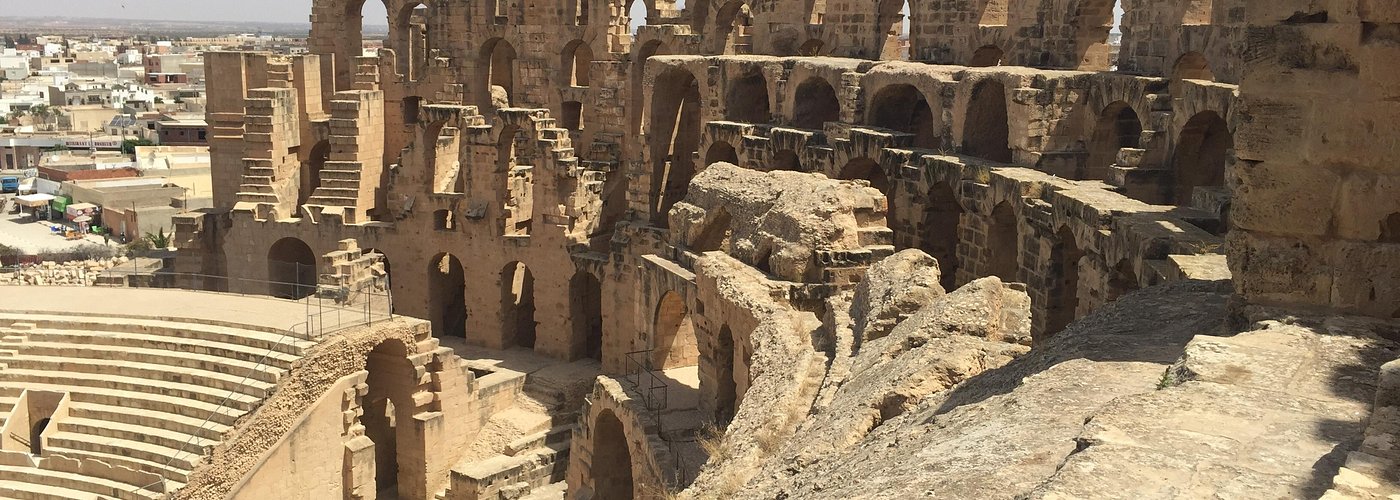
Essential Tunisia
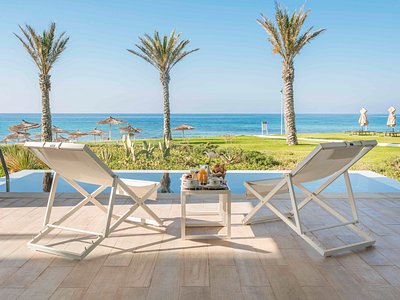
Trending in the forums
Tunisia Is Great For
Eat & drink.
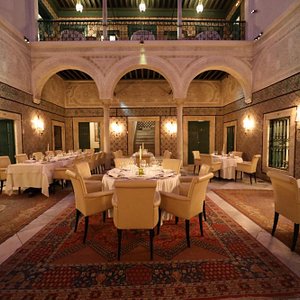
Art & history
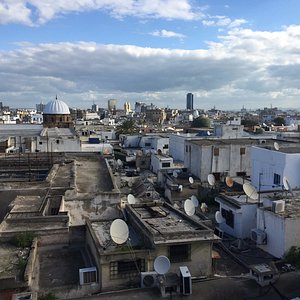
- Work With Me

- Sierra Leone
- South Africa
- United States
- New Zealand
- Falkland Islands
- Netherlands
- Accommodation
- Electrical Gear
- Essential Gear
- Working Abroad
- Blogging Resources
Africa , TUNISIA
11 top tips when you travel tunisia: key things to know before you go.
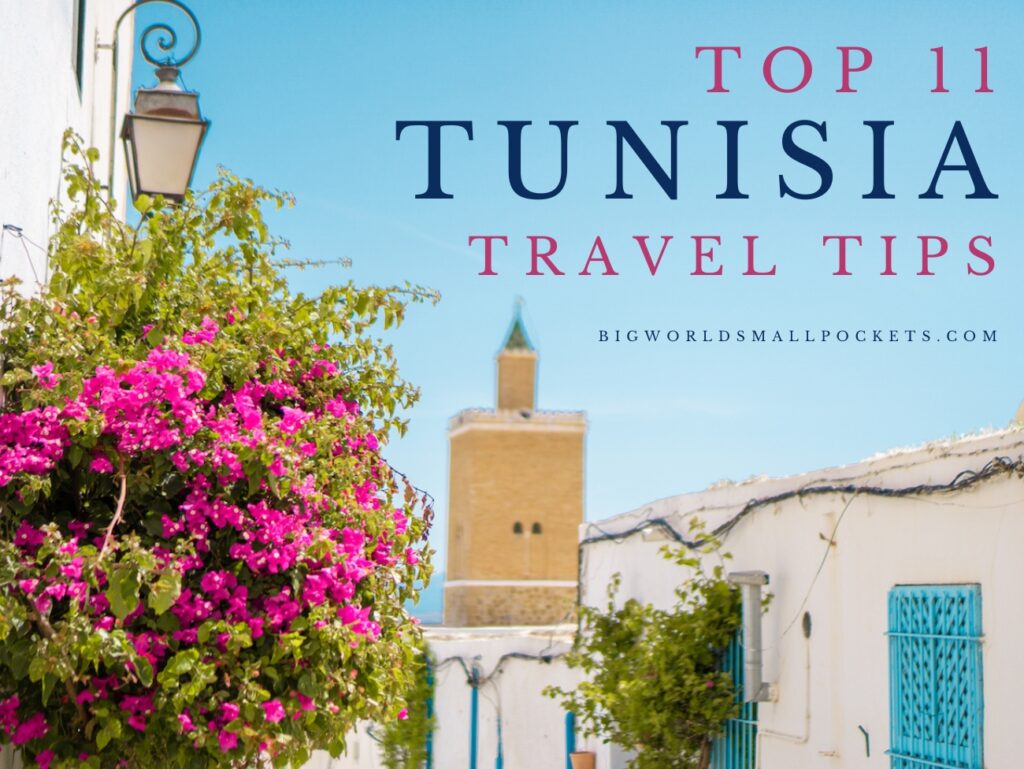
If you plan to travel Tunisia, then here’s 11 key things you should definitely know before you go!
From what to eat and how to find the best accommodation, through to the best way to get around, what to pack and some top tips for solo female travellers, this is my full guide to prepping, planning and enjoying your travels in this fantastic country.
While Morocco and Egypt may be stealing the lion’s share of tourists in north Africa, Tunisia’s charm lies precisely in the fact that large parts of the country remain wonderfully undiscovered by foreign tourists.
And from beaches to deserts, ancient historic sites to quaint cobbled-street towns, trust me when I say there’s a lot to discover here!
So if you’re heading to this fab country soon, take a read of my following top Tunisia travel tips and start planning your adventure there asap…

Related Posts
- Egypt vs Tunisia: Which is Best to Travel?
- Sidi Bou Said, Tunisia: Full Travel Guide
- 55 Best Things to Do in Africa
My trip to Tunisia was sponsored by the Authentic Tunisia campaign but, as always, all views are my own.
This page contains affiliate links meaning Big World Small Pockets may receive a small commission on any purchases at no extra cost to you.
#1 When to Travel Tunisia?
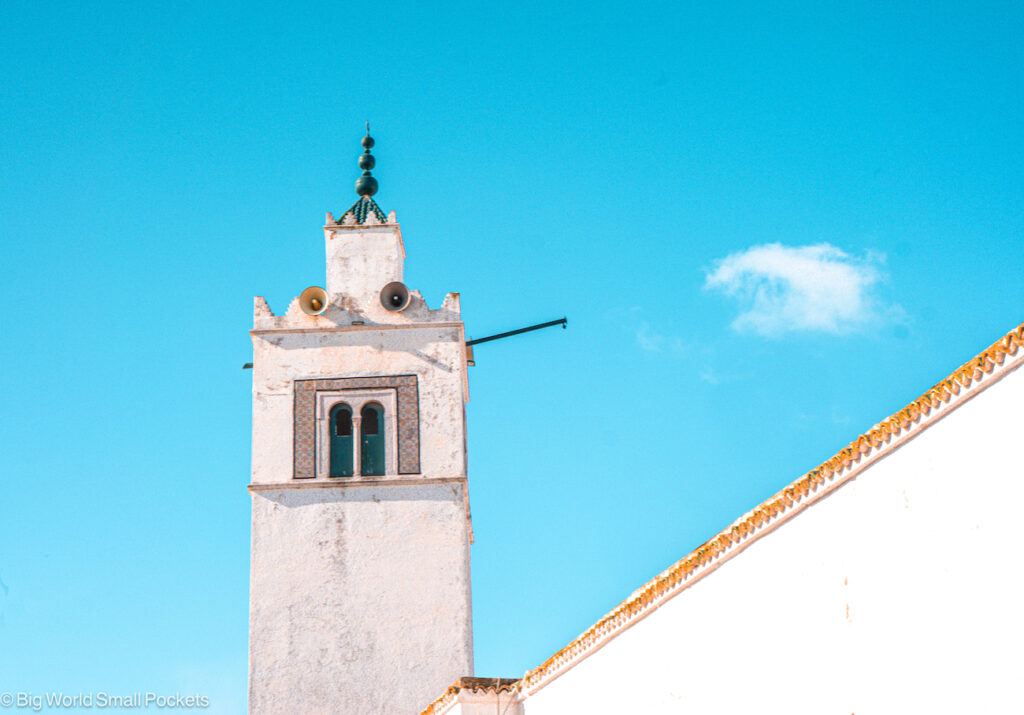
I really recommend travelling Tunisia in either the spring or autumn months.
Like other countries in North Africa, May June, September and October are ideal months to visit Tunisia because temperatures are still warm enough for sightseeing and the beach, but you’ll avoid the scorching temperatures of the summer.
Winter months are a great time to travel Tunisia if you want to avoid the crowds and get a real bargain, but do beware that, especially in the north of the country, it can be wet and cold during these months.
Learn more about when to visit each area of Tunisia, as well as a month by month overall weather breakdown, in this article I wrote all about the best time to visit Tunisia .
#2 How to Get to Tunisia?
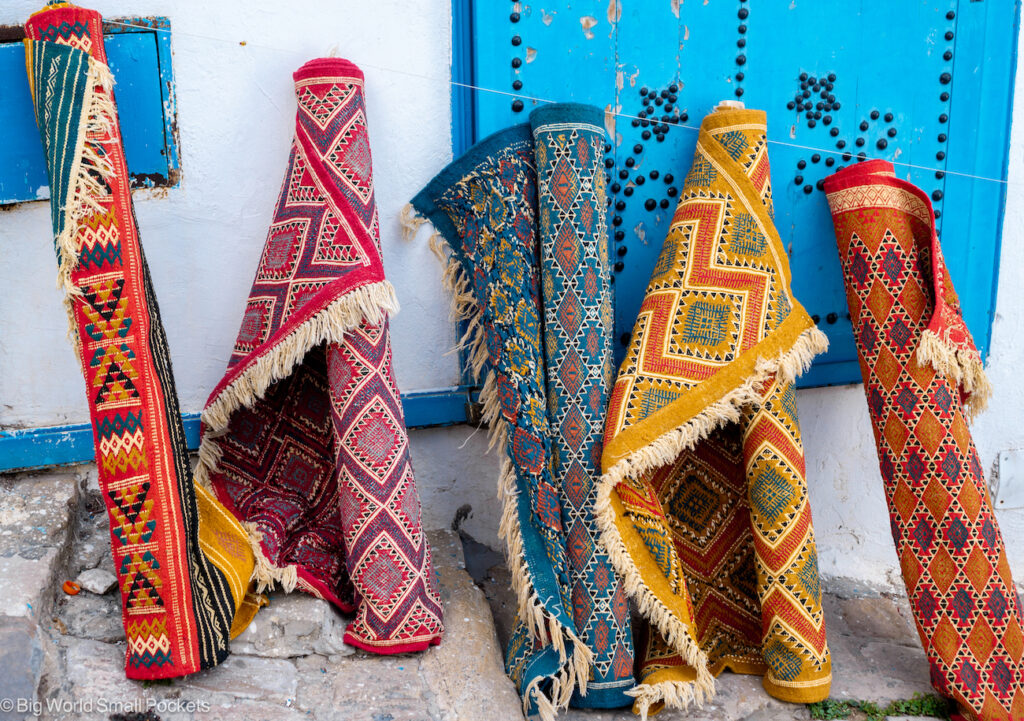
Unless you’re travelling overland from Algeria (which while is possible, is certainly not common!), the vast majority of travellers arriving into Tunisia will come by air.
There’s several international airports in this country, but the main ones are…
#1 Tunis-Carthage – best if you want to begin your travels in the capital Tunis or nearby Sidi Bou Said
#2 Enfidha-Hammamet International Airport – best option if you’re heading for a beach holiday at the Hammamet resort
#3 Djerba Zarzis International Airport – located on the beautiful island of Djerba
#4 Monastir Habib Bourguiba International Airport – situated near the coastal city of Sousse
#5 Sfax Thyna International Airport – best for exploring the south of the country
The great news is that from most European cities, flights to Tunisia only take around 2-3 hours.
As always I use Skyscanner to find the best prices.
#3 How Best to Travel Around Tunisia?
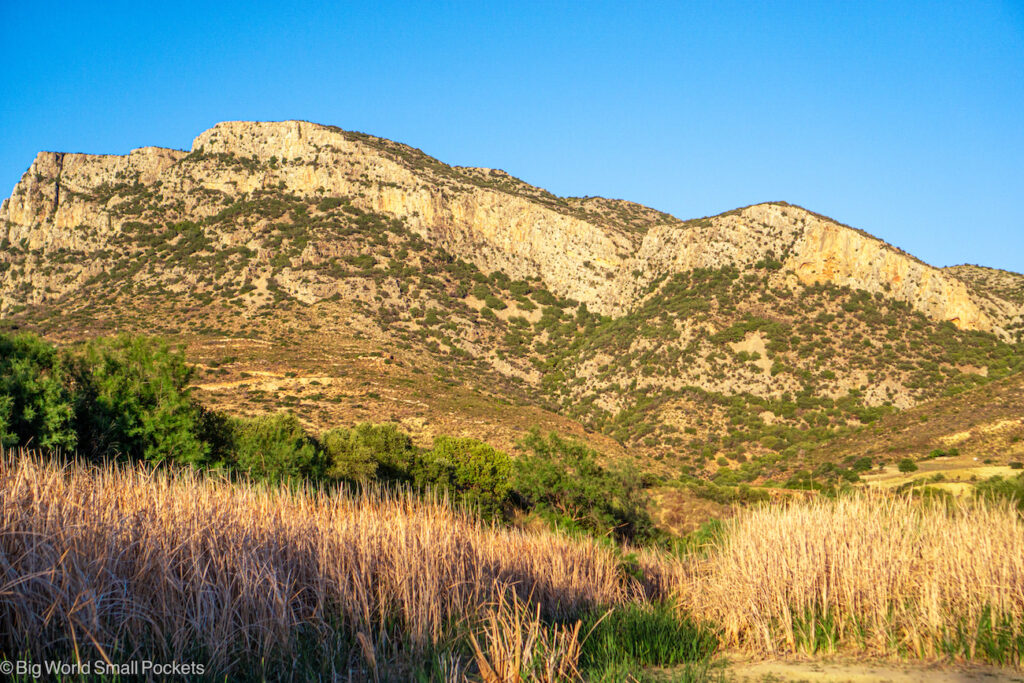
In the Tunis-Carthage area, there is a handy metro and regional light train service that gets you between the main areas.
The Bolt rideshare app (like Uber) also exists in this area and is a great idea for getting around without having to worry about language barriers and confusing prices!
Beyond that, long distance trains service major cities in Tunisia including Sousse, El Jem, Sfax, Bizerte and Gabès.
For smaller towns, buses or shared minivan taxis, known as louage , are common modes of transport.
Bookaway is a great site for booking train, bus and private transfer options in Tunisia.
Public transport can be a bit patchy here sadly, so isn’t always ideal for using if you’re on a short itinerary and want to explore a lot.
As such, I really suggest hiring a car to explore this country – especially the north and east regions – and highly recommend Discover Cars for the job.
Alternatively, if you feel more confident travelling Tunisia as part of a group, or with a guides, check out these top Tunisia tours .
#4 How Long to Travel Tunisia For?

I really recommend a minimum of 7 days to travel Tunisia.
Tthis will allow to you to enjoy a couple of destinations located close to each i.e. Tunis, Carthage, Bizerte and Dougga.
If you want to travel more widely across the north of country, including exploring fab destinations such as Al-Huwariyah, Sousse and Zaghouan, then I suggest at least 10 days for your time in Tunisia.
Check out this epic 10 day itinerary I wrote for the north of Tunisia for more ideas.
If you’d also like to explore the south of Tunisia, including the islands of Djerba and some of the key Star Wars sites in the desert, then you’ll need to allow at least 2 weeks for your travels in this country.
#5 What to Pack for Your Tunisia Travels?
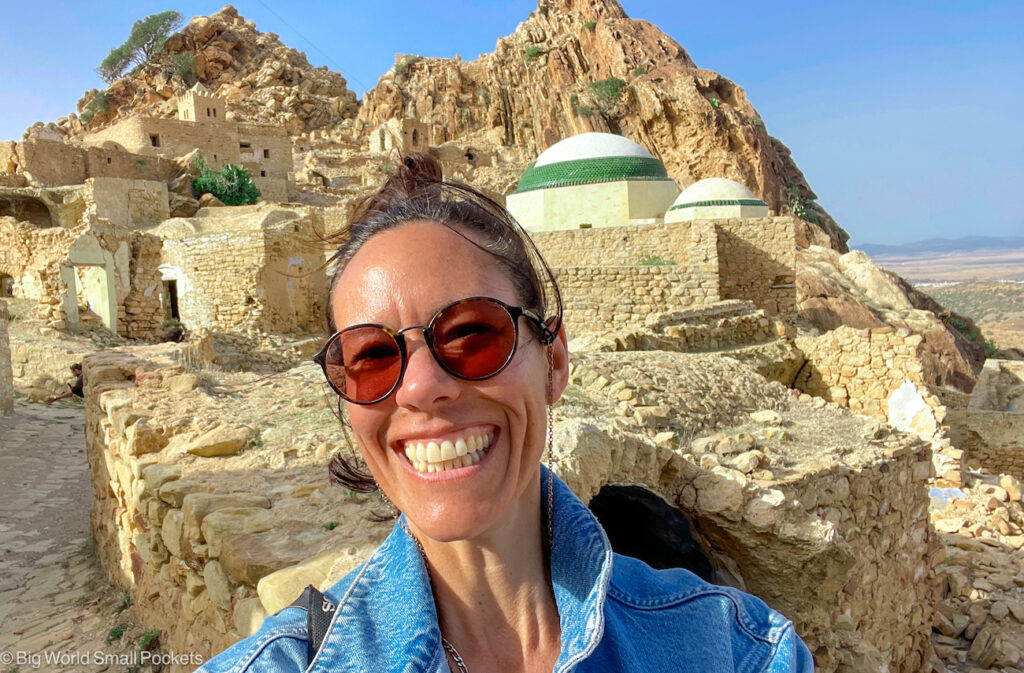
What many people don’t realise is that temperatures in Tunisia can be fresh across the country even in the spring and autumn months.
This is especially true in the more mountainous north of the country, but even in the desert at night it can get cool at these times.
As such, I certainly advise bringing some warmer layers with you, including a wind and water proof thin jacket , as well as a denim jacket and a couple of warm jumpers or fleece.
Trainers or sneakers are a great idea as well, so you can enjoy sightseeing and some active pursuits in this country, and don’t forget some longer trousers for cooler days as well.
For beach days in Tunisia, you’ll need swimwear, sunscreen, sunhat and a sarong, while for deserts and religious sites, thin light clothing that covers the knees, chest, shoulders and upper arms is required.
Outside of these items, don’t also forget a good day pack , a filter water bottle , a good camera , a decent guidebook and an Arabic or French phrasebook .
Learn more in this complete Tunisia packing guide I wrote.
#6 Travel Insurance for Tunisia

Alternatively, if you’re a long-term traveller, digital nomad or frequent remote worker seeking travel health cover, check out Safetywing’s Nomad Insurance policies.
#7 Best Things to Do in Tunisia
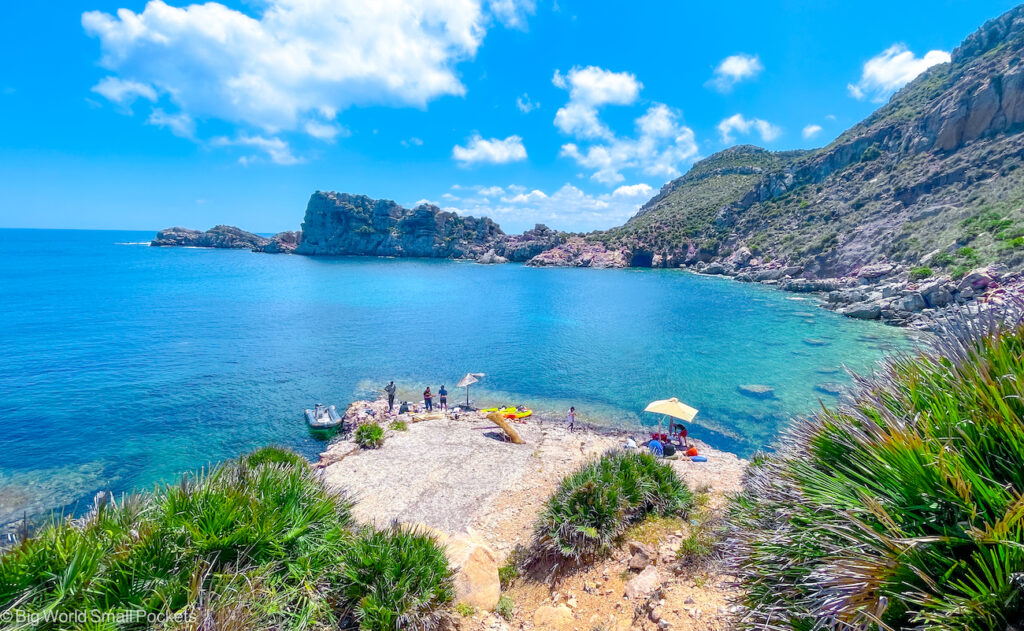
As most people are aware, Tunisia is filled with some fantastic beaches and stunning stretches of the Sahara, so if you want to get a good dose of sun, sea and sand (especially outside of the peak summer months), this country makes a great choice!
But did you know that Tunisia also offers tons of great stuff to do away from these classic pursuits, including a huge range of active and historic attractions.
Heading to ancient UNESCO-listed sites, such as the Carthage ruins, El-Djem amphitheatre, Dougga archaeological site and Kairouan’s Grand Mosque are some great examples, but between these you can also enjoy a range of outdoor adventures such as kayaking, climbing, caving, cycling, hiking, sailing and diving.
My favourite spots for outdoor activities in this country include the region of Cape Bon, Zaghouan and Siliana.
The latter of these also boasts an amazing array of traditional craft workshops with local women, from cooking to weaving.
Learn more about all these in this list of top 21 things to do in Tunisia .
#8 Is Tunisia Safe to Travel?
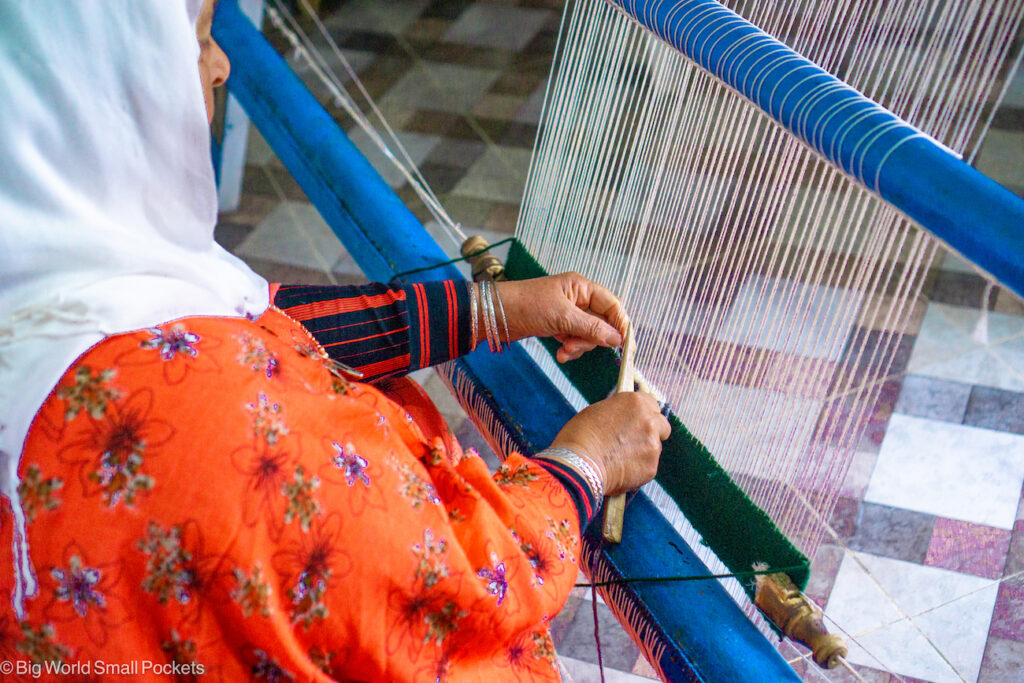
I found Tunisia incredibly safe to travel and never felt hassled, watched or pestered when adventuring here, even as a solo female.
In smaller towns especially, I felt comfortable wandering around in the evening and, generally speaking, found the country to be more liberal than other countries I’ve visited in North Africa.
In particular, alcohol was available in hotels across the country, and I found wearing three quarter-length trousers with singlets and a thin scarf to be totally adequate.
While there has been some events that have targeted tourists in the past, in general, I’d say Tunisia feels very safe to travel as long as you follow the usual common sense precautions.
Taking a SIM card is a great way to feel reassured when travelling in less familiar parts of the world too – it’s super handy for Google maps, Whatsapp and Rideshare apps, all of which help keep you safe.
aloSIM is a great solution as you can buy it online before you arrive and then ensure you’re connected as soon as you touchdown in Tunisia.
#9 Is Tunisia Expensive?
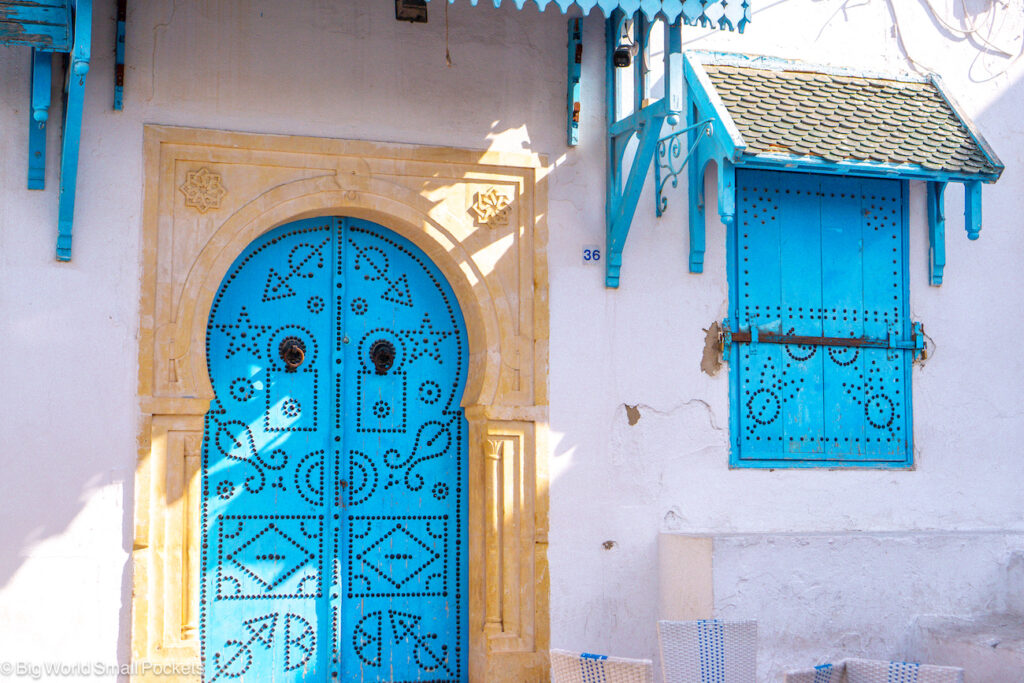
I found Tunisia incredibly cheap to travel, in fact I’d rate it as one of the cheapest countries I’ve ever been to (probably only behind Armenia, Georgia, Egypt and Turkey).
Food here is very affordable, as is accommodation, and getting around via public transport costs next to nothing.
As nightlife isn’t a big deal in this country (it’s actually non-existent in many towns!), you won’t spend much on alcohol or going out in the evening here.
The things you will spend a bit more on however are flights to the country (sadly no budget airlines fly here), as well as car hire and tours if this is how you choose to get around the country.
At the most basic end of things, you can easily travel Tunisia on $50 USD a day.
At the top end (eating in fancy resort restaurants and staying in 5* hotels), you’re looking at $300 USD+ a day.
And when it comes to spending money in Tunisia, you want to ensure you’re not being charged overseas transaction fees or getting poor exchange rates when using your card here, which is why I always take my Wise card away with me wherever I travel.
The easy way to spend abroad with real exchange rates, no markups and no sneaky transaction fees, you can use your Wise card just like a debit card in Tunisia… and it links easily with Google and Apple pay – sold! Grab yours here .
#10 Where to Stay in Tunisia?
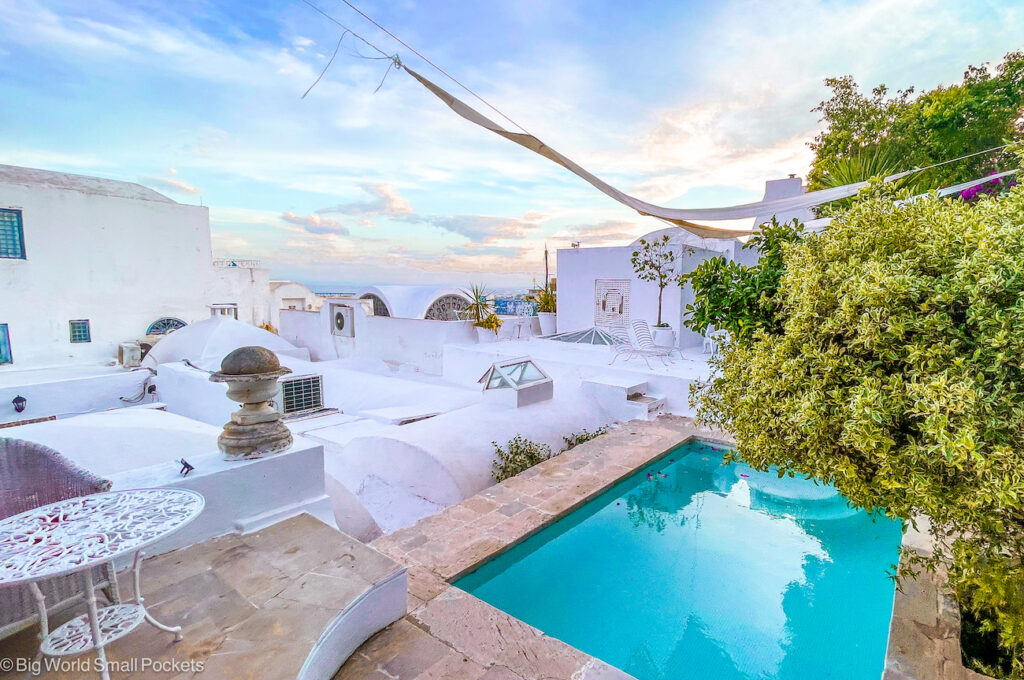
While Tunisia doesn’t have any hostels, it does however have a good selection of hotels and resorts across its main cities and resort areas.
For the best accommodation outside of these major destinations however, I high recommend the network of traditional guesthouses known as “dar”.
These are homestay like set-ups, usually in a traditional Tunisia home or guesthouses.
Small and boutique, they generally feature a few rooms, modern comforts and tend to offer homecooked meals in the evening, as well as breakfasts in the morning, which makes them even better in my opinion!
I really loved staying in these Dar properties across Tunisia because they all give a wonderful sense of the culture of this country, as well as comfortable and unique stays.
My top picks include…
Dar Aida in Zaghouan
Dar Villa Zembra in Al Huwariyah
Dar Khadijaa in Hergla
Dar Essid in Sidi Bou Said
Message these accommodation choices direct through the Instagram links above for the easiest booking process – it’s really hard for small Tunisian business to register with Booking.com or Airbnb FYI, so Instagram is the best way to book direct and get the best prices.
#11 Food and Drink in Tunisia
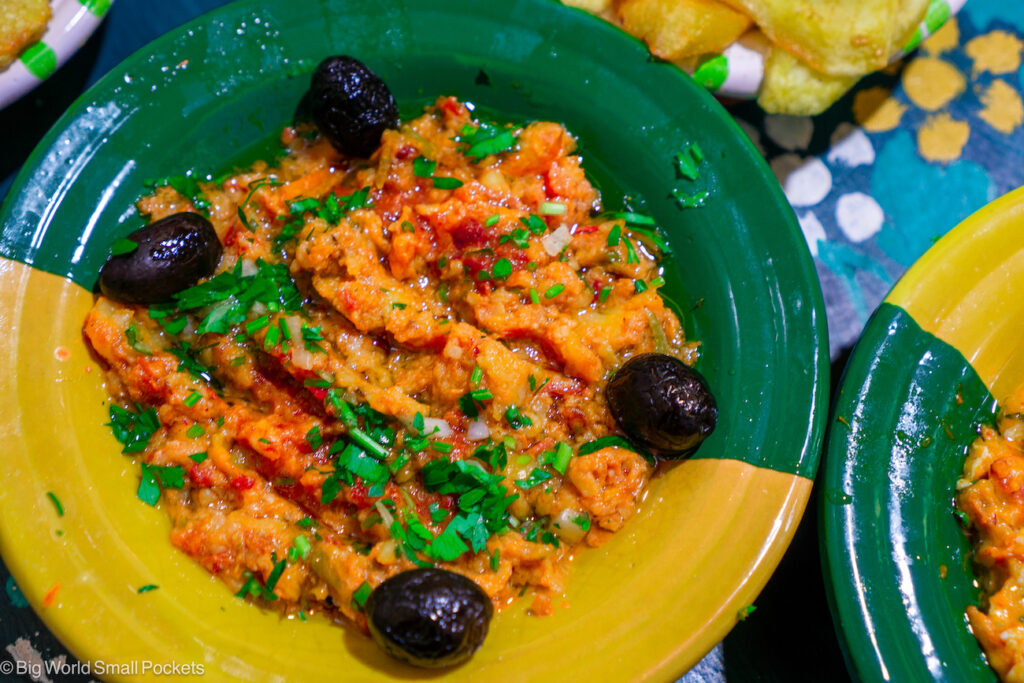
If you weren’t in the know about Tunisian food, then you’re in for a great surprise when you travel this country, because it’s honestly fantastic!
Spicy, fresh and delicious, a huge amount of food is produced in this country, which makes for a wonderful culinary tradition and almost everywhere you adventure here, you’ll get to enjoy seriously great meals.
With most Tunisian food containing either meat or fish, you’ll need to make sure you specify you don’t want either if you’re a vegetarian, but this is simple to do and most places are very happy to cater for non-meat and fish eaters I found.
Bread is a huge staple here (so non-gluten folk beware!) and spice is too, with homemade harissa being heaped on pretty much every meal… much to my delight!
Most meals are a few course long – soup, then salad, then main, then fruits, the tea and cakes! – and you’ll quickly learn Tunisian meal sizes are not small, so you have been warned!
As a majority Muslim country, alcohol is not commonly served in Tunisia and most meals are accompanied by water and finished with sweet tea.
Alcohol is not easy to find across the country, but can be sourced in tourist-orientated restaurants and hotels, which are found in most of the major towns and cities.
Tourist-dominated areas, as such as the resort of Hammamet, have lots of hotels with bars for alcohol-seeking holiday makers.
You can’t drink the tap water in Tunisia, but bringing a Water To-Go bottle with you, will allow you too safely!
Learn more about these amazing water filter travel products here .
Just enter your email address below and I'll send it to you for FREE!
Information will be sent to the email provided above
PIN IT TO PINTEREST!
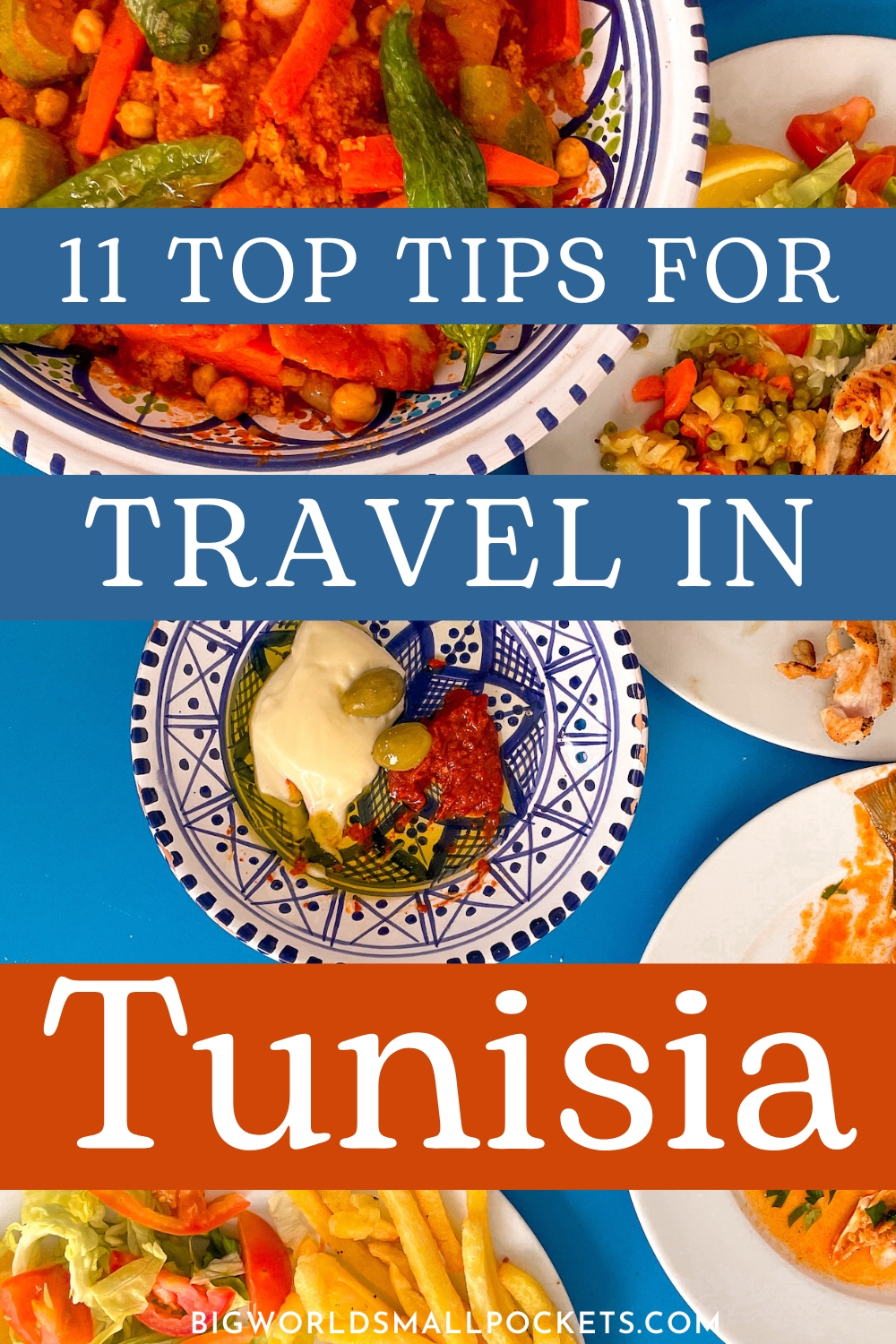
So there you have it, my top travel Tunisia tips!
If you’re looking to get off the beaten track in North Africa and away from the tourist crowds of Egypt and Morocco, then this country is for you!
Have any questions about travel in Tunisia still?
Then don’t hesitate to drop them into the comments box below and I’ll get back to you…
Creator of Big World Small Pockets, Stephanie Parker is a travel addict! Originally from Jersey in the Channel Islands, Stephanie adventures the world collecting tips, advice and stories, to share with a smile
2 thoughts on “ 11 Top Tips When You Travel Tunisia: Key Things to Know Before You Go! ”
Such a remarkable country. Thanks for all the tops and great images! Definitely going to add it to my bucket list. Safe travels 😉 Donovan
Ah so fab to hear this Donovan! Defo get Tunisia on your bucket list! Happy travels and best wishes, Steph 🙂
Leave a Reply Cancel reply
Your email address will not be published. Required fields are marked *
This site uses Akismet to reduce spam. Learn how your comment data is processed .
Cookies on GOV.UK
We use some essential cookies to make this website work.
We’d like to set additional cookies to understand how you use GOV.UK, remember your settings and improve government services.
We also use cookies set by other sites to help us deliver content from their services.
You have accepted additional cookies. You can change your cookie settings at any time.
You have rejected additional cookies. You can change your cookie settings at any time.
- Passports, travel and living abroad
- Travel abroad
- Foreign travel advice
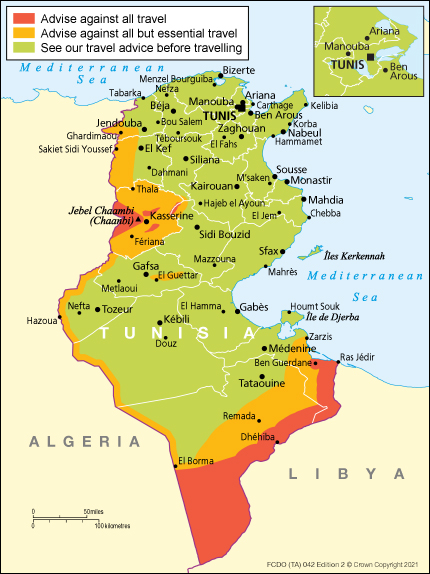
The Foreign, Commonwealth & Development Office (FCDO) advises against all travel to:
- the Chaambi Mountains National Park and the designated military operations zones of Mount Salloum, Mount Sammamma and Mount Mghila
- the militarised zone south of the towns of El Borma and Dhehiba
- within 20km of the rest of the Libya border area north of Dhehiba
- the town of Ben Guerdane and immediate surrounding area
In addition and for security reasons, the FCDO advises against all but essential travel to:
- within 75km of the Libyan border, including Remada, El Borma and the town of Zarzis
- the governorate of Kasserine, including the town of Sbeitla
- within 10km of the border with Algeria south of Kasserine governorate
- within 30km of the border in El Kef and Jendouba governorates south of the town of Jendouba, including the archaeological site of Chemtou
- areas north and west of the town of Ghardimaou in Jendouba governorate, including El Feidja National Park
- within 10km of Mount Mghila
- Mount Orbata
Before you travel, check the ‘Entry requirements’ section for Tunisia’s current entry restrictions and requirements. These may change with little warning. Monitor this advice for the latest updates and stay in contact with your travel provider.
It is more important than ever to get travel insurance and check it provides sufficient cover. See the FCDO’s guidance on foreign travel insurance .
Since 1 July, the city of Sfax has witnessed several days of civil unrest, including reports of injuries, arrests and one death, related to heightened tensions between local residents and migrants from sub-Saharan Africa. Security forces in Sfax and the region are on high alert. Further disturbances could occur with little or no warning and impact other Black people perceived to be of sub-Saharan African origin.
Terrorists are still very likely to try to carry out further attacks in Tunisia, including against UK and Western interests. There have been a number of self-initiated attacks in 2023. On 3 July a National Guard officer was attacked with a knife in the La Goulette area of Tunis.
In June, a police officer was stabbed and killed outside the Brazilian Embassy in Tunis. In May, a fatal shooting took place on the island of Djerba, near to where Tunisian and international visitors were taking part in the annual Jewish pilgrimage at the El Ghriba synagogue. Three security personnel and two civilians were killed, and ten people were injured.
Security forces remain on a high state of alert in Tunis and other places. You should be vigilant at all times, including around religious sites and festivals. Crowded areas, government installations, transportation networks, businesses with Western interests, and areas where foreign nationals and tourists are known to gather may be at higher risk of attack. You should be particularly vigilant in these areas and follow any specific advice of the local security authorities. In more remote areas of the country, including tourist sites in southern Tunisia, security forces’ response times to an incident may vary. Follow the advice of the Tunisian security authorities and your travel company if you have one. See Terrorism
Parliamentary elections took place in December 2022 and January 2023 and the new Parliament opened in March 2023.
Protests occur in Tunisia with little or no warning, and can sometimes become violent. They usually take place in central areas of Tunis and other major cities, and in the vicinity of government buildings, often but not always on weekends or around prominent national anniversary dates. In response to the current situation in Israel and the Occupied Palestinian Territories, peaceful demonstrations have occurred in some Tunisian cities, including outside some Western embassies. Avoid all protests, and move away from gathered crowds. Keep up to date with developments through the media and follow the instructions given by the Tunisian authorities as well as your hotel and tour operator, if you have one. See Political and security situation
You can contact the emergency services by calling:
- 197 (police - when in cities and towns)
- 193 (national guard - when in rural areas or small villages)
- 190 (ambulance)
- 198 (civil protection - for assistance at incidents, such as car accidents, to provide medical assistance and response to fire).
If you’re abroad and you need emergency help from the UK government, contact the nearest British embassy, consulate or high commission . Consular support may be limited in parts of Tunisia.
Related content
Is this page useful.
- Yes this page is useful
- No this page is not useful
Help us improve GOV.UK
Don’t include personal or financial information like your National Insurance number or credit card details.
To help us improve GOV.UK, we’d like to know more about your visit today. We’ll send you a link to a feedback form. It will take only 2 minutes to fill in. Don’t worry we won’t send you spam or share your email address with anyone.
- Travel Calendar
- Our travel books
- Where to stay
- Work with us
- In the spotlight
- Editorial Guidelines
Our one-week Tunisia itinerary and Tunisia travel tips
As an exciting and vibrant destination, Tunisia has been well-loved for its unique culture that blends the contemporary with the traditional. Located on the Mediterranean Sea in Northern Africa, Tunisia is a land of great beauty and contrast. With ancient ruins, golden beaches, and bustling cities, there’s something for everyone to enjoy during a one-week stay. This blog post provides a comprehensive overview of where to visit and what to do in Tunisia during a limited time frame as well as useful tips for travelers to make your journey even more enjoyable. Here are our one-week itinerary in Tunisia and our best Tunisia travel tips!

Why visit Tunisia?
If you are looking for a unique and inspiring destination to visit, then Tunisia is definitely the place for you. This Mediterranean North African country is full of historical sites and stunning landscapes that will provide endless opportunities for exploration and relaxation. With its mix of culture, natural beauty, and rich history, Tunisia offers something for everyone.
Tunisia’s warm climate makes it an ideal destination throughout the year – from sun-filled days on the beach to exploring ancient ruins in the city. The capital Tunis is a great place to start your journey; this bustling metropolis is also home to incredible Islamic architecture. For those interested in nature, there are plenty of parks and reserves such as Cape Bon National Park where you can hike amidst olive groves and take in amazing views of the Mediterranean sea. If you’re looking for more adventure than just sightseeing, then head inland and explore some of the caves such as Matmata Cave or even venture out into the Sahara Desert on a jeep safari!
No visit to Tunisia would be complete without a trip along its northern coast where you can find charming mediaeval towns like Hammamet or Sousse surrounded by beautiful sandy beaches perfect for swimming, snorkelling or just soaking up some sun! And don’t forget about all the delicious local food that awaits – from traditional tagines (stew with vegetables) to brik (deep-fried pastry filled with tuna), you won’t go hungry here!
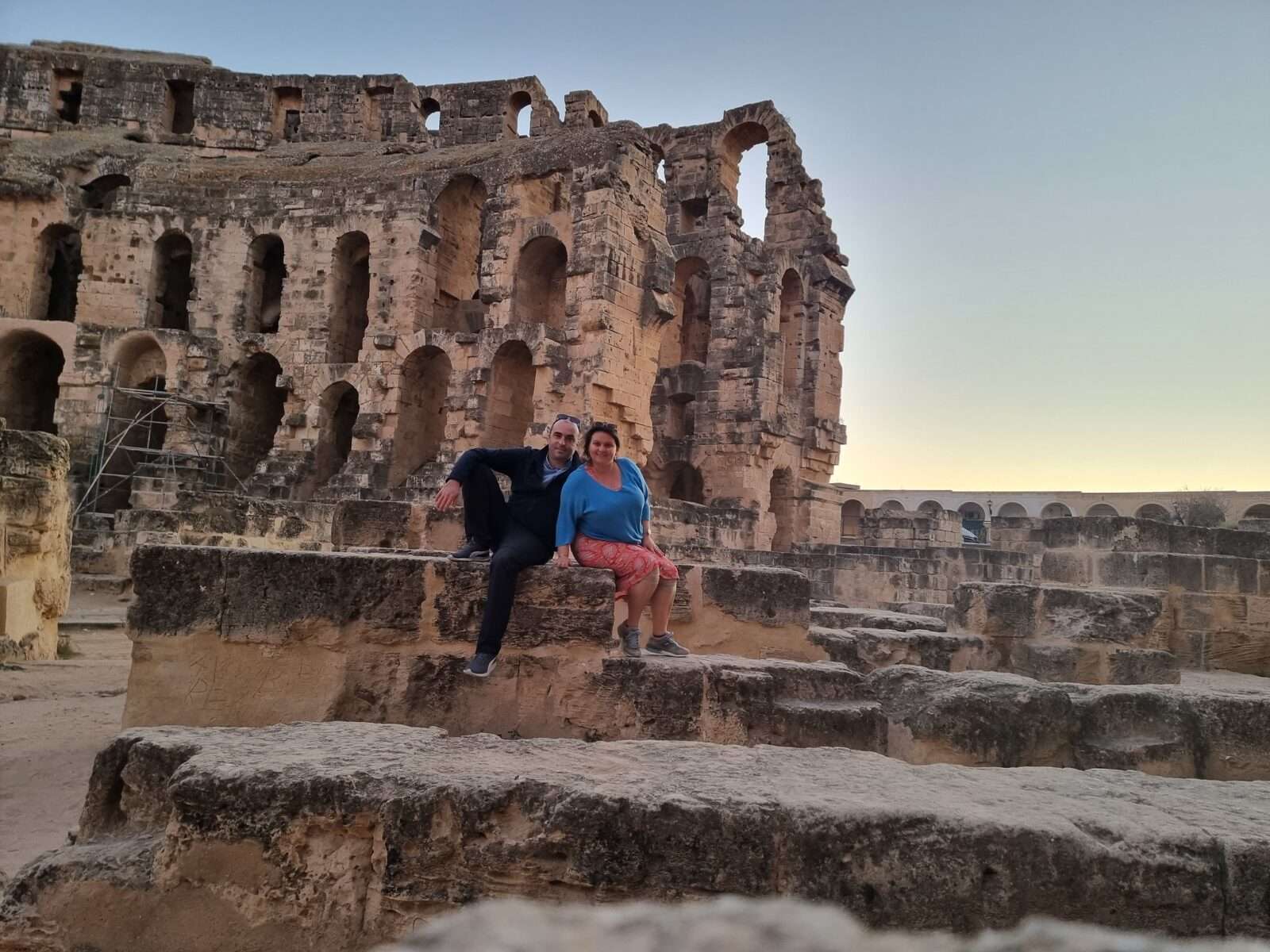
Tunisian hospitality
Tunisia is a nation renowned for its hospitality. From the moment a visitor arrives, they will be welcomed with open arms by the locals. The culture of Tunisian hospitality is rooted in their traditional values and beliefs in generosity, respect, and honouring guests. This can be seen through their custom of offering tea or coffee to visitors, as well as providing items such as dates, olives, and fruits in abundance. It is not uncommon for those visiting to receive invites to meals at local residences and to take part in social gatherings.
Tunisians also take great pride in showing off their local attractions; they will arrange guided tours of historical sites, provide insight into the culture, and even invite tourists to join them on excursions outside of the city limits. As a result of this incredible hospitality, travelers often find themselves feeling at home in Tunisia’s warm embrace. Let’s find out how we experienced the embrace of Tunisia on our one-week trip.
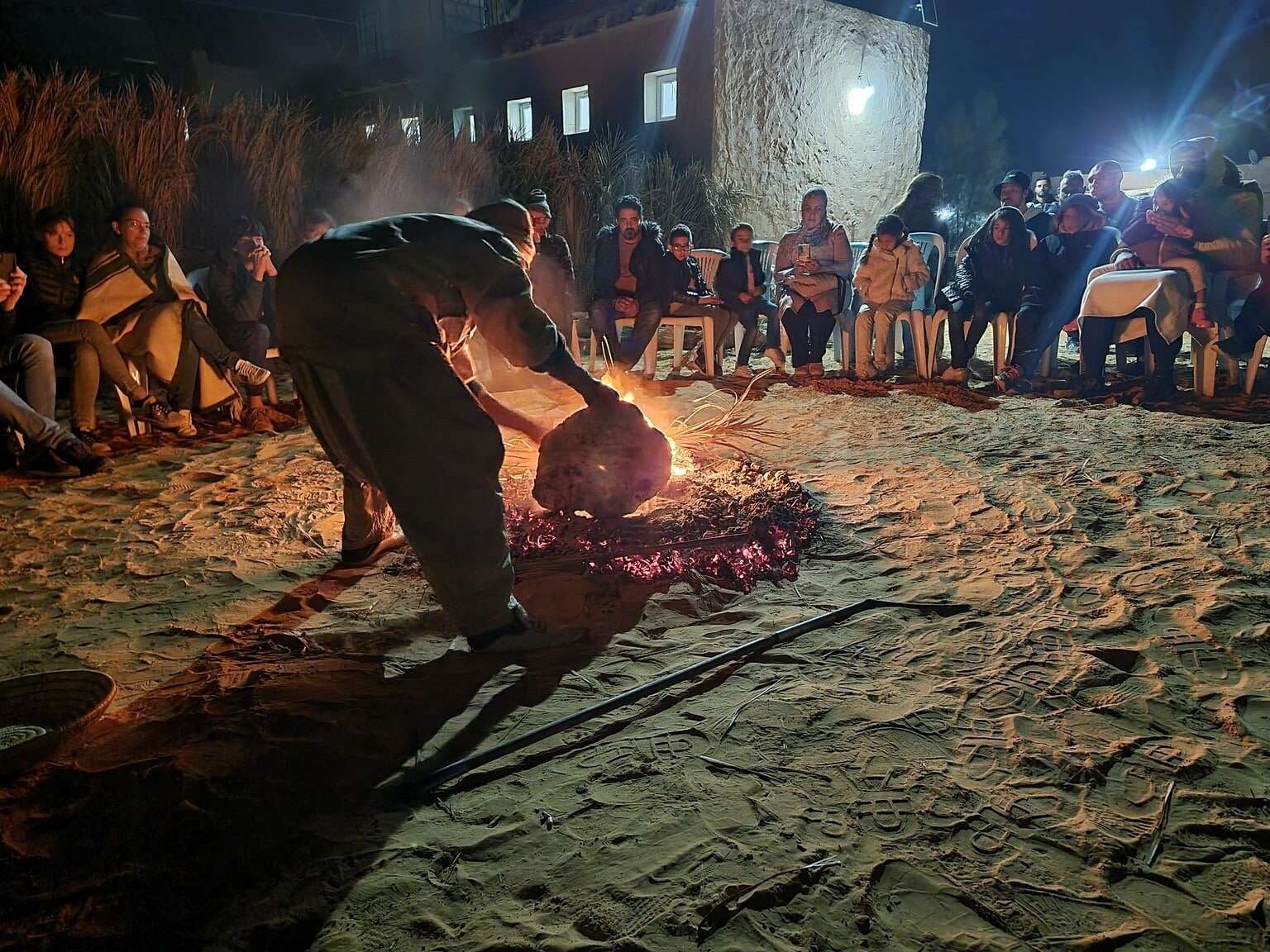
One-week itinerary in Tunisia
Tunisia is a beautiful country filled with captivating culture, history, and natural beauty. From the bustling towns of Sfax and Tunis to the secluded Tataouine desert, there are countless sights and activities that make for an unforgettable vacation. Here’s an itinerary for a week-long trip in Tunisia that is pretty much our own itinerary in the country!
This blog post contains some affiliate links to services and products we like. If you book through those links, we’ll get a small commission at no extra cost for you. Thank you for helping us keep The Magic of Traveling going!
Day 1 – Sfax
Start your journey in Sfax, the second largest city in Tunisia. This vibrant port city has been historically important since the Phoenician era and its old town of Medina still retains much of its mediaeval charms. Explore the old lanes lined with palm trees or take a peaceful stroll along the ridged beaches. Don’t forget to try some of the local seafood dishes or visit one of the many outdoor markets where you can buy spices, fabrics, and souvenirs. Walking around the souk in the morning, watching it wake up was the highlight of our visit to Sfax.
Stay in Sfax: Ibis Sfax
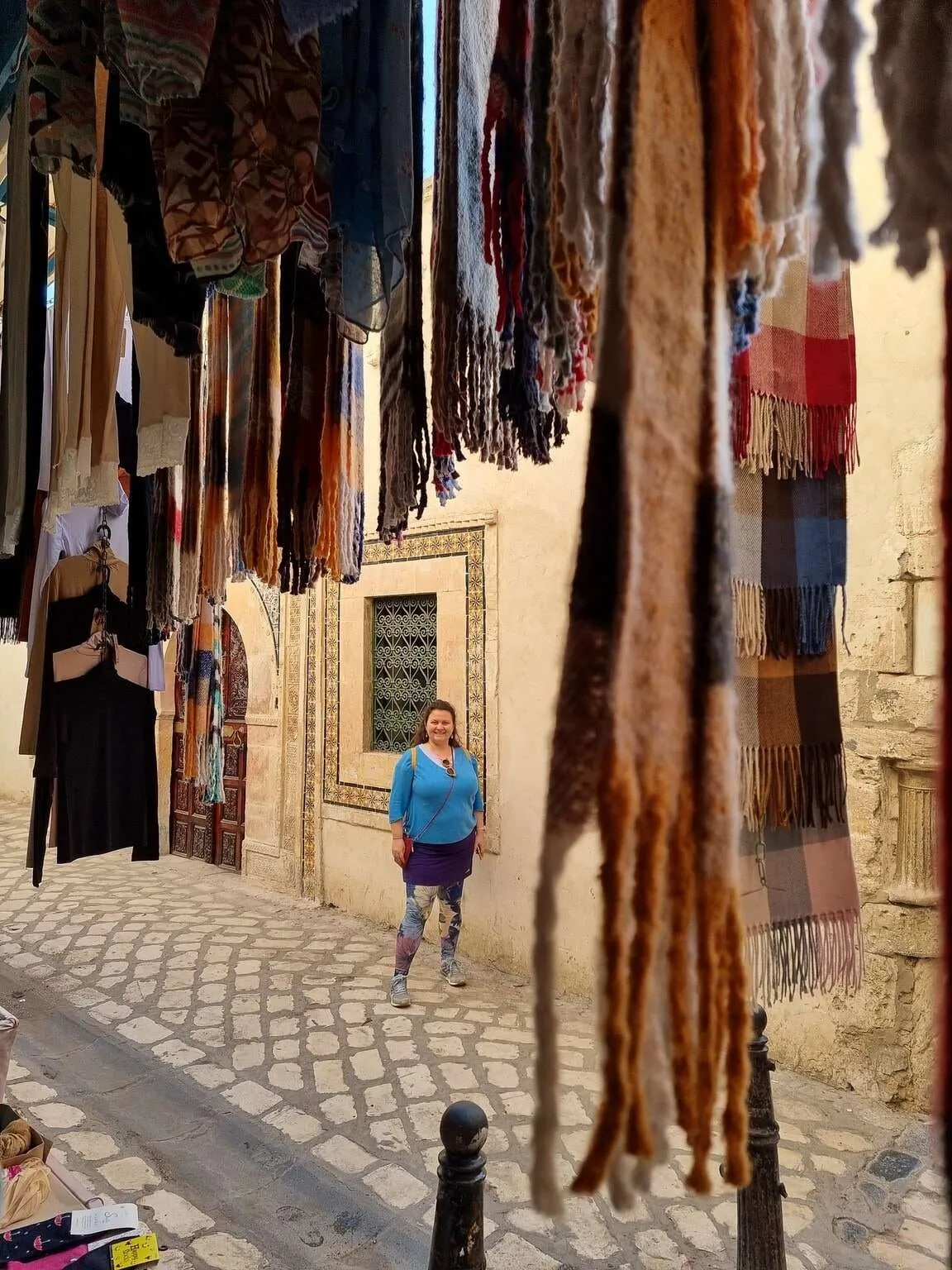
Day 2 – Djerba Island
Travel over to Djerba Island, located just off the southern coast of Tunisia. This small island is home to some picturesque beaches and winding roads plus plenty of exotic wildlife. Take a day tour around Djerba to explore its charming coastal villages or relax on some of its famous stretches of sand such as Sidi Mahrez beach or Cheikh Yahya (if you’re looking for a more secluded experience). In addition to swimming and sunbathing, there are also golf courses, spas, and restaurants for you to enjoy and explore. We recommend visiting Djerbahood, El Ghriba synagogue, Houmt Souk, and Amghar Mosque and Djerba Ajim for the Star Wars fans.
Stay on Djerba Island: Sentido Djerba Beach

Day 3 – Tataouine to Sahara desert
Go on a tour through Tataouine – the gateway between North Africa and Sub-Saharan regions – where ancient Berber architecture has remained untouched since time immemorial. While here, be sure not to miss out on Ksar Ghilane – an oasis located between two dunes where you can go swimming before venturing further into desert landscapes littered with rock formations known as ‘troglodytes’. You can choose to stay at a desert camp – as we did – and enjoy the hospitality of the locals by the fire in the evening and some amazing sunrises amogst the dunes!
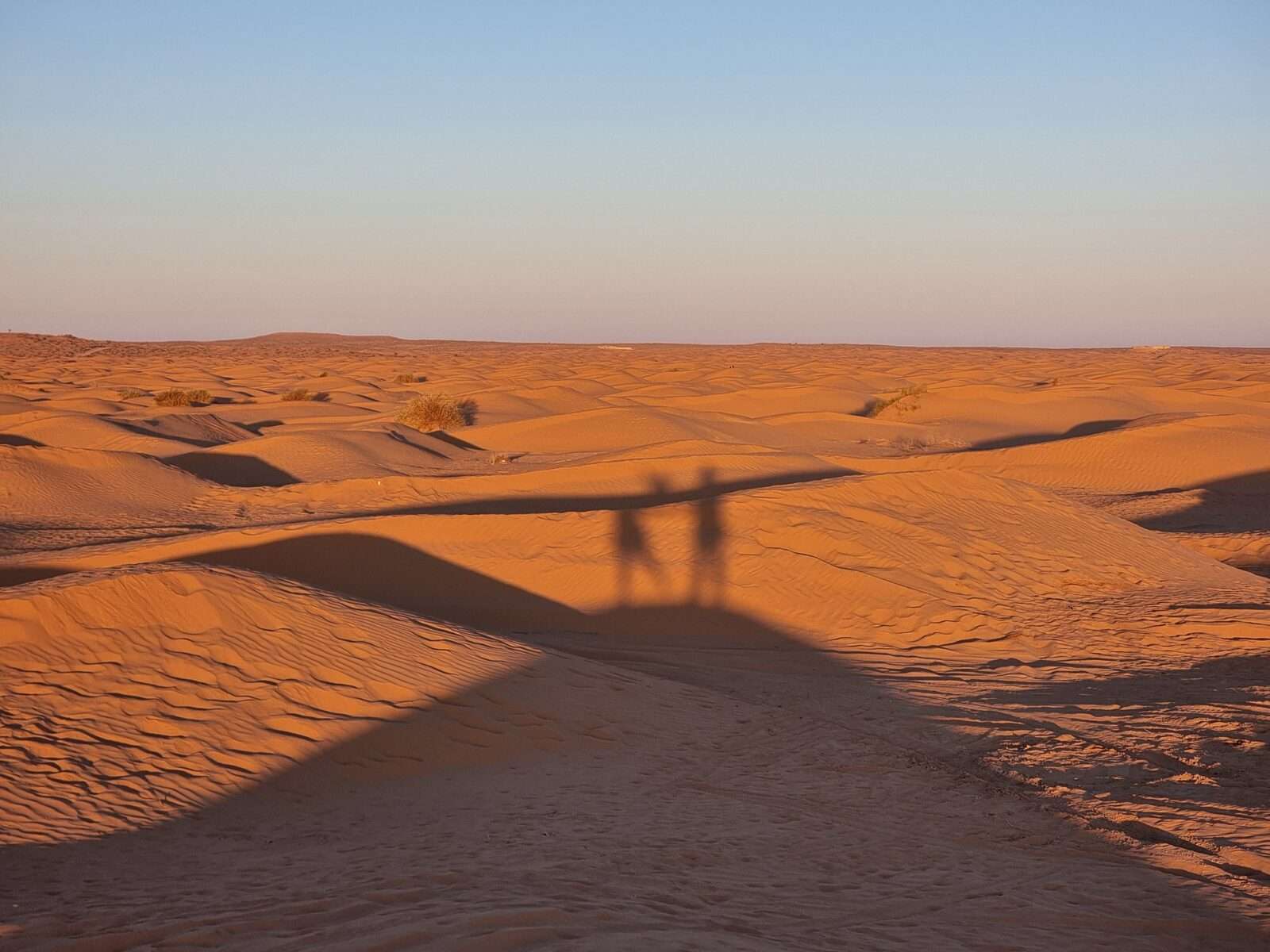
Day 4 – Matmata
Head south further into southern Tunisia towards Matmata – an ancient village built inside primitive troglodyte dwellings surrounded by rocky hillsides with lush vegetation sprouting from them. The villagers continue living according to their ancestral traditions so make sure not to miss out on any local cultural events! We visited such a house and were welcomed by tea, honey, and many smiles! Also nearby is El Jem – a large amphitheatre which could originally seat up to 35000 people making it one of the most preserved Roman ruins across Africa. Definitely worth a visit, and the sunset from the amphitheatre is just unforgettable!
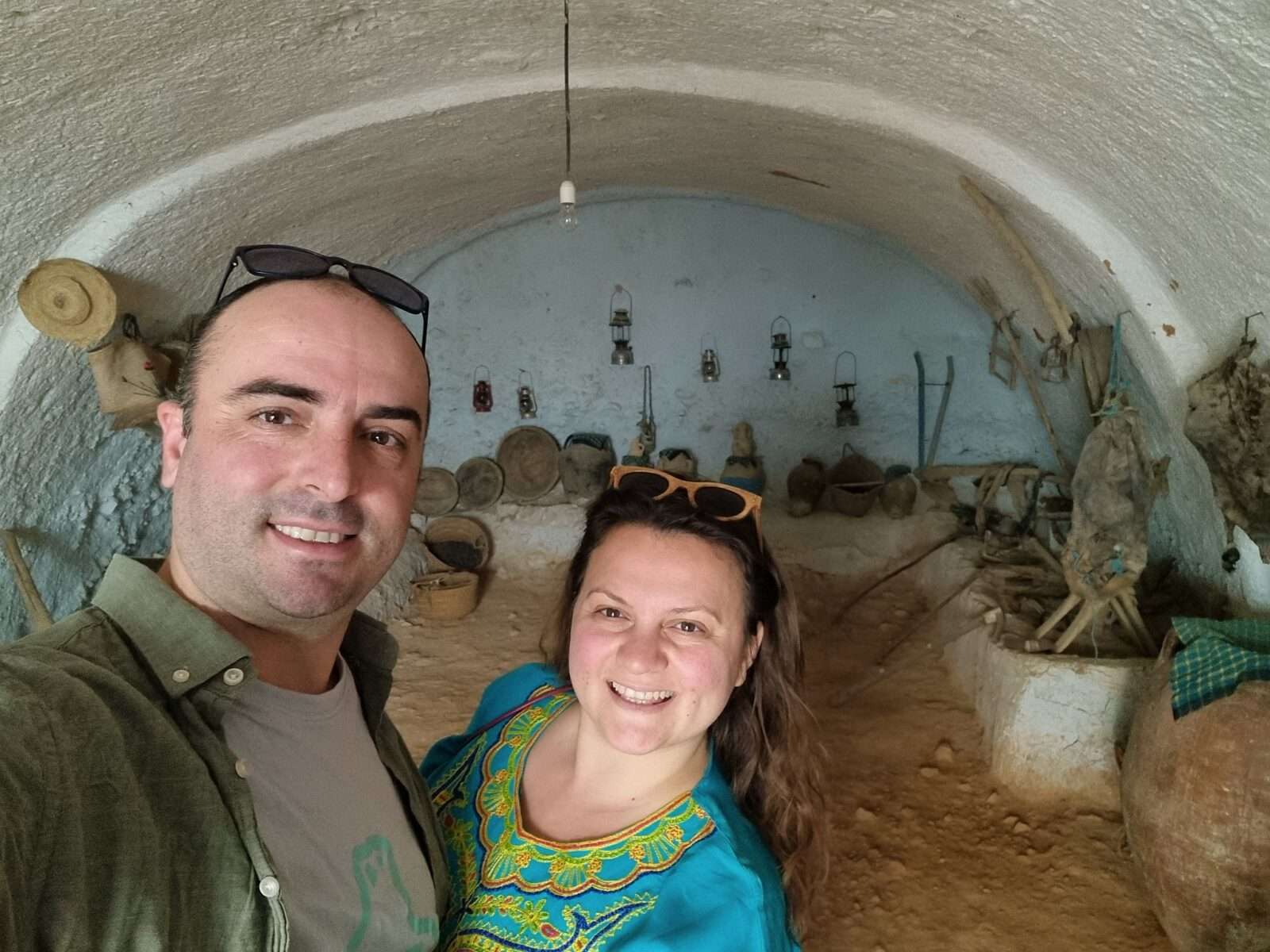
Day 5 – Monastir
Make your way back north towards Monastir – once home to ancient Carthaginian settlers who used this site as their central port harbouring ships from far off lands like Libya and Egypt during ancient times! Today Monastir is home to several Mediterranean resorts boasting tranquil beaches perfect for relaxing after a busy day exploring all that this area has to offer! Make sure to check out Ribat fortress!
Stay in Monastir: Marina Cap Monastir
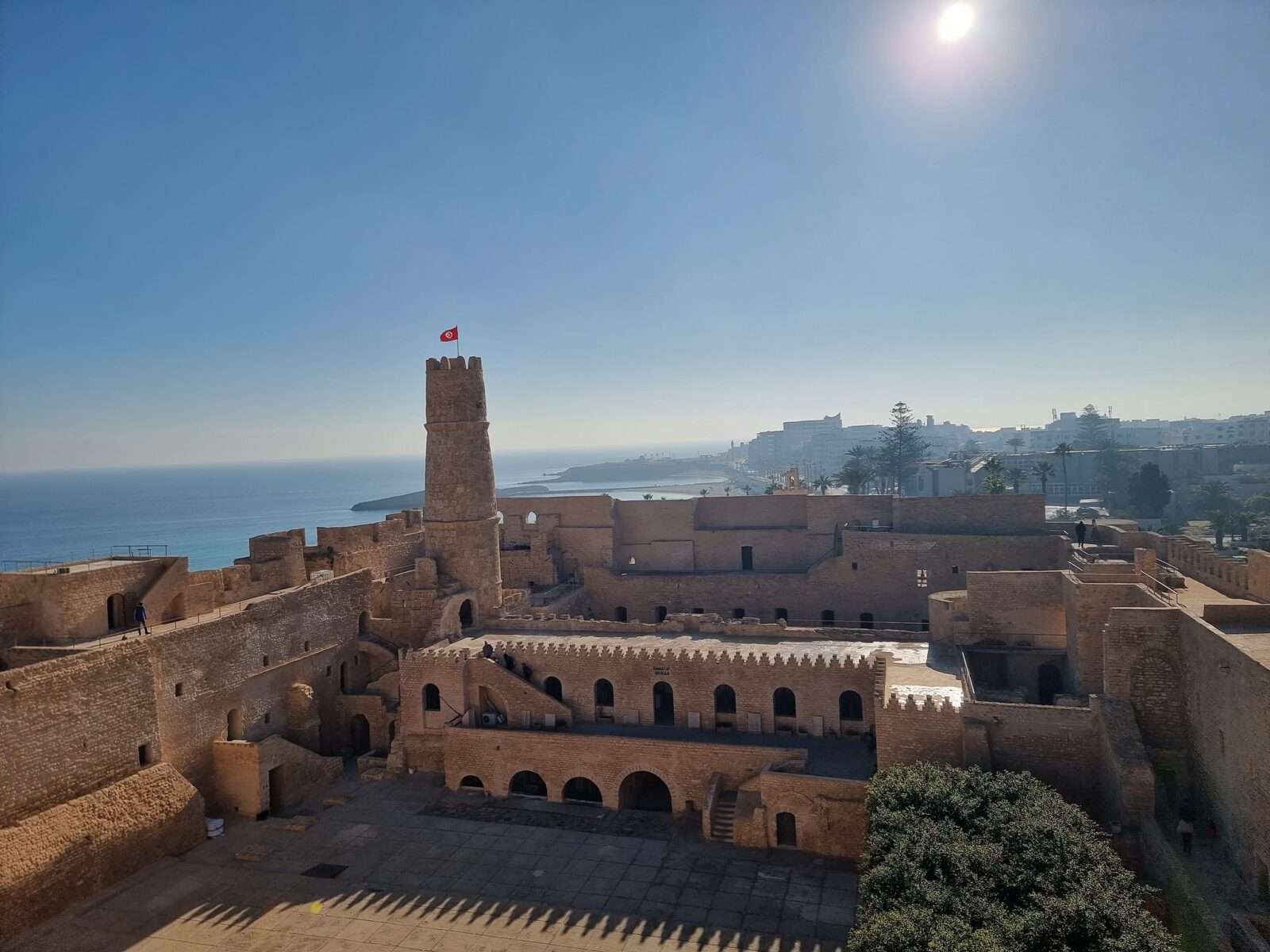
Day 6 – Carthage
Spend your sixth day visiting Carthage – once home to Queen Dido who founded this legendary city before it eventually grew into one of the most powerful empires in human history! Today Carthage lies partly in ruins with several archaeological sites scattered around giving visitors spectacular views across this unique region near the capital Tunis! After exploring these historical sites, spend some time strolling along waterfront promenades where locals come together under shady palm trees before stopping at any one of the many cafes serving traditional Tunisian delicacies!
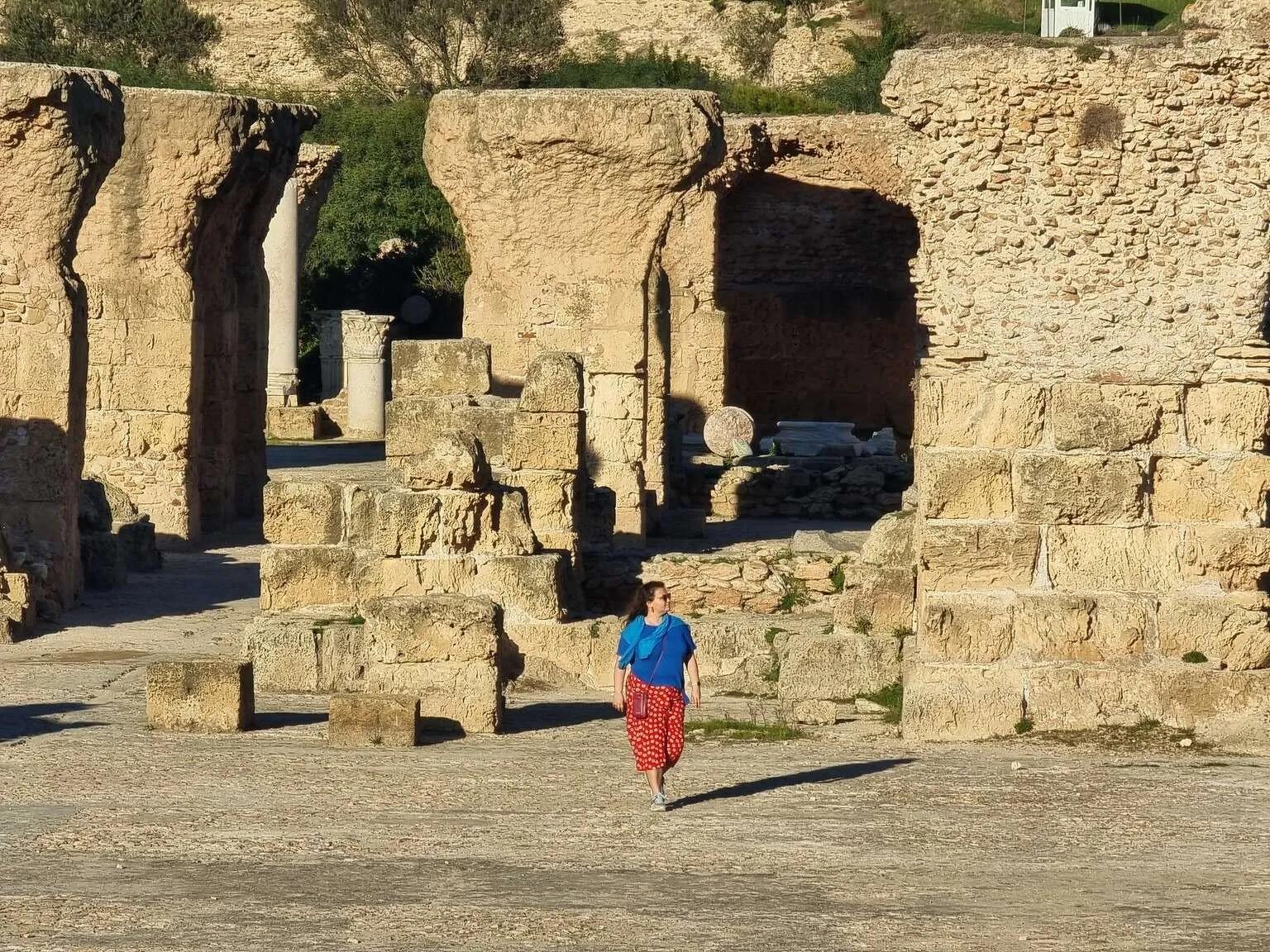
Day 7 – Sidi Bou Said and Tunis
Complete your trip by spending your last day exploring Sidi Bou Said – a beautiful hilltop village overlooking stunning azure waters full of sail boats bobbing around against colorful sunsets! Wander along alleys shaded by bougainvillaea blooms or take a relaxing break at any of the local cafes offering aromatic teas accompanied by light snacks before heading back towards Tunis. In Tunis, explore the capital nightlife or get lost in the winding streets of the souk – we felt like in a real-life escape room.
Stay in Tunis: Golf Royal Hotel
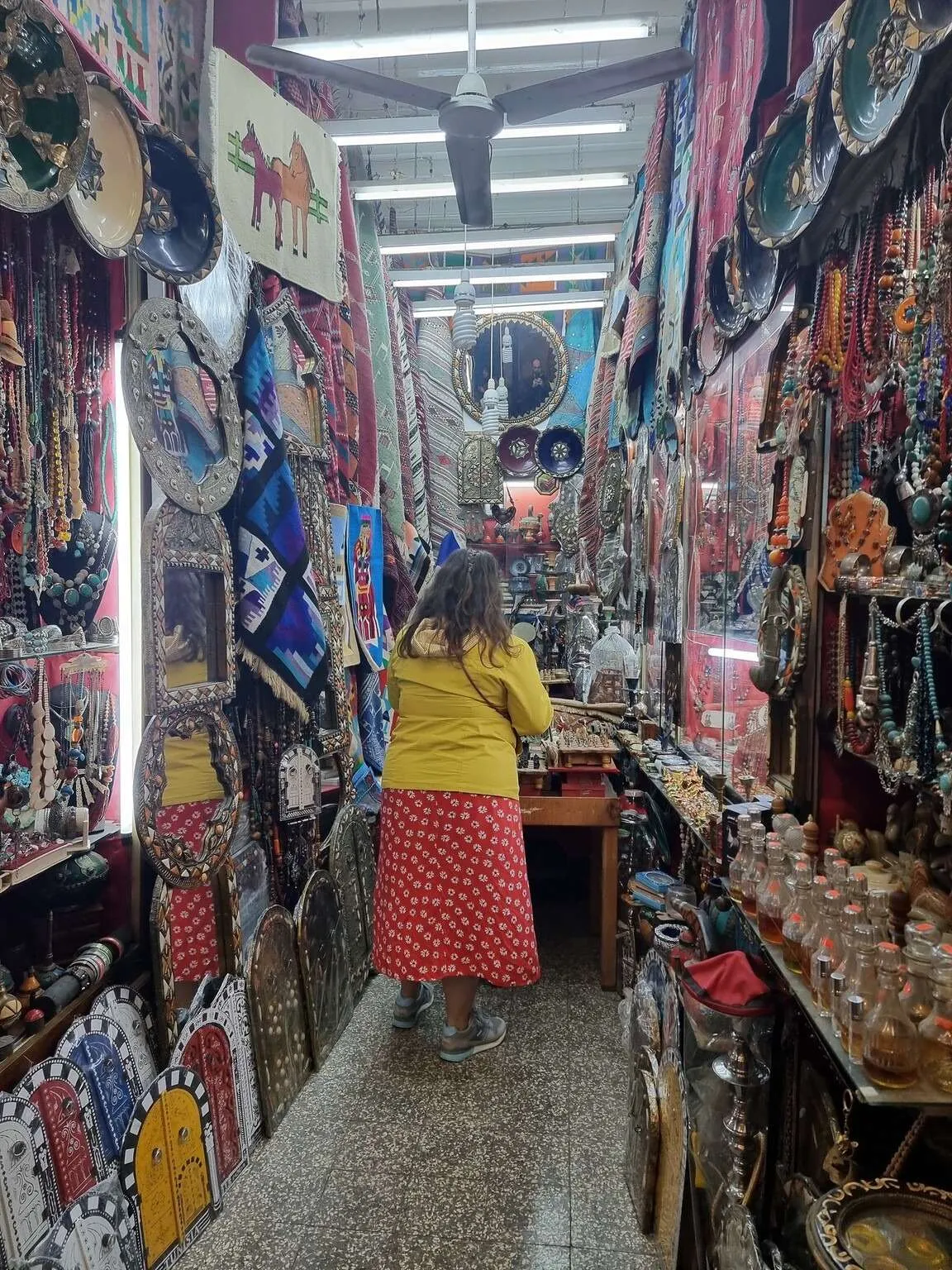
Travel tips – what do we need to know to visit Tunisia
Tunisia is one of the gems of North Africa, and it offers a unique experience for travelers. Renting a car and driving in Tunisia can be an exciting and cost effective way to explore the country and we couldn’t be more happy with the flexibility and freedom to explore it gave us, however, there are some important tips to consider before venturing out on the roads of Tunisia.
General Safety Tips
The best way to ensure your safety while driving in Tunisia is to familiarise yourself with local traffic laws and regulations. Additionally, always lock your vehicle when it’s not in use, don’t leave any valuables inside the car, and pay extra attention around major cities as they tend to have higher crime rates. Finally, make sure you have adequate insurance coverage before setting out on your road trip.
Road Trip Tips
When planning your road trip through Tunisia be sure to plan out rest stops along your route so that you won’t encounter fatigue from long stretches of driving without proper breaks. Make sure you check the condition of the roads ahead of time as certain areas are known for having poor quality roads or slow traffic due to construction projects. Also, we recommend checking the locations of gas stations and planning refilling your tank ahead. Bring some Tunisian dinars for the toll taxes.
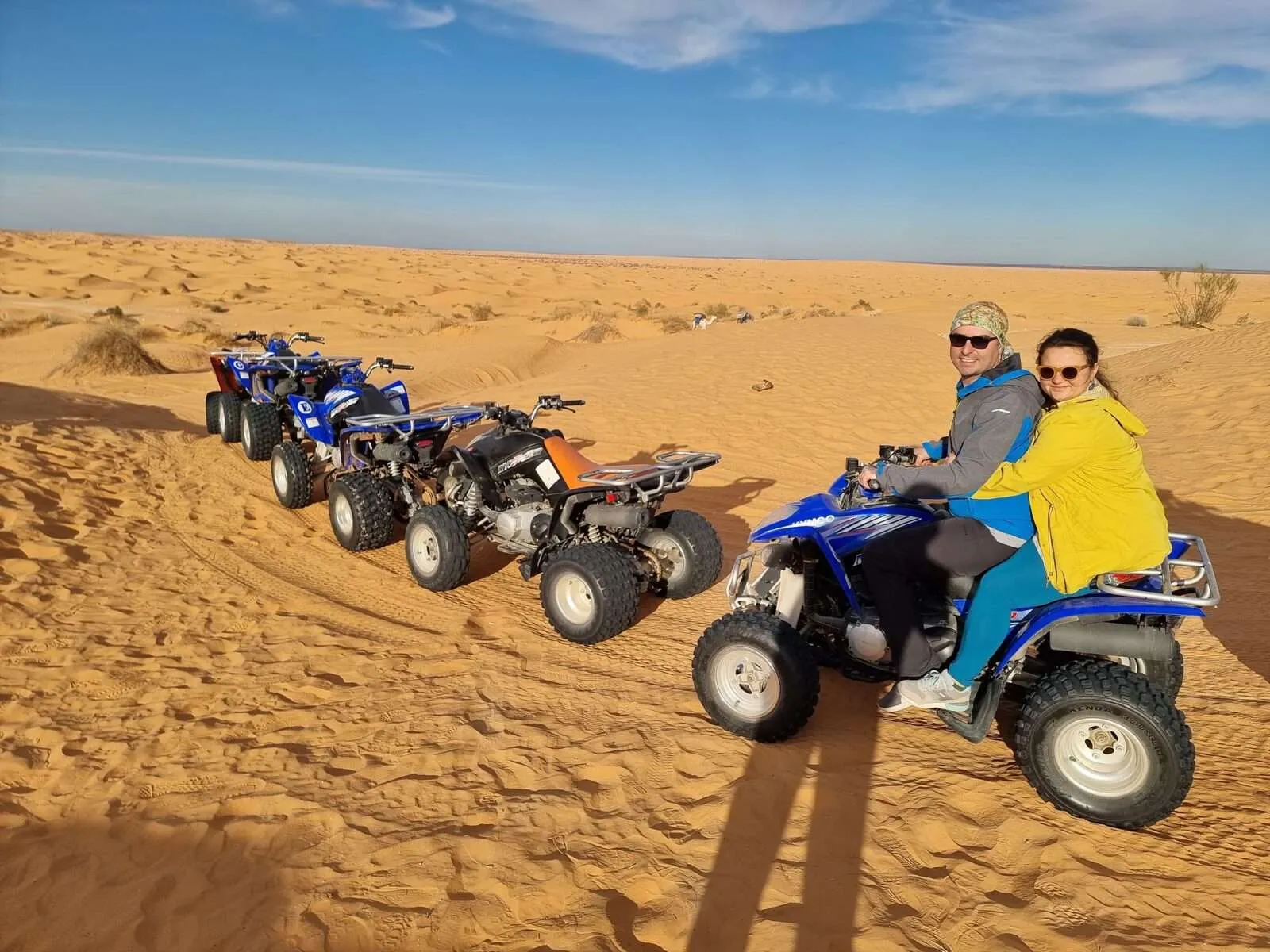
What To Eat In Tunisia
Tunisian cuisine has been influenced by its Arab neighbours over the years but also takes influence from Italy and France as well. While travelling through Tunisia be sure to sample some of their delicious dishes such as couscous, shakshuka (eggs cooked in a spicy tomato sauce), mechouia (grilled vegetables and peppers with olive oil), harissa (chilli paste served with nearly every dish), brik (meat pies) and kaak warka (a type of pastry flavoured with rosewater).
Tours To Book
If you’d like to get an even better understanding of Tunisian culture then why not book one of the many tours that are available? Some popular tour options include visiting historical sites like Carthage or Dougga which offer fascinating insight into Roman history; or go on a desert safari where you can ride camels across sand dunes and enjoy sunset barbeques under star-filled skies; or take a cooking class which will teach you about traditional Tunisian recipes so that you can recreate some amazing meals at home!
Our favourite tour we can highly recommend is the tour to the desert, Matmata and Tataouine . If you’re based in Djerba, this is the best tour to explore further afield, or find an alternative below.
The currency in Tunisia is the Tunisian Dinar (TND). The dinar has been in use since 1960 and is divided into 1000 millimes. It is distributed in coins of 1, 2, 5, 10 and 20 millimes, as well as ½ dinar. The notes are 5, 10, 20 and 50 dinars. In addition to its local circulation, currencies of other countries such as euros and US dollars can be used for some transactions in Tunisia. The exchange rate of one dinar to one euro was about 3.2 when we visited, and around 3 dinars for 1 US dollar. The Tunis-Carthage airport doesn’t accept the local currency, so make sure you spend all your dinars before you pass the security check when you leave the country.
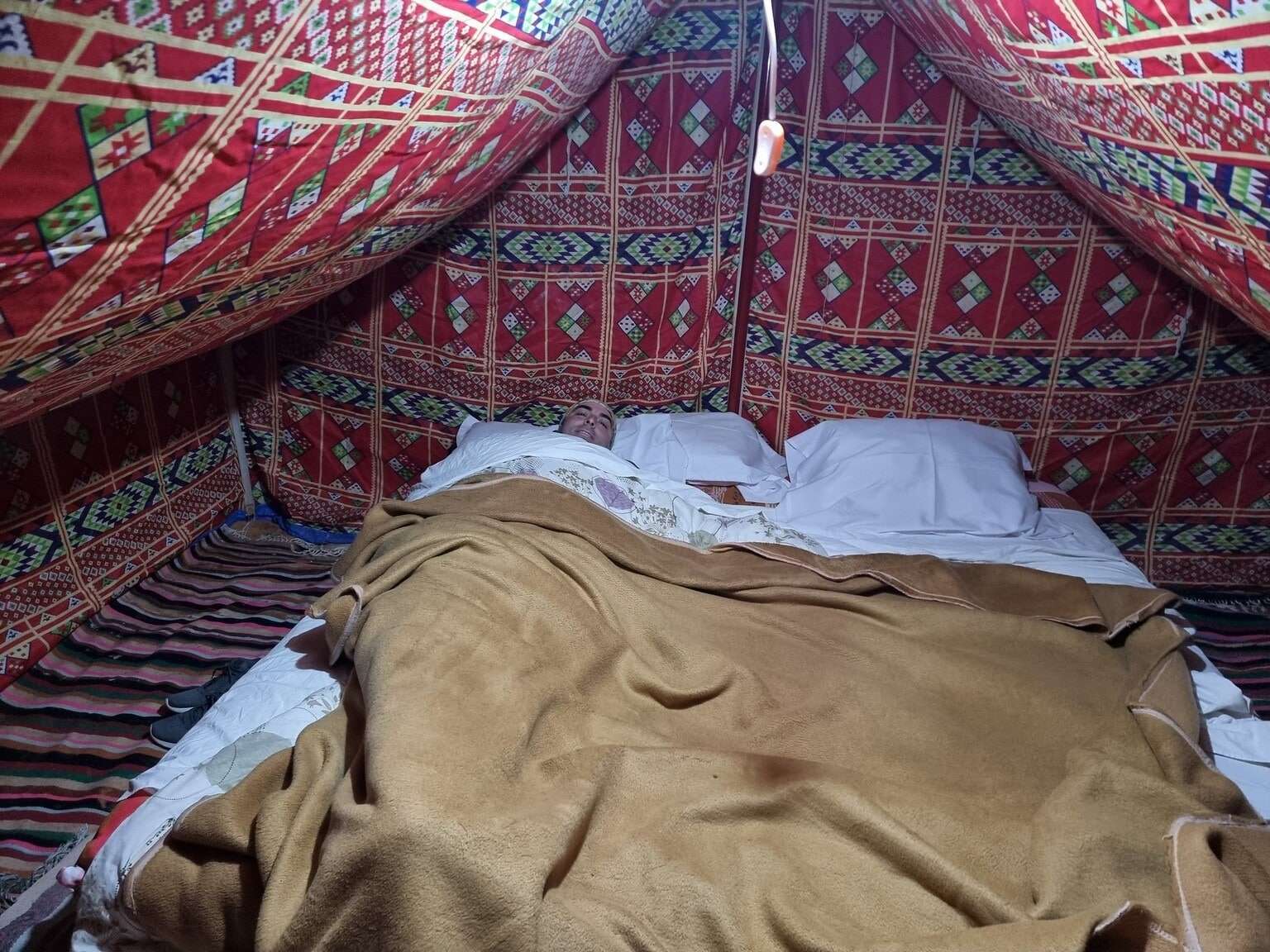
General Cleanliness
Prepare to see not so many clean places. Unfortunately, although cleanliness is deeply valued in Tunisian culture, there are so many public and open spaces that are full of trash. We didn’t enjoy seeing the sides of the roads littered, or jumping around hundreds of pieces of garbage while walking around Tunis Medina after dark.
No matter what kind of traveller you are – adventurer, historian or foodie – Tunisia has something for everyone! Whether you choose to rent a car or embark on an organised tour we hope these tips will help make your visit truly memorable!
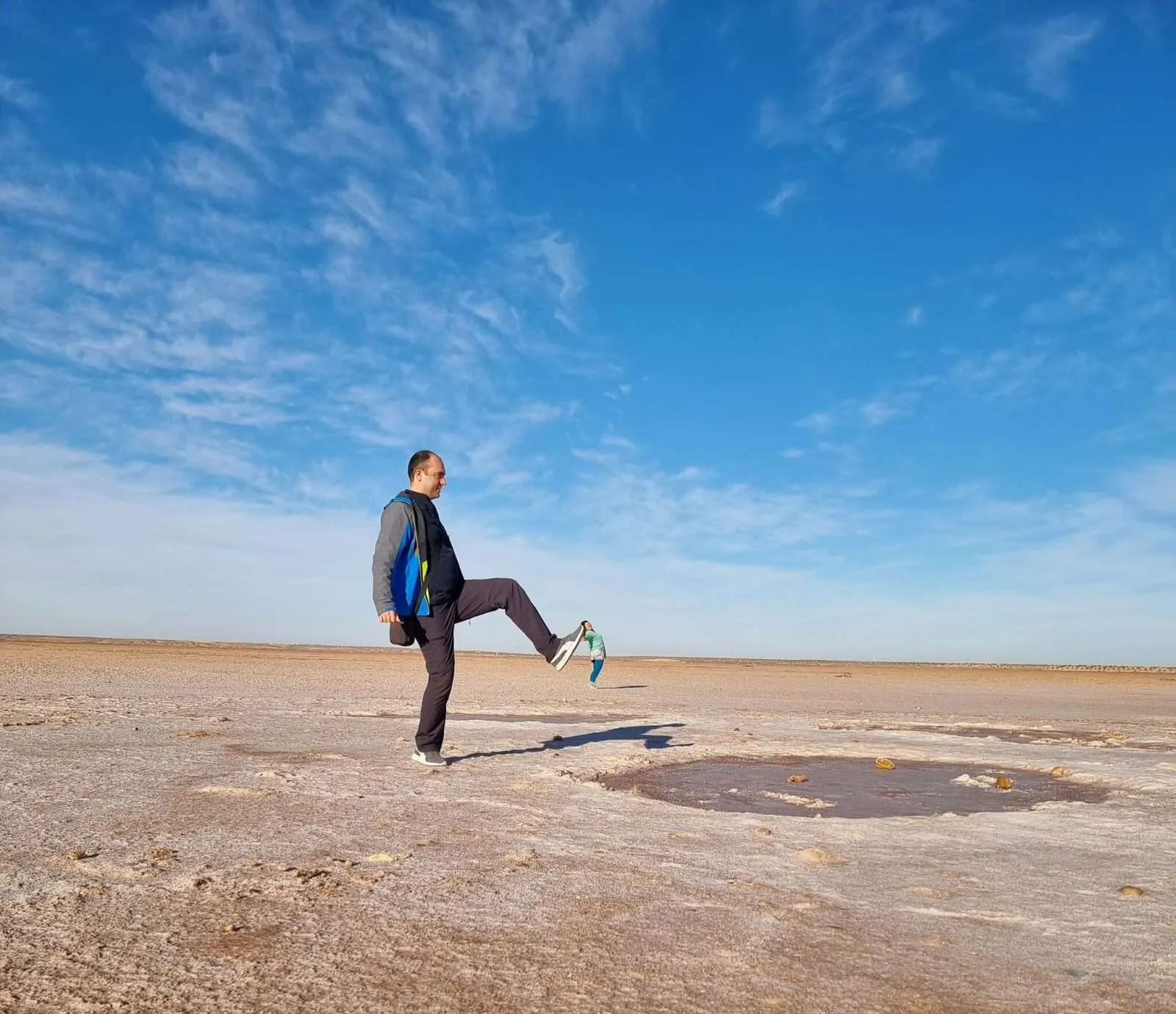
Do you like this post?
Travel with us and share our journey on Instagram ! Do you want to support us – learn how here !
Keep up with our latest travel adventures and projects! Subscribe for our Traveletter!
I have read and agree to the Privacy Policy
Similar Posts

The best of Egypt: Hurghada excursions and tours
After some detailed research resulting in having to book ultra-expensive flights to Egypt, we decided... Read More

Senegal – the ultimate road trip itinerary
So you have your trip to Senegal planned, and now you wonder what to put... Read More

Places to give you plenty of memories for pennies
One of the most-asked questions ever when it comes to traveling is “How much would... Read More

“The Magic of Traveling in Tanzania” book
Tanzania was a dream for us ever since we set foot in Africa for the... Read More

Let’s support iFamile Emu Children’s Center in Uganda!
Today we want you to meet Akol Benyamen Jayjay. Akol is the founder and the... Read More

Senegal – from the Atlantic ocean to Desert de Lompoul
Accuracy is not the greatest virtue of the Senegalese. Or at least these are our... Read More

Travel in Tunisia – 10 Best Tips for Independent Travellers
Independent travel in Tunisia is easier than most people would expect.
This country has a fantastic transport network to help you discover all of the highlights and more.
Hi, we’re Rach & Marty!
We’ve visited every country in the world and want to help you get the most out of your travels!
Whether you need an expertly planned itinerary , some experienced hints and tips , or just craving a delicious food adventure , we’ve got you covered!
We may earn affiliate commissions from websites we link to, at no cost to you. Click here for details.
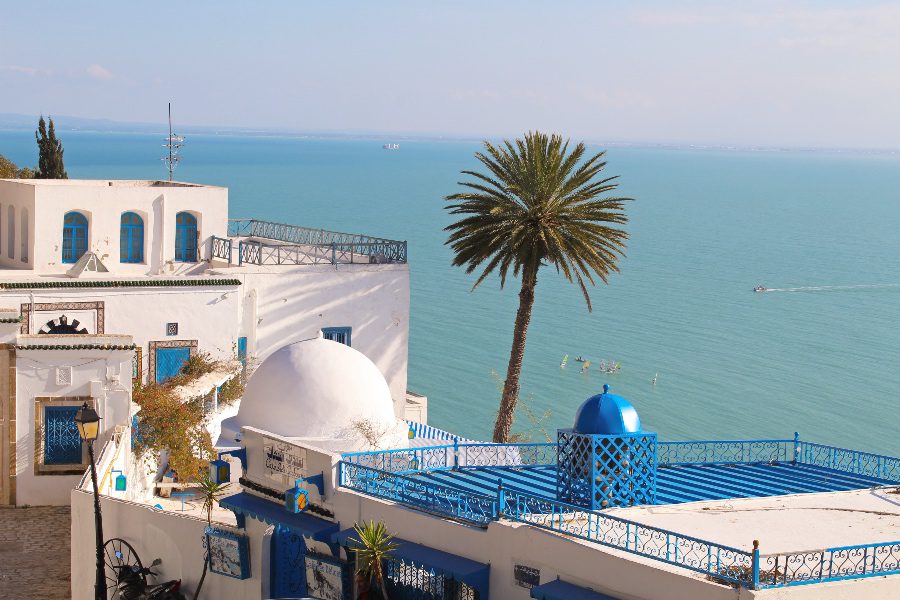
Many visitors, particularly Europeans, head to Tunisia as part of a week-long all-inclusive package deal.
The drawcard is the beaches along the Mediterranean coastline of Tunisia and the competitive prices for many chic resorts.
But if you’re interested in discovering Tunisia beyond just the resorts and tourist towns, you’re in for an exciting time.
For adventurous travellers looking for a destination to explore in more depth, I’d recommend Tunisia.
If you ask us, this North African nation is so underrated. We had an amazing few weeks of discovering this country and its diversity.
Read our best tips for travel in Tunisia below and our detailed 14-day itinerary for Tunisia , and you’re all set!
10 Best Tips for Independent Travel in Tunisia
We travelled to Tunisia in late November and early December 2021.
The prices quoted in this itinerary for Tunisia are in local currency, Tunisian Dinar (TND).
At the time, 1 USD = 2.9 TND
Table of Contents
1) Get a SIM Card on Arrival or Buy a digital eSIM
The wifi and internet are not very reliable in Tunisia so I’d recommend picking up a SIM Card for your phone with one of the providers at the airport.
There are several to choose from and they all offer similar data plans. I got an Orange SIM Card for free at the airport, then topped it up with 10GB for 20 TND (USD $7). You can also get 2GB for 10 TND.
Alternatively, an easier option would be to get an eSIM for Tunisia. This eSIM gives you 1GB data for 7 days . The price is $9.50; you can download it on your phone within minutes. Once you’ve arrived in Tunisia, you’re all set to go.
Note: Before buying an eSIM, you must ensure your phone is compatible. Check this on Airalo website before making any purchase.
Travel in Tunisia will be easier if you’re connected
It means you can access the BOLT app and order a ride, book your hotels on the go with Booking.com and find reviews on the best places to eat in Tunisia.
If you’re a food-lover like me, don’t miss my post on the 8 most popular street foods in Tunisia that you must try.
2) Download BOLT Ridesharing App
Download the BOLT App before you arrive, (or when you’re here). It will save you time and money.
If your French or Arabic language skills are non-existent, this app will help you get from A to B without hassle.
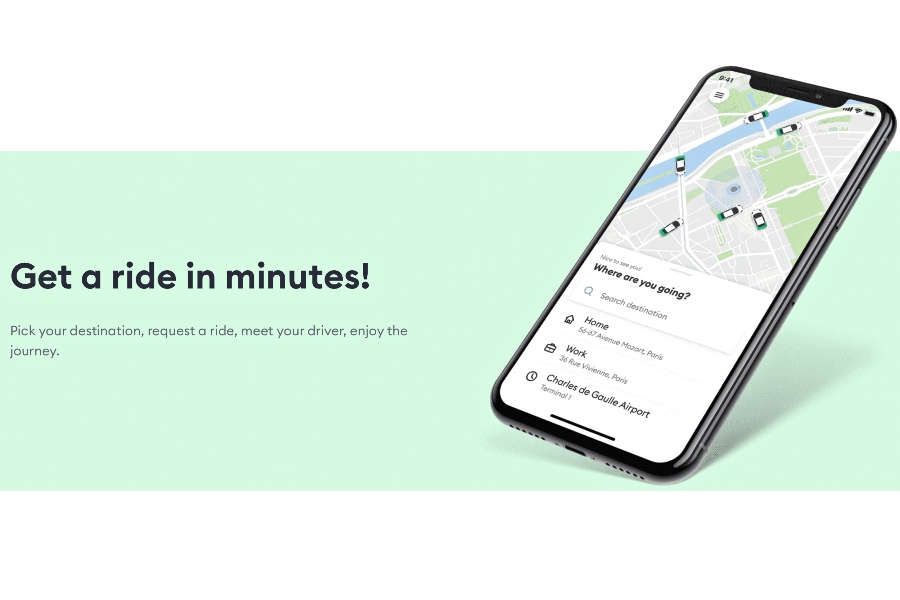
It’s a useful tool to learn what fares typically costs from A to B and it works similarly to Uber.
The main difference is that you must pay cash (Tunisian dinar) for your fare directly to the driver once your ride is complete.
3) Get a Bank Account that doesn’t charge International Transaction Fees
There is no good reason why you should still be paying International transaction fees or ATM withdrawal fees in 2022. Banks have come a long way over the years.
If you haven’t signed up for a bank account with ING Direct yet, then you’ll most likely be paying unnecessary bank fees when you travel to different countries.
During my trip to Tunisia (read our 14-day itinerary for Tunisia here ) I was charged 12 TND ($4.20) each time I withdrew local currency from an ATM.
But, because I have a bank account with ING Direct, every ATM bank fee was reimbursed to me. It’s fantastic! I’m also refunded for any foreign transaction fees charged while travelling abroad with this bank.
For more information about ING and why it’s the best debit card for travellers, read our post with more information .
Need an online account that lets you send money, get paid, and spend money internationally? A Wise account provides these services, and it will save you loads of cash in International fees.
Send your first International transfer for FREE when you sign up here for a Wise account.
4) Download Maps.me App and use louage for transport
One of the best tools to get around Tunisia is the Maps.me app. You can download offline maps of the country, so you never have to use mobile data to get around.
The map also shows hiking trails and walking paths, which Google Maps doesn’t have.
Although Tunisia has a great train network between cities and buses, it is much faster to use louage. Louage is the name for small vans that connect all cities and towns.
You go to the dedicated station in town, buy a ticket from the ticket office, and sit in the van that fits 8 people.
Once the van is full, it departs directly to the final destination. It is the fastest way to get from A to B in Tunisia whiteout using taxi or your own car.
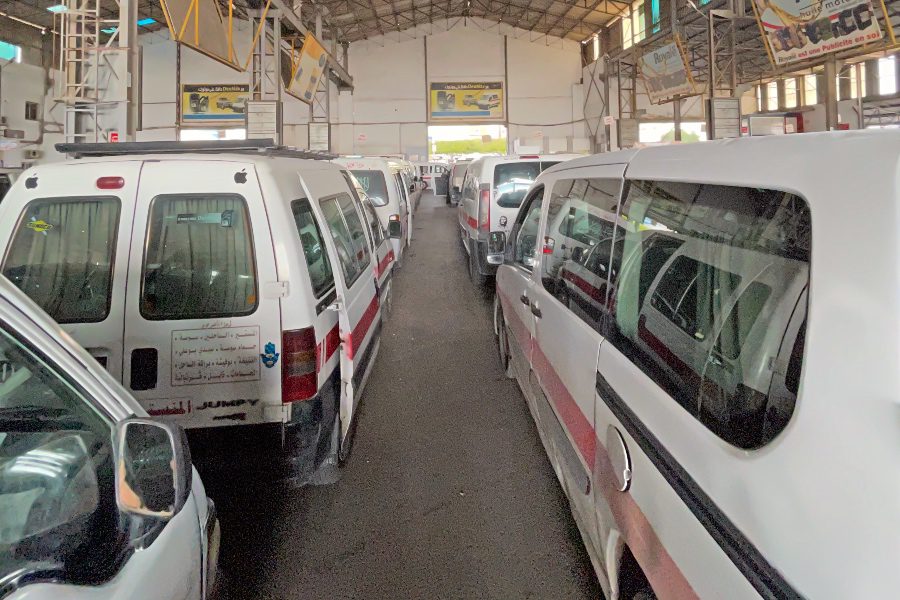
- 🔥 Hot Tip: Book accommodation in advance on Booking.com
- 🎟 Book your attractions and tickets online: We recommend Viator and GetYourGuide
- 🔋 Stay charged: This Belkin Power Bank is essential!
- 📸 Join a Group Tour: Find some amazing Group Tours here
- ✅ Get Connected with an eSIM: Fast, easy and affordable! View easy eSIM options here
5) Booking.com offers the best range of accommodation for travel in Tunisia
We love Booking.com . It’s one of the most used apps on our phones. This is our go-to for booking accommodation on our adventure to visit every country worldwide .
Time and time again, Booking.com offered us the best accommodation and prices as we travelled around Tunisia.
The best part is that the app is straightforward, and you pay in local currency or credit card once you arrive at your accommodation provider.
In many cases, the app gives you the option to reserve the hotel for your selected date, and if you need to change it or cancel, there are often no cancellation fees.
6) Drink Only Bottled Water or Bring a LifeStraw
Avoid drinking the tap water in Tunisia and stick to bottled water. Large bottles of water (1.5L) can be purchased from small shops and supermarkets for about $0.25.
Better yet, bring along a LifeStraw filtered water bottle. You will be helping the environment reduce plastic waste, and you can take it with you on your future travelling adventures.
7) Check Viator to book experiences in Tunisia
Tunisia has some amazing highlights and places to visit. There’s so much to see from visiting Star Wars film set locations, desert day trips in the south, or the epic amphitheatre in El Jem.
If you’re travelling solo or want to share the experience, consider checking out either Viator or GetYourGuide website.
Browse and book activities for travel in Tunisia and all over the world. We love that if plans change, you can cancel most bookings for free up to 24 hours before they start.
We’d highly recommend this cooking class in Tunis and this day trip to Kairouan and El Jem .
8) Download XE currency converter
This is a tip we’d recommend for travel in Tunisia and for every country you visit. We regularly use XE Currency Converter to convert currency and exchange rates when on the go.
I’d recommend downloading the app to your phone and adding the Tunisian Dinar (local currency) to your browser.
Whenever you need to withdraw currency at an ATM or change other foreign currencies in Tunisia, you can double-check you’re getting the right rate within seconds on XE.
I frequently use my XE app to calculate the prices of goods in supermarkets and at markets if I’m buying souvenirs or food.
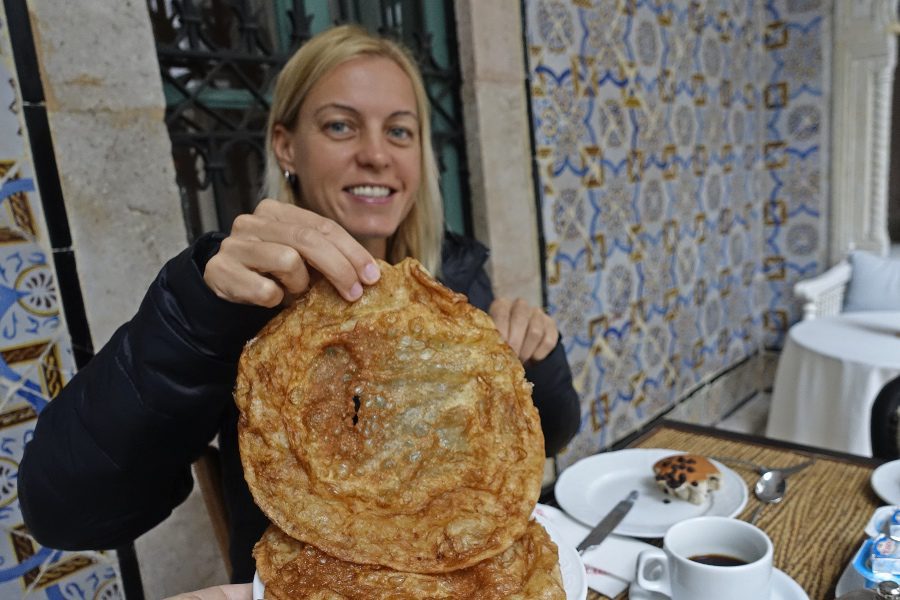
Street Food Tunisia – 8 Most Popular Eats
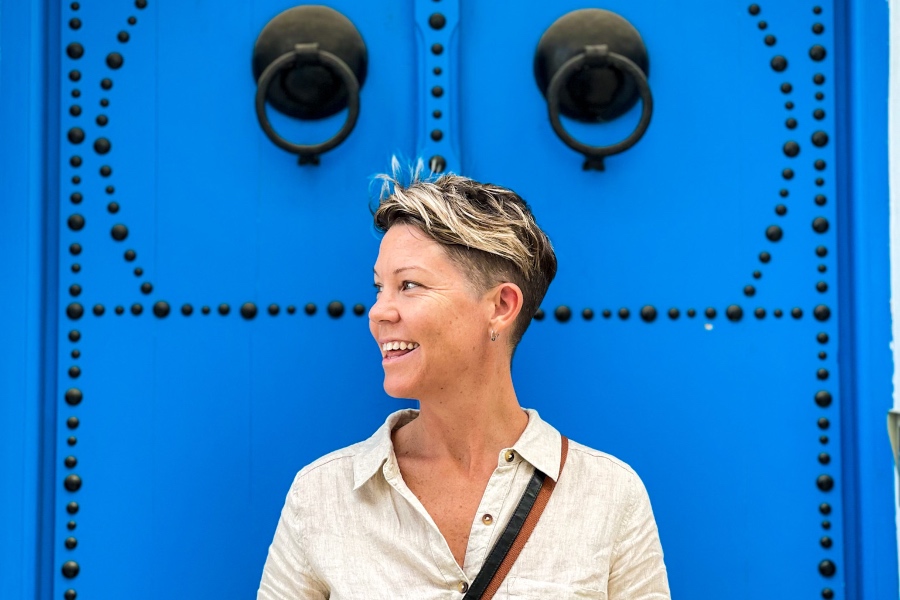
The Fascinating Medina in Tunis – 5 Unique Things To Do
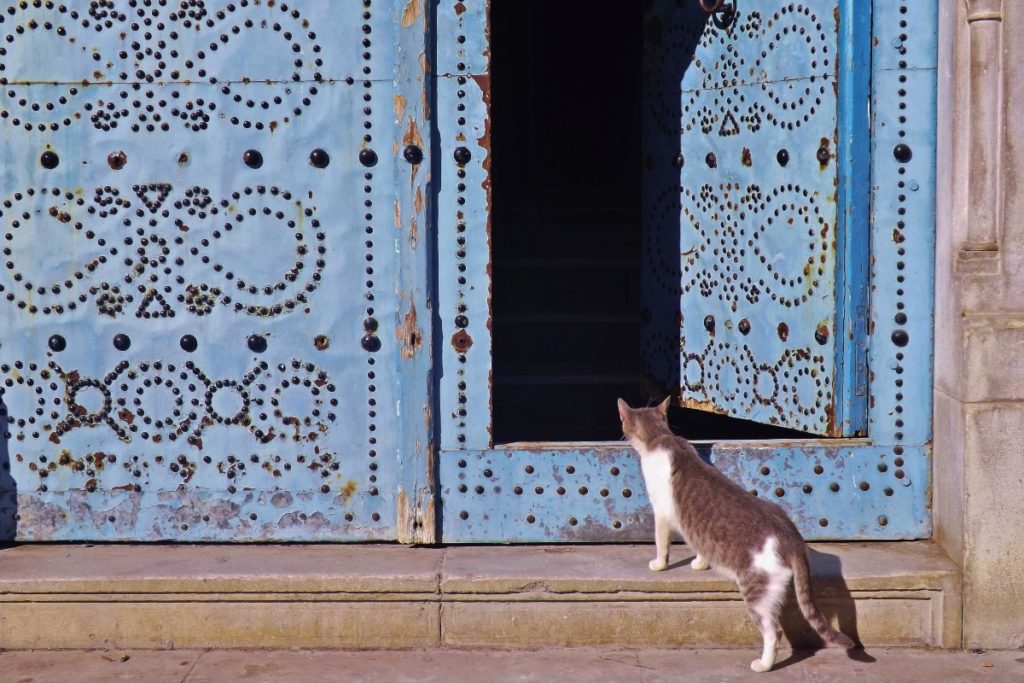
9) Exchange your Tunisian Dinars before your departure
As you explore and travel in Tunisia, remember to keep any foreign currency receipts or ATM currency withdrawal receipts with you.
Before departing Tunisia, ensure you convert all of your Tunisian dinars to Euros/USD (or another hard currency) before you depart. Tunisian Dinars are impossible to exchange once you’ve departed the country.
If you exchange currency at the airport before your departure, you may be asked for the receipt proving where you got the cash initially.
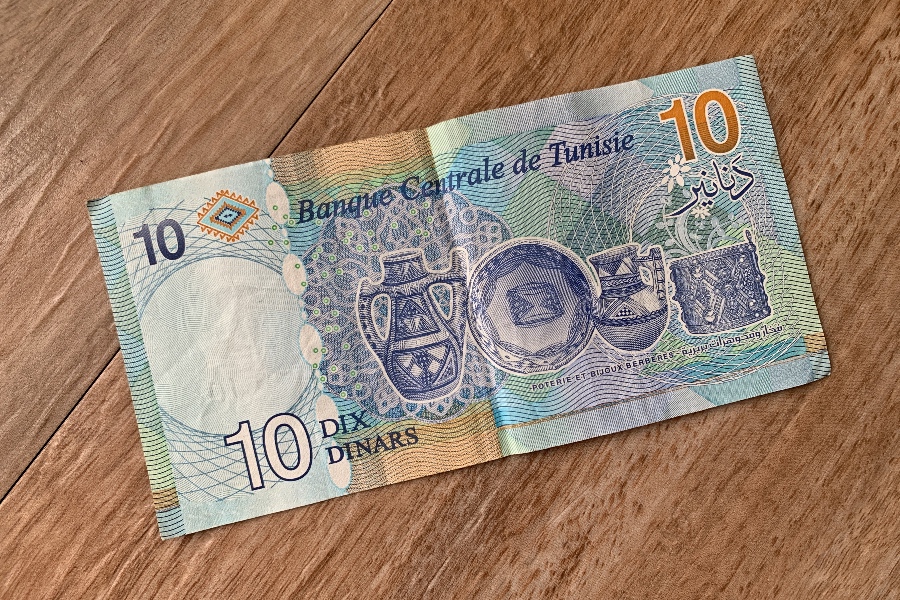
10) Travel Insurance
Make sure you get Travel Insurance before hitting the road. We recommend Heymondo & SafetyWing Travel Insurance.
Click here and get 5% off Heymondo from us!
Read more about the 2 Best Travel Insurance Companies
Where to Stay in Tunis
Most flights from around the world will likely arrive in Tunis, the capital city of Tunisia.
My final tip for independent travel in Tunisia is to reserve at least your first-night accommodation here to begin your trip. My recommendations for affordable, comfortable, and well-located hotels, for any budget are listed below.
Budget : Dar Ya – A great budget option in the heart of Medina. Rooms are clean and comfortable, yet only shared bathroom facilities are available. Breakfast is included in the price.
The staff is very welcoming and helpful in providing local knowledge to explore Tunis and the surrounding area. Check prices here.
Midrange : Dar Ben Gacem – A beautifully restored old Tunisian home, now a boutique hotel. The rooms are beautiful, and an amazing breakfast is included in the rate (the best omelette and coffee in Tunisia).
The young staff is always around to help with anything you need, even if it’s to prepare you a hot pot of tea or coffee after a long day of exploring. Check prices here.
Luxury: Treat yourself: Hôtel Belvédère Fourati – If you’ve got the budget that allows a swish stay in this hotel in Tunis, I recommend it. Check prices here.
Get Connected with eSIM

Get connected easily on your travels—buy an eSIM! An eSIM works like an app: buy it, download it, and get connected in minutes! It’s easy, affordable, and convenient. Keep your original phone number, too!
Click below and view which eSIM data plan you need for your next adventure. Use our referral code: RACHEL5045 , to get $3 off your first purchase !
Travel Tips for Tunisia
We recommend you read our post about the Perfect 14 Days Itinerary for Tunisia. This is the route we took, and it was ideal.
We’ve included prices and details of local transport, where to stay, and essential information to ensure smooth travels here.
Check out these 5 unique things to do in Medina, Tunis. And, our post explaining 8 of the best street eats in Tunisia cannot be missed!
Also, it’s worth checking out our ESSENTIAL Packing List for Africa . We used this exact packing list to travel to all 54 African nations.
If you’re interested to read about some of our crazy adventures, our 2019 recap of our travels in West Africa will give you an idea of how it was. And, if you’re considering travelling to West Africa yourself, read these 17 Important Things to Know Before Travelling to West Africa .
Our African Food Map – A Food Guide to 54 Countries is a great read, so be sure to check it out.
For more travel advice, tips, and useful websites we use to travel the world, head to our Travel Resources Page .
Subscribe to our newsletter!
Expert travel tips, resources and exclusive discounts worldwide
Travel Planning Resources
✈️ Flights : We use Skyscanner to book cheap flights worldwide.
🏨 Accommodation : Booking.com is our preferred platform for booking hotels and accommodation.
🏥 Travel Insurance : We recommend Heymondo ( Get 5% off Heymondo) & SafetyWing
🚌 Transportation : Trainline is the best website to reserve trains. We use Omio to book transport worldwide. For travel in Asia, we use 12Go.
🚘 Car Rental : We use DiscoverCars to book rental cars worldwide.
👫 Group Tours : G Adventures OR compare multi-day tours worldwide with Tourradar .
📸 Day Tours & Trips : GetYourGuide & Viator are the only two platforms you need.
📚 Lonely Planet: The Best Range of Travel Guides & Ebooks , and FREE Shipping! (use code RACHELDAVEY10 for a 10% discount)
🎒 Luggage : Osprey Farpoint 40L Backpack or Samsonite Luggage Range.
🛄 What to Pack: Don’t forget your Universal charger and a good power bank . To help you pack the essentials, here is our ULTIMATE Packing List for all Travellers .
🐶 Become a House Sitter: Join Trusted Housesitters and enjoy FREE accommodation worldwide. Use our invite to receive 25% off your new membership.
💰 Send Money Anywhere: WISE & Revolut are the best online accounts that let you send money, get paid, and spend money internationally. Both are so easy to use and way cheaper than any bank transfer.
📶 Stay Connected: Airalo eSIM allows you to get connected the moment you land at your destination, and you can avoid those expensive data roaming charges. We LOVE this product! Use promo code NOMAD15 for 15% off ALL eSIMs (new Airalo users only) OR use NOMAD10 for 10% off ALL eSIMs (for existing Airalo users)
✅ Check out our Travel Gear and Travel Resources for more valuable tips to save you money!
Tasty Food Adventures
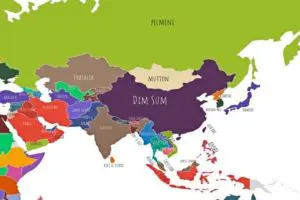
Food Map of Asia – The Best Food in Asia in 39 Countries
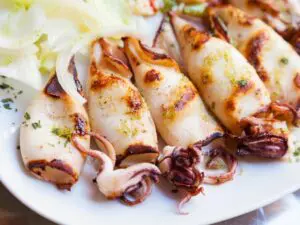
20 Most Popular Foods from Croatia
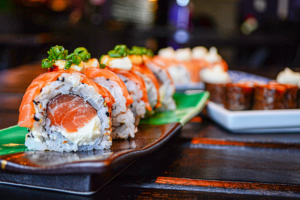
Top 20 Incredible Foods From Japan

Travelling for Food? 10 Best Countries for Food Lovers
See all Food Adventure blogs
Expert Travel Guides
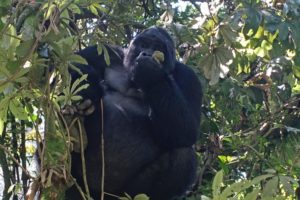
AMAZING Gorilla Trekking in Uganda – How To Book It
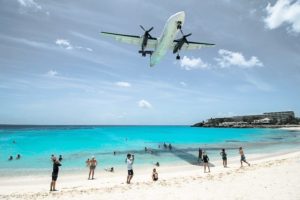
Which 2 Countries Share One Island?
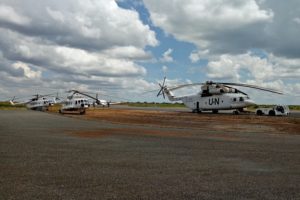
Is It Safe to Visit South Sudan?

Beaune in Burgundy – Best 5 Things To Do
See all our Travel Guides
Trusted Hints & Tips
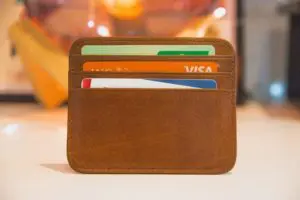
The Best Debit Card for Australian Travellers – Save Loads of Money
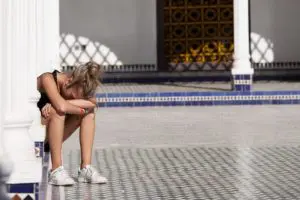
Bad Travel Days – The Downside Of Travel

15 Best Travel Books of All Time
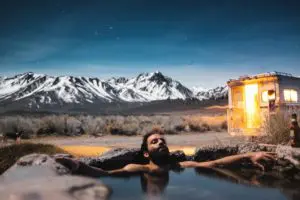
RV for Rent USA – UNBELIEVABLE 1 Dollar per day!
See all our expert Hints & Tips
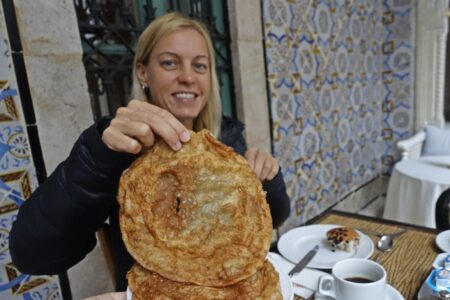
15 Most Popular Foods From Africa
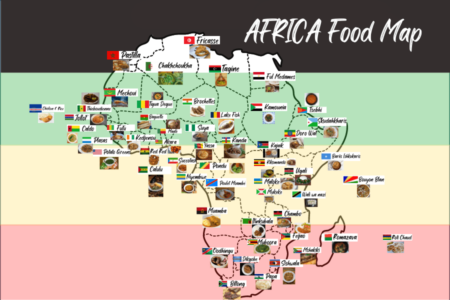
AFRICA Food Map – African Food Guide to 54 Countries
3 comments . leave new.
Very helpful and essential tips, especially in regards to the SIM Card… I mean you gotta have wifi , thanks for sharing
Thank you for all the great tips! I’m curious if you would recommend driving in Tunisia? Additionally, are credit cards accepted, or mainly cash is needed?
Yes, we recommend driving around Tunisia. We saw several groups of travellers doing so, most of them in 4WD vehicles. We used credit/debit cards to pay for accommodation and restaurants (we use and recommend WISE, read more here https://transferwise.com/invite/u/racheld364 ), but we always had local currency to pay for shared taxis/local transport, street food snacks and some entry fees to some cool attractions. Hope you have a great time, we really loved exploring this underrated country 🙂
Leave a Reply Cancel reply
Your email address will not be published. Required fields are marked *
Post Comment
Tunisia Guru
The Ultimate Guide to Traveling Tunisia and the World

Maxine Ben Taarit

Travel Tips for Tunisia: 10 Essential Tips for Your First Visit
Are you traveling to Tunisia for the first time? These essential Tunisia travel tips are sure to help your trip go smoothly.
Having plenty of friends, family, and even colleagues come and visit me in Tunisia, I have had plenty of experience in preparing them for their arrival. Tunisia is a destination not frequented by English speaking foreigners, and to be honest it is much better to visit Tunis on a tour, or with a local unless you are conversational in french.
One of the biggest question ” Is Tunisia safe to travel to? ” The answer is YES !
I am also covering some of the more drab things in this guide, such as how to navigate through the different forms of transportation, money tips, and even where to find your sim card. These tips will help your first trip to Tunisia be worry-free!
Table of Contents
Do I need a Visa for Visiting from the US or the UK?
If you are traveling with a UK or US passport you are able to visit Tunisia without a visa for up to three months.
Can I exchange money before arriving to Tunisia?
Tunisia’s currency is the Tunisian dinar. You are unable to exchange the dinar outside of Tunisia. You will need to exchange your cash when you arrive at an airport in Tunisia or with your hotel. Most places do not accept credit cards. Make sure you have enough cash at hand at all times.
Is there uber in Tunisia?
There is no uber in Tunisia. The best way to get around is to rent your own car. If you can not rent a car, a taxi is the best option.
What is the exchange rate in Tunisia?
You can find the current exchange rate here .
Is Tunisia safe?
Yes, Tunisia is a generally safe place. Like anywhere you travel always take precautionary measures (i.e. do not wander the streets alone at 3 am, watch your bags for pickpocketing).
What languages are spoken in Tunisia?
Tunisians generally speak Tunisian-Arabic as their first language, French as their second language, and English is their third language
How much, When and Who should I tip in Tunisia?
Tipping does not work the same way in Tunisia as the U.S. When you tip someone it is not based on a percentage of the final bill. These are some general guidelines. For a waiter at a nicer restaurant, you would tip between 5-10 dinars. A waiter at coffee shop 1-2 dinars. For a bellman or room service, you would tip between 1-5 dinars. For taxi drivers, I would tip between one to two dinars if they help me with any luggage.
Is there Airbnb in Tunisia?
Yes, there is Airbnb in Tunisia. You can find oceanfront apartments for 40-60 dollars a night. You can find out what areas to stay in here .
Where can I get a Sim card in Tunisia?
The two cell phone providers I recommend in Tunisia are Ooredoo and Orange. Sim cards are a pay as you go in Tunisia. I would recommend going for the 5GB for around 15 dinars if you are staying for a week. All their data options are valid for thirty days.

What should I wear while visiting Tunisia?
You can wear anything you really like. A rule of thumb is to dress more modestly so you can blend more easily with the crowd.

Leave a Reply Cancel reply
Your email address will not be published. Required fields are marked *
Save my name, email, and website in this browser for the next time I comment.
You May Also Like

Tunisia’s Best Beaches

Visiting Dougga Roman Ruins in Tunisia

A Guide to The Ruins of Carthage Tunisia
- Destinations
- Africa & Middle East
Update April 12, 2024
Information for u.s. citizens in the middle east.
- Travel Advisories |
- Contact Us |
- MyTravelGov |
Find U.S. Embassies & Consulates
Travel.state.gov, congressional liaison, special issuance agency, u.s. passports, international travel, intercountry adoption, international parental child abduction, records and authentications, popular links, travel advisories, mytravelgov, stay connected, legal resources, legal information, info for u.s. law enforcement, replace or certify documents.
Before You Go
Learn About Your Destination
While Abroad
Emergencies
Share this page:
Travel Advisory July 13, 2023
Tunisia - level 2: exercise increased caution.
Reissued with obsolete COVID-19 page links removed.
Exercise increased caution in Tunisia due to terrorism. Some areas have increased risk. Read the entire Travel Advisory.
Do not travel to:
- Within 30 km of southeastern Tunisia along the border with Libya due to terrorism.
- Mountainous areas in the country’s west, including the Chaambi Mountain National Park area, due to terrorism.
- The desert south of Remada due to the military zone.
- Jendouba south of Ain Drahem and west of RN15, El Kef, and Kasserine, next to the Algerian border due to terrorism.
- Sidi Bou Zid in central Tunisia due to terrorism.
Country Summary: Terrorist groups continue plotting possible attacks in Tunisia. Terrorists may attack with little or no warning, targeting tourist locations, transportation hubs, museums, resorts, hotels, festivals, nightclubs, restaurants, religious sites, markets/shopping malls, government facilities and security forces. A country-wide state of emergency, which grants security forces more authority to maintain civil order and enables the government to focus on combating terrorism, is in effect.
The U.S. government has limited ability to provide emergency services to U.S. citizens in some areas of Tunisia. U.S. government employees must obtain special authorization to travel outside greater Tunis.
Read the country information page for additional information on travel to Tunisia.
If you decide to travel to Tunisia:
- Exercise caution when using public transportation, due to safety and security concerns.
- Avoid demonstrations and crowds.
- Monitor local media for breaking events and be prepared to adjust your plans.
- Avoid staying overnight outside of the main cities and tourist locations.
- Obtain comprehensive medical insurance that includes medical evacuation.
- Enroll in the Smart Traveler Enrollment Program (STEP) to receive Alerts and make it easier to locate you in an emergency.
- Follow the Department of State on Facebook and Twitter .
- Follow the U.S. Embassy in Tunisia on Facebook and Twitter .
- Review the Country Security Report for Tunisia.
- Visit the CDC page for the latest Travel Health Information related to your travel.
- Prepare a contingency plan for emergency situations. Review the Traveler’s Checklist .
Border with Libya – Level 4: Do Not Travel
Developments in Libya continue to affect the security situation along the Tunisian-Libyan border in areas such as Ras Jedir and Dehiba along with the cities of Ben Guerdan and Medenine. The border with Libya is frequently closed to all traffic with short notice for extended periods. The Department of State advises U.S. citizens not to travel to Libya.
Visit our website for Travel to High-Risk Areas .
Western Mountains and Chaambi Mountain National Park – Level 4: Do Not Travel
Terrorist groups continue to operate in mountains of Western Tunisia.
The Desert South of Remada – Level 4: Do Not Travel
The desert south of Remada is designated as a military zone by the Government of Tunisia. Special authorization is required for travelers wishing to enter the military zone.
Jendouba El Kef and Kasserine near the Algerian Border – Level 4: Do Not Travel
Terrorist groups continue to operate in these areas.
Sidi Bou Zid in Central Tunisia – Level 4: Do Not Travel
Terrorist groups continue to operate in this area.
Embassy Messages
View Alerts and Messages Archive
Quick Facts
1 page per stamp
Not required for stays under 90 days
Import of Tunisian currency is prohibited. Visitors must declare cash brought into Tunisia in excess of TND 10,000 (or foreign currency equivalent). They must declare amounts above TND 5,000 if they wish to export that amount upon departure.
Export of Tunisian currency is prohibited. Up to TND 3,000 may be re-exchanged into foreign currency upon departure from Tunisia with the original exchange receipt. Visitors may only export up to TND 5,000 (or foreign currency equivalent) if that amount was declared upon arrival.
Embassies and Consulates
U.S. Embassy Tunis Les Berges du Lac 1053 Tunis, Tunisia Telephone: +(216) 71-107-000 Emergency after-hours telephone: +(216) 71-107-000, press 0 and ask for the duty officer Fax: +(216) 71964-360 Email: [email protected]
Destination Description
See the Department of State’s Fact Sheet on Tunisia for information on U.S.-Tunisia relations.
Entry, Exit and Visa Requirements
Please visit the Embassy's COVID-19 page for more information on COVID-19 in Tunisia.
Passports and Visas:
- A valid passport is required.
- For U.S. passport holders, a visa is not necessary for stays up to 90 days.
- A residence permit is needed for stays longer than 90 days. The residence permit can be obtained from the central police station of the district of residence.
- U.S. citizens born in the Middle East or with Arabic names have experienced delays in clearing immigration upon arrival.
- U.S. citizens of Tunisian origin and dual American-Tunisian citizens are expected to enter and exit Tunisia on their Tunisian passports. If a Tunisian-American succeeds in entering using a U.S. passport, he or she will still have to present a valid Tunisian passport to exit the country.
The U.S. Department of State is unaware of any HIV/AIDS entry restrictions for visitors to or foreign residents of Tunisia.
Find information on dual nationality , prevention of international child abduction and customs regulations on our websites.
Safety and Security
Terrorism: Terrorist groups and those inspired by such organizations are intent on attacking U.S. citizens abroad. Terrorists are increasingly using less sophisticated methods of attack – including knives, firearms, and vehicles – and most often target police and military forces in Tunisia. Terrorists may also target crowds and unprotected or vulnerable targets, such as:
- High-profile public events (sporting contests, political rallies, demonstrations, holiday events, celebratory gatherings, etc.)
- Hotels, clubs, and restaurants frequented by tourists
- Places of worship
- Shopping malls and markets
- Public transportation systems (including subways, buses, trains, and scheduled commercial flights)
The U.S. Department of State recommends that U.S. citizens in Tunisia maintain a high level of vigilance throughout the country. U.S. citizens living and working in Tunisia should understand that they accept the risks of remaining in the country and should carefully consider those risks. The threat of anti-Western terrorist activity persists, as does the risk of death or injury as a non-targeted bystander.
Specific Areas to Avoid: Embassy Tunis regulations require advance notification to Embassy security officials of travel by Embassy personnel outside greater Tunis. Certain cities and governorates in Tunisia have a fluid and unpredictable security environment, and these areas require additional scrutiny before U.S. government personnel may travel to them. U.S. citizens should avoid the following areas due to terrorist activity:
- Within 30 km of Libyan border in southeastern Tunisia.
- Mountainous areas in the west of the country, including the Chaambi Mountain National Park area.
- Jendouba south of Ain Drahem and west of RN15, El Kef, and Kasserine, next to the Algerian border.
- Gafsa and Sidi Bou Zid in central Tunisia.
The following groups, including ones on the U.S. government’s list of designated Foreign Terrorist Organizations, pose a high risk to U.S. citizens in the region:
- The Islamic State of Iraq and the Levant (ISIS)
- Al-Qa’ida in the Islamic Maghreb (AQIM)
- Ansar al-Sharia in Tunisia (AAS-T)
For more information, see our Terrorism page.
Crime:
- Travelers should remain vigilant of their surroundings and take care to secure their valuables. Prominently displayed cash or jewelry may attract unwanted attention.
- High-value items left unattended and visible have been stolen from vehicles, hotel rooms, and private residences.
- Criminals have targeted tourists and business travelers for theft, pick pocketing, and scams.
- Incidents of theft, robbery, and burglary have been reported in upscale neighborhoods during day and night. Violent crime is rare, however, an increase in incidents of harassment and assaults against women have been reported in Tunis among the expatriate community. Some of these criminal encounters occurred in dark or isolated areas surrounding commercial zones, public beaches, and parks.
- Any crimes against U.S. citizens should be reported immediately to the local police and the U.S. Embassy.
- Report suspicious activity to the local police.
Demonstrations: They may take place in response to political or economic issues, on politically significant holidays, and during international events. Demonstrations are most common on Saturday mornings and in the month of January.
- Demonstrations can be unpredictable. Avoid areas around protests and demonstrations.
- Past demonstrations have turned violent.
- Check local media for updates and traffic advisories.
International Financial Scams: Internet romance and financial scams are prevalent in Tunisia. Scams are often initiated through Internet postings/profiles or by unsolicited emails and letters. Financial scammers almost always pose as U.S. citizens who have no one else to turn to for help. Common scams include:
- Romance/Online dating
- Money transfers
- Lucrative sales
- Gold purchase
- Contracts with promises of large commissions
- Grandparent/Relative targeting
- Free Trip/Luggage
- Inheritance notices
- Work permits/job offers
- Bank overpayments
See the Department of State and the FBI pages for information.
Victims of Crime: Report crimes to the local police at 197 and contact the U.S. Embassy at +(216) 71-107-000. Remember that local authorities are responsible for investigating and prosecuting crime.
- Help you find appropriate medical care
- Assist you in reporting a crime to the police
- Contact relatives or friends with your written consent
- Provide general information regarding the victim’s role during the local investigation and following its conclusion
- Provide a list of local attorneys
- Provide our information on United States
- Provide an emergency loan for repatriation to the United States and/or limited medical support in cases of destitution
- Help you find accommodation and arrange flights home
- Replace a stolen or lost passport
See our webpage on help for U.S. victims of crime overseas .
Domestic Violence: U.S. citizen victims of domestic violence are encouraged to contact the Embassy for assistance.
Tourism: The tourism industry is generally regulated and rules with regards to best practices and safety inspections are regularly enforced. Hazardous areas/activities are identified with appropriate signage and professional staff is typically on hand in support of organized activities. In the event of an injury, appropriate medical treatment is widely available throughout Tunisia. Outside of a major metropolitan center, it may take more time for first responders and medical professionals to stabilize a patient and provide life-saving assistance. U.S. citizens are encouraged to purchase medical evacuation insurance.
The Tunisian National Guard encourages persons traveling into the desert to register their travel beforehand.
- No special authorization is required to travel to the desert as far south as Remada.
- The desert south of Remada is designated as a military zone by the Government of Tunisia. If travelers wish to enter the military zone, for example to travel to Borma, a special authorization is required. The Department of State advises U.S. citizens against travel to this area.
- Please visit the Embassy’s desert travel page .
See our webpage for more information on insurance providers for overseas coverage ( http://travel.state.gov/content/passports/en/go/health/insurance-providers.html ).
Local Laws & Special Circumstances
Criminal Penalties: You are subject to local laws. If you violate local laws, even unknowingly, you may be expelled, arrested, or imprisoned. Individuals establishing a business or practicing a profession that requires additional permits or licensing should seek information from the competent local authorities, prior to practicing or operating a business.
- Penalties for possessing, using, or trafficking in illegal drugs in Tunisia are severe, and convicted offenders can expect long jail sentences and heavy fines.
- You may be taken in for questioning if you don’t have your passport with you or if you take pictures of certain buildings.
- It is against Tunisian law to photograph police, military, and government buildings.
- Driving under the influence of alcohol could land you immediately in jail.
- If you break local laws in Tunisia, your U.S. passport won’t help you avoid arrest or prosecution.
Furthermore, some laws are also prosecutable in the United States, regardless of local law. For examples, see our website on crimes against minors abroad and the Department of Justice website.
Arrest Notification: If you are arrested or detained, ask police or prison officials to notify the U.S. Embassy immediately. See our webpage for further information.
Counterfeit and Pirated Goods: Although counterfeit and pirated goods are prevalent in many countries, they may still be illegal according to local laws. You may also pay fines or have to give them up if you bring them back to the United States. See the U.S. Department of Justice website for more information.
Faith-Based Travelers: See the following webpages for details:
- Faith-Based Travel Information
- International Religious Freedom Report – see Tunisia reports
- Human Rights Report – see Tunisia reports
- Hajj Fact Sheet for Travelers
- Best Practices for Volunteering Abroad
LGBTQI+ Travelers: Consensual same-sex sexual relations are criminalized in Tunisia. Penalties include sentences of up to three years in prison.
See our LGBTQI+ Travel Information page and section 6 of our Human Rights report for further details.
Travelers with Disabilities: The law in Tunisia prohibits discrimination against persons with disabilities, and the law is generally enforced. Social acceptance of persons with disabilities in public is as prevalent as in the United States. Expect accessibility to be limited in public transportation, lodging, communication/information, and general infrastructure.
Students: See our Students Abroad page and FBI travel tips .
Women Travelers: See our travel tips for Women Travelers .
For emergency services in Tunisia, dial 190.
Ambulance services are:
- not widely available and training and availability of emergency responders may be below U.S. standards.
- not present throughout Tunisia or are unreliable in most areas except Tunis, Sfax, Sousse, and Monastir.
- not equipped with state-of-the-art medical equipment.
- not always staffed with trained paramedics and often have little or no medical equipment.
We do not pay medical bills. Be aware that U.S. Medicare/Medicaid does not apply overseas. Most hospitals and doctors overseas do not accept U.S. health insurance.
Medical Insurance: Make sure your health insurance plan provides coverage overseas. Most care providers overseas only accept cash payments. See our webpage for more information on insurance providers for overseas coverage. Visit the U.S. Centers for Disease Control and Prevention for more information on type of insurance you should consider before you travel overseas.
We strongly recommend supplemental insurance to cover medical evacuation.
Always carry your prescription medication in original packaging, along with your doctor’s prescription. Check with the Tunisia Ministry of Public Health or the Central Pharmacy of Tunisia to ensure the medication is legal in Tunisia.
Vaccinations: Be up-to-date on all vaccinations recommended by the U.S. Centers for Disease Control and Prevention.
Further health information:
- World Health Organization
- U.S. Centers for Disease Control and Prevention (CDC)
Air Quality: Air pollution is a moderate problem in major cities in Tunisia. Consider the impact seasonal smog and heavy particulate pollution may have on you and consult your doctor before traveling if necessary.
Visit AirNow Department of State for information on air quality at U.S. Embassies and Consulates.
The U.S. Embassy maintains a list of doctors and hospitals . We do not endorse or recommend any specific medical provider or clinic.
Health facilities in general:
- Adequate but below U.S. standards health facilities are available in Tunis and other major cities.
- Public medical clinics lack basic resources, supplies, staffing, and hygiene.
- Hospitals and doctors often require payment “up front” prior to service or admission. Credit card payment is not always available. Most hospitals and medical professionals require cash payment.
- Private hospitals usually require advance payment before admitting a patient.
- Travelers should make efforts to obtain complete information on billing, pricing, and proposed medical procedures before agreeing to any medical care.
- Be aware that travelers will not receive a medical report after service unless specifically requested.
- Be aware that some hotels, resorts, etc. have exclusive agreements with medical providers, which may limit your choices in seeking emergency medical attention.
- Medical staff may speak little or no English.
- Generally, in public hospitals only minimal staff is available overnight in non-emergency wards. Consider hiring a private nurse or having family spend the night with the patient, especially a minor child.
- Patients bear all costs for transfer to or between hospitals.
- Psychological and psychiatric services are very limited, even in the larger cities, with hospital-based care only available through government institutions.
Medical Tourism and Elective Surgery
- U.S. citizens have suffered serious complications or died during or after having cosmetic or other elective surgery.
- Medical tourism is a rapidly growing industry. People seeking health care overseas should understand that medical systems operate differently from those in the United States and are not subject to the same rules and regulations. Anyone interested in traveling for medical purposes should consult with their local physician before traveling and visit the U.S. Centers for Disease Control and Prevention website for more information on Medical Tourism.
- Visit the U.S. Centers for Disease Control and Prevention website for information on Medical Tourism, the risks of medical tourism, and what you can do to prepare before traveling to Tunisia.
- We strongly recommend supplemental insurance to cover medical evacuation in the event of unforeseen medical complications.
- Your legal options in case of malpractice are very limited in Tunisia.
- Although Tunisia has many elective/cosmetic surgery facilities that are on par with those found in the United States, the quality of care varies widely. If you plan to undergo surgery in Tunisia, make sure that emergency medical facilities are available, and professionals are accredited and qualified.
Pharmaceuticals
- Tunisia has severe shortages of medications, and not all medications available in the United States are available in Tunisia. Plan in advance before traveling.
- Exercise caution when purchasing medication overseas. Pharmaceuticals, both over the counter and requiring prescription in the United States, are often readily available for purchase with little controls. Counterfeit medication is common and may prove to be ineffective, the wrong strength, or contain dangerous ingredients. Medication should be purchased in consultation with a medical professional and from reputable establishments.
- U.S. Customs and Border Protection and the Food and Drug Administration are responsible for rules governing the transport of medication back to the United States. Medication purchased abroad must meet their requirements to be legally brought back into the United States. Medication should be for personal use and must be approved for usage in the United States. Please visit the U.S. Customs and Border Protection and the Food and Drug Administration websites for more information.
- Check with the Tunisia Ministry of Public Health or the Central Pharmacy of Tunisia to find available medications and restrictions on importing medication.
Non-Traditional Medicine
U.S. citizens have suffered serious complications or died while seeking medical care from non-traditional “healers” and practitioners in Tunisia. Ensure you have access to licensed emergency medical facilities in such cases.
Water Quality
In many areas, tap water is not potable. Bottled water and beverages are generally safe, although you should be aware that many restaurants and hotels serve tap water unless bottled water is specifically requested. Be aware that ice for drinks may be made using tap water.
Adventure Travel
Visit the U.S. Centers for Disease Control and Prevention website for more information about Adventure Travel .
Travel and Transportation
Road Conditions and Safety:
- Driving in Tunisia can be dangerous. Visitors should avoid driving after dark outside Tunis or major resort areas or on country roads.
- Drivers often fail to obey the rules of the road, even in the presence of police. Traffic signs and signals are often ignored, and drivers sometimes drive vehicles on the wrong side of the road or the wrong direction on a one-way street. Defensive driving is a must in Tunisia.
- Faster drivers tend to drive on the left while slower drivers stay to the right. Traffic lane markings are widely ignored. Cars that wish to pass often signal with their headlights.
- Drivers may be stopped for inspection by police officers within cities and on highways at any time, and drivers should comply.
- Bicycles, mopeds, and motorcycles are operated without sufficient lights or reflectors, making them difficult to see darting in and out of traffic. Motorists should also be aware of animals on the roads, particularly in rural areas.
Traffic Laws: Drivers should be aware that if they are involved in a motor vehicle accident that results in death or serious injury of another person, the police may take them into protective custody until they are absolved of responsibility. This can mean spending up to several months in detention. As with any arrest or detention, U.S. citizens taken into custody should immediately request that the police inform the Embassy of their whereabouts.
Public Transportation: Exercise caution when using public transportation, due to safety and security concerns. Trains, buses, and taxi minibuses (known as louages) may be overcrowded, have unsafe driving practices, poor maintenance, and increased likelihood of criminal activity.
See our Road Safety page for more information.
Aviation Safety Oversight: As there is no direct commercial air service to the United States by carriers registered in Tunisia, the U.S. Federal Aviation Administration (FAA) has not assessed the government of Tunisia’s Civil Aviation Authority for compliance with International Civil Aviation Organization (ICAO) aviation safety standards. Further information may be found on the FAA’s safety assessment page .
Maritime Travel: Mariners planning travel to Tunisia should also check for U.S. maritime advisories and alerts . Information may also be posted to the U.S. Coast Guard homeport website , and the NGA broadcast warnings .
For additional travel information
- Enroll in the Smart Traveler Enrollment Program (STEP) to receive security messages and make it easier to locate you in an emergency.
- Call us in Washington, D.C. at 1-888-407-4747 (toll-free in the United States and Canada) or 1-202-501-4444 (from all other countries) from 8:00 a.m. to 8:00 p.m., Eastern Standard Time, Monday through Friday (except U.S. federal holidays).
- See the State Department’s travel website for the Worldwide Caution and Travel Advisories .
- Follow us on Twitter and Facebook .
- See traveling safely abroad for useful travel tips.
Review information about International Parental Child Abduction in Tunisia . For additional IPCA-related information, please see the International Child Abduction Prevention and Return Act ( ICAPRA ) report.
Travel Advisory Levels
Assistance for u.s. citizens, tunisia map, learn about your destination, enroll in step.

Subscribe to get up-to-date safety and security information and help us reach you in an emergency abroad.
Recommended Web Browsers: Microsoft Edge or Google Chrome.
Make two copies of all of your travel documents in case of emergency, and leave one with a trusted friend or relative.
Afghanistan
Antigua and Barbuda
Bonaire, Sint Eustatius, and Saba
Bosnia and Herzegovina
British Virgin Islands
Burkina Faso
Burma (Myanmar)
Cayman Islands
Central African Republic
Cote d Ivoire
Curaçao
Czech Republic
Democratic Republic of the Congo
Dominican Republic
El Salvador
Equatorial Guinea
Eswatini (Swaziland)
Falkland Islands
France (includes Monaco)
French Guiana
French Polynesia
French West Indies
Guadeloupe, Martinique, Saint Martin, and Saint Barthélemy (French West Indies)
Guinea-Bissau
Isle of Man
Israel, The West Bank and Gaza
Liechtenstein
Marshall Islands
Netherlands
New Caledonia
New Zealand
North Korea (Democratic People's Republic of Korea)
Papua New Guinea
Philippines
Republic of North Macedonia
Republic of the Congo
Saint Kitts and Nevis
Saint Lucia
Saint Vincent and the Grenadines
Sao Tome and Principe
Saudi Arabia
Sierra Leone
Sint Maarten
Solomon Islands
South Africa
South Korea
South Sudan
Switzerland
The Bahamas
Timor-Leste
Trinidad and Tobago
Turkmenistan
Turks and Caicos Islands
United Arab Emirates
United Kingdom
Vatican City (Holy See)
External Link
You are about to leave travel.state.gov for an external website that is not maintained by the U.S. Department of State.
Links to external websites are provided as a convenience and should not be construed as an endorsement by the U.S. Department of State of the views or products contained therein. If you wish to remain on travel.state.gov, click the "cancel" message.
You are about to visit:

Home » Travel Guides » Tunisia » 15 Best Places to Visit in Tunisia
15 Best Places to Visit in Tunisia
Trodden by the Berbers of old and raided by Barbary pirates, settled by the Phoenician Greeks, and then home to the mighty city of Carthage, Tunisia has a grand place in the annals of both the North African and European story. (After all, it was host to the only major rival to Rome across the entire Mediterranean basin for those formative centuries between the 800s BC and year zero.)
Add to that the mythical figures of Aeneas and Dido, along with tales of Arabic sultans and even Norman seafarers from the north, and it’s easy to see why this cut-out on the Maghreb is such a fascinating, culturally-rich place. Unfortunately, the great power struggles played out here have continued on into the modern age, giving rise to revolutions and counter-revolutions. Today, the government vies for control with hardline Islamists, there have been attacks on tourists, and FCO advice flits between cautious and uber-cautious. But when the dust settles and Tunisia stabilizes, it’s sure to take the breath away!
Lets explore the best places to visit in Tunisia :

It doesn’t get much better than this for fans of the ancients.
Colossal arches and elliptical amphitheaters to rival even the Colosseum in Rome are what mark the horizon of famous El Djem.
Tagged by UNESCO, the city is a modern one built right atop an old one, with the occasional ruin of Roman homes and arcades popping up on the corners.
Many sights have been preserved thanks to the billowing dust storms of the surrounding Sahara, but a lack of large-scale archaeology means that the main attraction remains the huge Amphitheatre of Thysdrus.
Delve in and stroll the changing rooms of gladiators, or stand where ancient governors once did atop the fighting pits.
2. Houmt Souk

The undisputed jewel of Djerba island comes topped with the adobe domes of the Bordj el Kabir fort, which was raised in the 1400s and 1500s to protect the harbor on the Gulf of Gabes below.
Over the centuries, everyone from the Numidians to the Arabs to the Spaniards to the Ottomans have made their home in this tactical position on the edge of the Med.
Accordingly, history oozes from every dust-caked pore.
There are the traditional fondouks quarters of medieval merchants left in the Old Town.
There colorful pottery bazaars, whitewashed synagogues, Turkic mosques, and lively marketplaces selling olive oils and chickpea broths.

Still reeling from the horrific terror attacks of 2015, the seaside city of Sousse is now much less loud about its beauties.
But the beauties are there nonetheless.
They lurk between the tight-knit alleyways of the town’s historic medina; they ooze from the simple and elegant rises of the Aghlabite Great Mosque; they beckon from the formidable bulwarks of the old Ribat citadel above the place.
And away from the steaming Ottoman hammams and colorful Maghreb souks of the town proper, there are gorgeous beaches that sparkle turquoise blue, all fringed with luxurious hotels and palm-lined promenades.
4. Sidi Bou Said

You could be forgiven for thinking that you’d made the hop across the Med to the islands of the Greek Aegean as you enter the vibrant interior of Sidi Bou Said town, sat just 20 kilometers from bustling Tunis.
Yep, the sky-blue and whitewashed color scheme here is more than reminiscent of towns in Santorini and Mykonos.
However, this one’s interesting hues were actually started by the French musicologist Rodolphe d’Erlanger.
He first plastered the stucco walls of his home with the endearing tones in the 20s, and his palatial mansion at the Ennejma Ezzahra is a now a museum to his legacy.

Every trip to Tunisia should include a jaunt to the great desert of the Sahara, whose shifting sands and dry escarpments begin here in earnest.
And where better for a taste of the dry life than the adobe mud town of Tozeur? This oases settlement in the extreme south-west of the nation is a veritable masterpiece of Berber tradition.
For starters, it’s surrounded by swathes of verdant date palm blooms that rise straight from the ochre-hued earth.
And then there’s its medina city, with filigrees and carvings and brick artistry straight from the old arabesque world.

Pass under the great arches of the Bab el Bhar (the Port de France) and you’ll see both sides to this fascinating capital: the French side and the Maghreb side.
In the former, the so-called Ville Nouvelle, the traces of rule from Paris are all too evident.
There are wide, tree-peppered avenues.
There are coffee shops spilling onto the sidewalks.
There are grand cathedrals with Gothic elements.
And on the latter side of town; the African side, things take a turn for the arabesque.
Lively souks packed with kaleidoscopic fabrics crawl and sprawl over one another.
The shouts of hawkers touting spice echo, and the scents of tagines and mint teas mix with camel skin lamps and shisha pipes.
7. Kairouan

Nearly 1,500 years of history meets between the dust-caked desert hills around Kairouan.
A city famed for its long connection to the Islamic world, it’s been a center of Sunni teachings since at least the 7th century.
Cue the mighty rises of the Great Mosque of Kairouan: a UNESCO World Heritage Site that draws thousands of pilgrims to its prayer rooms and enclosures each year.
Once you’ve wondered at that amazing Aghlabid relic, be sure to wander the old medina and its whitewashed cottages, taste sweet Tunisian pastries in the bakeries there, and seek out the interesting Mosque of the Three Gates.
8. Monastir

Most people will know Monastir for the great citadel fortress that bears its moniker.
And it’s true that the Monastir Ribat, topped with its crenulated parapets and red stone bulwarks, is unquestionably the major attraction in town.
(After all, it was one of the filming locations in the hit film Monty Python’s The Life of Brian). However, there are other things to see and do here, like trace the Muslim influence at sites like the Mausoleum of Bourguiba, or wonder up at the colossal city mosque (dating from the 1000s no less!).

UNESCO World Heritage fame marks the crumbling peristyles and age-cracked temples of Dougga out from many of North Africa’s other mighty ancient sites.
Once Roman, the remains of the entire city here are considered some of the best-preserved in the region.
Travelers come to gawp at the looming Doric columns of the Dougga Theatre, standing tall over the green fields of the Beja Governorate.
They come to walk the old cobbled Roman roads, or to see the relics of shrines to Jupiter and the Imperial Cult.
There are also bathhouses, soaring mausoleums, and in-tact sewer systems to encounter.
10. Carthage

The very name of Carthage evokes romantic tales of Greek seafarers, figures like Aeneas and Dido from the heroic age, and stories of mighty battles on the Alps and Mediterranean Seas.
That all makes it easy to see why this sprawling ruined site just outside of Tunis is one of the most-visited attractions in all of Tunisia.
However, the centuries of Punic wars and Muslim invasions have left it abandoned more than once, and the remains of Carthage are not as awe-inspiring as some of the country’s other Roman treats.
It’s worth coming though, if only to stand where great generals in the ilk of Hannibal once did!

It’s hard not to be taken by the elegance of Sfax.
Old and eclectic, it bears all the hallmarks you’d expect of a city trodden by Sicilian kings and Spanish invaders, Barbary pirates and Ottoman imperialists.
Moorish traits pockmark the old Kasbah, mingling with Rococo and colonial elements, while the great city walls look like something plucked straight out of Aladdin.
Meanwhile, the gorgeous Place de la Republique is trotted by horses and carts, and the Sfax War Cemetery is a sobering reminder of the great struggles that occurred in North Africa between Allied and Axis forces during the 20th century.

It’s just a stone’s throw from Douz to the sweeping sand plains of the Jebil National Park – one of the great natural treasures of southern Tunisia.
So, it’s not for nothing that this far-flung town in the south is considered the gateway to the Sahara.
It’s home to purring camels, and weathered Berber tour guides who are eager to lead expeditions on humpback into the scorched wilds.
It’s worth getting in the saddle and following them, because wonders like the salt flats of Chott al-Jerid and the shifting Grand Erg await there!
13. Hammamet

Hammamet sits on the southern bends of the Cap Bon, enjoying the lapping waves and soothing salt-packed breezes of the Mediterranean Sea.
The town magnetizes visitors with its enchanting appearance, which comes as a curious mélange of Spanish, Sicilian and Castilian architecture, all balanced out by the ubiquitous Maghreb medina town of whitewashed adobe homes and palm-sprouting streets.
However, it’s the beaches here that really take the biscuit.
Head down to sun-kissed Hammamet Sud, where loungers meet jet skis meet sunbathers meet SCUBA outfitters.

Palm-peppered Zarzis (also spelled Jarjis) is a place that proudly touts its fringing of shimmering beaches and resorts.
Lined up all along the Mediterranean to the north and south of town, they are amongst the most popular of destinations for package holidayers in search of Tunisia’s medley of sun, sand, sea, and unrelenting desert heat.
The town itself is a modern, built-up place that hides the centuries of Roman and Arabic history beneath.
You’ll see grand mosques looming above the street corners, the occasional olive oil seller, and whitewashed villas shrouded by oases.
15. Matmata

Matmata entered the field of public attention when it became the home of a certain Luke Skywalker in the stories of Star Wars way back in 1976. In fact, the spot is one of many in a long line of filming locations found throughout Tunisia, but might just be the most famous.
The backdrop for the iconic lands of Tatooine were the interesting troglodyte houses of the locals here, which are carved straight into the dusty earth and painted white to reflect the sun.
You can still see them, along with other cool examples of cave dwellings in the dusty surrounds of Gabes.
15 Best Places to Visit in Tunisia:
- Sidi Bou Said
- Eastern Africa
- Northern Africa
- Southern Africa
- Western Africa

Tunisia Travel Tips: Everything to Know Before Your First Visit
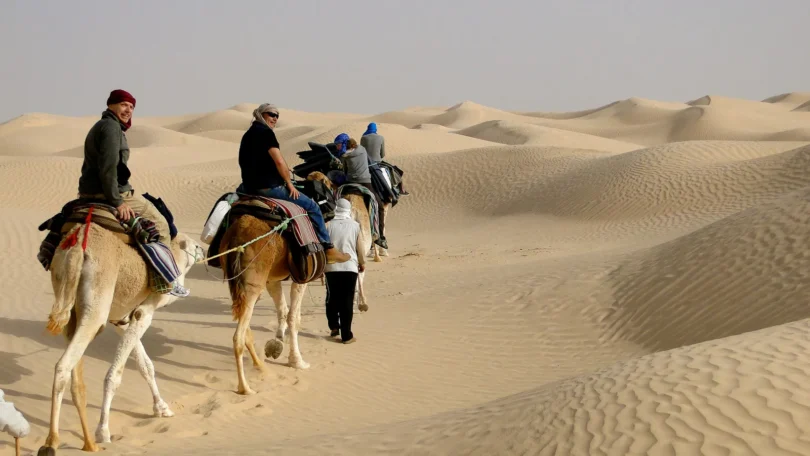
Are you planning to visit Tunisia for the first time? Well, you just came to the right place as we have essential Tunisia travel tips to guide you. From when to go, through to how things operate and how long your trip should last, we will be answering all your questions to ensure your first trip to Tunisia is worry-free.
While Egypt and Morocco are the popular destinations for tourists in Northern Africa, Tunisia remains wonderfully undiscovered. Ancient cities, historical sites, incredible beaches, beautiful Coastal towns and, of course, the Sahara, Tunisia has plenty to offer foreign tourists. As you prepare to explore all the fantastic destinations above and many more, here are Tunisia travel tips that once you know, your stay will be memorable.
Table of Contents
1. When to Go to Tunisia
Like other countries in north Africa, May, June, September and October are the ideal months to visit Tunisia. During those months, you will be able to enjoy the beach and sightseeing while avoiding the scorching temperatures of the summer.
If you want to avoid crowds and get better offers, then visit during the winter months. However, it can be very wet and cold such that your exploration won’t be fun as you wanted it yo be.
2. What to Wear
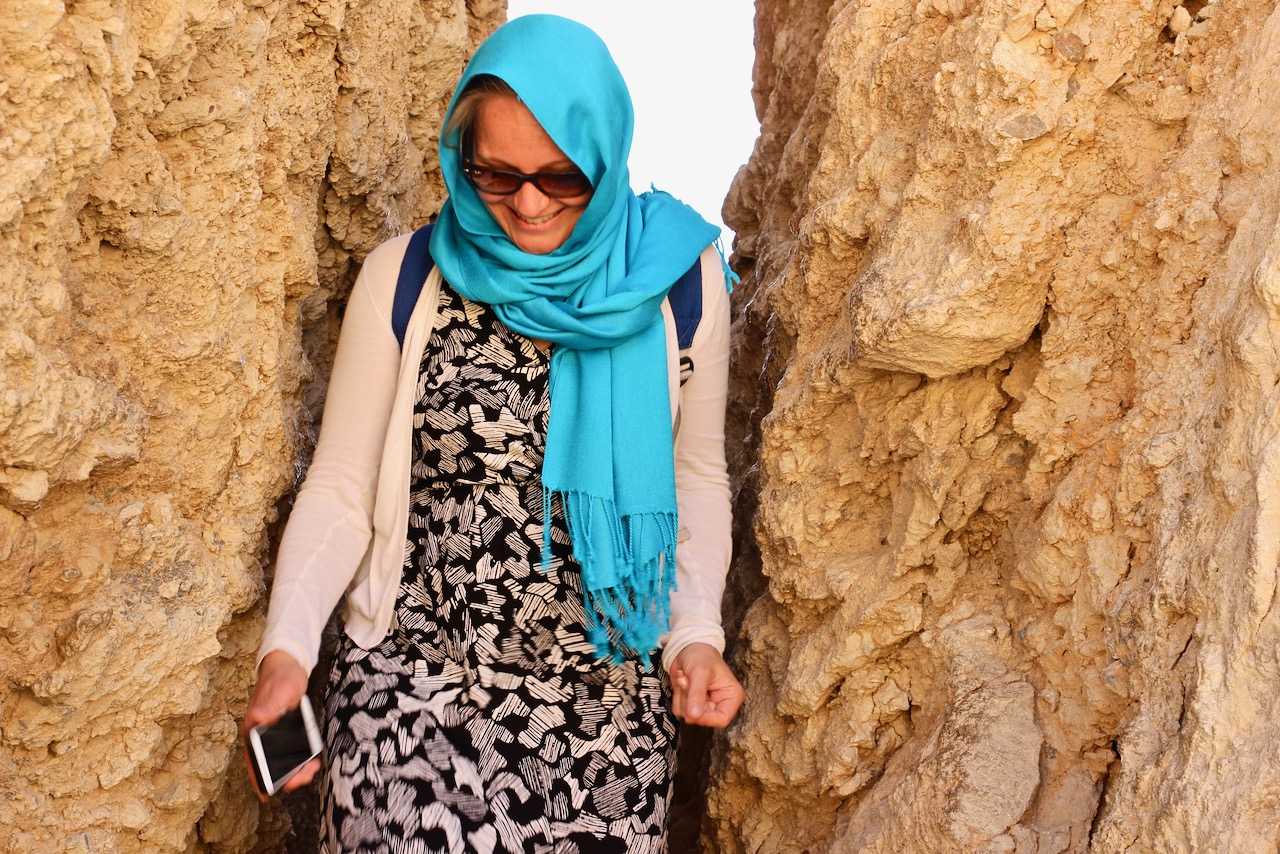
A lady traveller appropriately dressed in Tunisia. Photo/ Engaging Cultures.
Tunisia is one of the countries where you have the freedom to wear what you want. However, ensure you dress modestly to avoid unwanted attention and feel confident when interacting with locals.
If you are walking around in tourist areas along the beach, you can likely wear what you want without problems. You’ll however need swimwear, sunhat, sunscreen and a sarong. For other parts of the country, including the desert, we recommend you carry a wind and water proof thin jacket, denim jacket, warm jumpers and some longer trousers because the nights get cooler.
3. Make Sure You Have Enough Cash
When visiting Tunisia , ensure you have enough cash at hand all times because most places do not accept credit cards. You will need to exchange your cash when you arrive at the airport or when in your hotel. Tunisia’s currency is the Tunisian dinar and you’re unable to exchange the dinar outside the country.
4. Rent Your Own Car
One of the essential Tunisia travel tips is ensuring you rent a car during your visit, especially if you want to explore the north and east regions. But if you can’t rent a car, a taxi is the best option since there is no uber in this north African country.
Most locals use buses or shared minivans to move around, but we don’t recommend them to tourists because public transport can be patchy sometimes. Trains are also used as a mode of transport but they are slow.
5. Spend More Than a Week in Tunisia
Well, you can’t talk about Tunisia travel tips and not mention the duration one should spend during their visit. As hinted above, Tunisia has a lot of tourist attractions. Thence, we recommend you spend a minimum of seven days in this north African country to explore a couple of destinations. But if you want to have the best experience and travel more widely, one month could do.

We recommend you spend at least one week in Tunisia. Photo/ Thrillist.
Why Do People Visit Tunisia?
The answer to this question is simple – tourists visit Tunisia because of the numerous attractions the country offers. As some people may be aware, Tunisia is filled with historical sites, fantastic beaches, stretches of the Sahara and UNESCO-listed destinations. Below are some of the places tourists visit in Tunisia:
- Carthage ruins
- El-Djem amphitheater
- Kairouan’s Grand Mosque
- Star Wars Village
Is It Currently Safe to Visit Tunisia?
One of the most common questions tourists ask is “Is it safe to visit Tunisia?” Yes, Tunisia is a generally safe place to visit all year round. However, it is advisable to always stay alert and be informed about local happenings. Instability in Libya and Algeria have made Tunisia less safe due to kidnapping being at a high risk near the borders. So, ensure you visit areas far from the borders and where security is tight.
Nevertheless, this north African country always provide tourists with reason to visit year all round, thanks to fascinating historical sites, a rich cultural history and beach holidays that are consistently among the most affordable around.
You may also like

Meet Richard Evans, Billionaire Behind Five-Star...
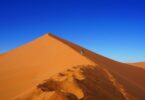
Big Daddy Namibia and Why Some Tourists do the...

35 Liverpool Coaches Are in Nairobi for Coaching...
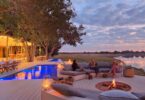
5 Most Romantic Places in Zambia for Couples to...

Highlights of Former NBA Star Joakim Noah South...

5 Best Island Villas in Zanzibar 2024 to Spend the...
About the author.
Abraham Odhiambo
Abraham Odhiambo is a writer with interests in nature, travel, African safari and sports. I'm pursuing a bachelor's degree in Media and Communication at Egerton University.
Leave a Comment X
Save my name, email, and website in this browser for the next time I comment.

18 Things To Know Before Traveling To Tunisia – Tunisia Travel Tips
Venturing into the heart of North Africa, travelers often find themselves intrigued by Tunisia’s rich history and Mediterranean charms. Yet, with so much to know before packing your bags for this vibrant country, it can be overwhelming to ensure you’re fully prepared for the journey ahead.
From cultural nuances to local customs, every potential visitor harbors a bounty of questions: What should I wear? When is the best time to go? How do I respect local traditions?.
Tunisia is not just another dot on the map; it offers an exquisite tapestry of experiences that range from stunning beaches to a peek into ancient civilizations. With nearly 99% of its population following Sunni Islam, knowing the cultural expectations can significantly enhance your travel experience.
This article unfolds like a treasure map – guiding you through 19 essential tips that promise smoother sails as you navigate through Tunisia’s enticing landscape.
By heeding these insights, travelers can sidestep common pitfalls and savor all that Tunisia has to offer—the Tunisian way. Ready for a memorable adventure? Keep reading; Tunisia awaits!
Table of Contents
Key Takeaways
- Visit Tunisia during the best times which are from June to August for beach activities, September to November for the Sahara, and February to April for mild weather perfect for sightseeing.
- Enjoy traditional dishes like couscous and brik, and drinks such as mint tea; remember bottled water is safer than tap water.
- Dress modestly out of respect for local customs, especially in religious sites and smaller towns.
- Be cautious on the roads due to high accident rates; use taxis or public transport within cities instead of driving yourself.
- Haggling is expected when shopping in markets; start with a low offer and be patient for the best deals.
Best Time to Visit Tunisia
Determining the ideal period to explore Tunisia hinges on one’s preferences for climate and activities. Whether enticed by balmy summers or the milder charm of spring and autumn, visitors will find a season that resonates with their travel aspirations.
Summer months
Tunisia bursts with energy under the summer sun. The country’s 1100km of coastline and numerous beaches become playgrounds for visitors. People flock to sandy shores to soak up the vibrant atmosphere, basking in sunny weather that averages around 30°C (86°F).
Expect beach activities, water sports, and plenty of sunbathing.
Travelers also journey inland during these months. They discover diverse landscapes ranging from verdant hills to barren deserts. Summer serves as a window into Tunisia’s rich history through its architectural wonders.
Visitors savor culinary delights, exploring traditional dishes that tease their taste buds with exotic spices. The Tunisian way shines bright in the heat of June to August—perfect for those chasing cultural experiences and natural beauty alike.
September-November
Travelers find September through November an excellent time to venture into the Sahara. The scorching heat of summer eases off, making desert excursions more comfortable. These months are perfect for those who want to capture the golden dunes without the glare and exhaustion of intense sunlight.
Sightseeing in Tunisia’s historic sites during these cooler autumn days becomes a pleasant experience. Elderly visitors especially enjoy this period as it offers mild weather conducive for leisurely exploring Tunisia’s rich cultural tapestry and natural beauty.
February-April
February-April shines as a stellar time to explore Tunisia. The country bursts into life with the arrival of spring, offering visitors the perfect weather for outdoor activities and sightseeing.
Streets are lively and nature awakens, painting landscapes with vibrant colors ideal for photographers and nature enthusiasts alike.
During these months, the comfortable temperatures make it easy for people of all ages to enjoy what Tunisia has to offer. Elderly tourists can comfortably navigate historical sites without the extreme heat of summer or chill of winter.
It’s a sweet spot on the calendar where traveling around Tunisia becomes not just manageable but thoroughly enjoyable.
Spring and autumn months
Spring and autumn in Tunisia offer a comfortable climate perfect for exploring. Moderate temperatures during these months create pleasant weather that is ideal for outdoor activities.
Tourists will find this time optimal for visiting attractions and engaging in cultural experiences.
The mild climate from March to May, as well as October and November, makes these months the best times to visit Tunisia, especially for the elderly who may prefer gentler weather. Sightseeing becomes a delight with less crowd during what’s known as the shoulder season—after summer’s peak but before the chill of deep winter sets in.
Cuisine and Drinks in Tunisia
Tunisia’s gastronomic landscape is a mosaic of flavors that beckon the curious palate, inviting travelers to embark on a culinary journey infused with the authentic tastes of North African delights—discover what tantalizing treats await.
Traditional Tunisian dishes
Tunisia offers an exquisite taste of North African cuisine. Visitors will delight in the diverse spices and flavors found in traditional Tunisian dishes.
- Couscous: Often considered the national dish, this steamed semolina is typically topped with meat, vegetables, and a flavorful broth.
- Slata Mechouia: A spicy salad made with grilled peppers, tomatoes, garlic, and olive oil. It’s usually served with bread.
- Chorba: This hearty soup contains lamb or chicken, vegetables, and chickpeas. Spices like coriander and harissa add depth to its flavor.
- Brik: A crispy thin pastry filled with egg, tuna, capers, and herbs. It’s deep-fried for a golden finish.
- Mlawi: A street food favorite; it’s a flaky flatbread that can be stuffed with various fillings or enjoyed plain.
- Tajine: Different from Moroccan tagines; this is more of a quiche-like dish made with eggs and cheese baked into a thick pie.
Popular Tunisian drinks
Traveling to Tunisia offers a chance to taste unique beverages that are part of the country’s culture. Each drink reflects local traditions and flavors.
- Mint tea in Tunisia is not just a drink but a symbol of hospitality. Served hot and sweet, this tea is often garnished with fresh mint leaves.
- Tunisians love their lemon drink, especially during hot days. Freshly squeezed lemons mixed with water and sugar create a refreshing treat.
- Boga Cidre stands out as a nonalcoholic beverage option. It’s a fizzy apple – flavored drink favored by those looking for something crisp.
- Rouzata, with its rosewater essence, delights many with its floral notes. This traditional drink cools down warm evenings and complements rich Tunisian desserts.
Cultural and Practical Information
Delving into the nuanced tapestry of Tunisian society reveals a rich mosaic of cultural practices and practical tidbits that travelers should be well aware of — from understanding currency nuances to navigating social etiquette, these insights prove indispensable for an authentic Tunisian journey.
Currency and religion
Travelers to Tunisia need Tunisian dinars for their spending. Banks and exchange offices offer services to change money, but it’s smart to have some cash on hand. The dinar carries the symbol DT and has the code TND.
Visitors should check the current exchange rate before buying currency.
The culture deeply connects with Islam, as nearly all Tunisians practice this faith. Beautiful mosques dot the landscape, a reflection of tradition and beliefs spanning centuries. Respectful understanding of local customs related to religion enriches any trip here—dressing modestly near religious sites is an example of such respect.
Language and dress code
Tunisian Arabic is the language most people speak in Tunisia. Over 11 million locals use it every day. French is common too, especially since many Tunisians don’t speak English. Visitors might hit a language barrier, but gestures and pictures often help.
Respecting local culture is key while choosing what to wear. There’s no strict dress code, but modesty goes a long way, particularly down south and in smaller towns. Simple changes like covering shoulders and knees can show cultural sensitivity.
Traditional clothing isn’t required, yet being aware of regional customs never hurts.
Ultimate packing list
Travelers heading to Tunisia should pack wisely. The ultimate packing list caters to varying climates and cultural norms.
- Attire for warm weather: Lightweight, breathable clothing is perfect for summer months.
- Cooler climate gear: Bring layers like sweaters and jackets for visits from September to November or February to April.
- Respectful clothing choices: Opt for modest outfits that cover knees and shoulders, particularly when visiting religious sites.
- Essential gadgets: Don’t forget chargers, adapters, and a reliable power bank.
- Personal hygiene items: Pack your preferred toiletries, including sunscreen and insect repellent.
- Female traveler recommendations: Women may want to bring a scarf for head covering in mosques.
- Male traveler essentials: Men should pack at least one pair of long pants for formal occasions or religious visits.
- Prohibited items alert: Leave drones at home; authorities do not allow them without complex approvals.
- Drone filming caution: If planning to film with a drone, start the permission process early due to its time-intensive nature.
Travel Tips for Tunisia
Traveling to Tunisia demands astute awareness of local laws and practicalities; from the strict regulations surrounding drone usage to the nuances of water consumption, each tip serves as a vital cog in the wheel of a seamless Tunisian journey.
Understanding transportation options and road safety norms forms yet another crucial layer in preparing for an enriching travel experience across this North African gem.
Drone regulations
If you’re planning to capture Tunisia’s beauty from above with a drone, think again. The country has strict rules about using these flying devices.
- Travelers should not bring drones to Tunisia without prior approval. Tunisian authorities often confiscate unmanned aircraft at customs.
- To film with a drone, you must get permission from several Ministries including defense and interior departments.
- You can’t just show up and fly your drone; the authorization process is complex and takes a lot of time.
- Without government permission, flying a drone can lead to fines or more serious legal trouble.
- Drone hobbyists usually face more difficulties than commercial entities in getting the necessary permits for aerial filming.
- It’s better to hire local professional services with authorized drones instead of navigating the intricate aviation laws yourself.
- If caught using a drone without proper permission, travelers could see their equipment seized and risk prosecution under Tunisian law.
- Specific airspace regulations must be followed even after obtaining clearance, which limits where and when you can fly your drone.
- Check recent updates on drone usage limitations as these can change and impact your travel plans.
Water consumption
Travelers to Tunisia should always choose bottled water. It’s widely available, affordable, and considered much safer than tap water. Most locals prefer bottled water for its better taste and quality.
Always carry a bottle with you to stay hydrated in the hot climate.
Check the seal on your water bottle to make sure it’s not been tampered with. Avoid drinking from public fountains or unverified sources as they may not be potable. Staying healthy is crucial while traveling, so prioritize safe drinking practices at all times.
Transportation and road safety
Traveling in Tunisia offers a mix of adventures and challenges. Road safety is a major concern, demanding attention from all visitors.
- Road trips can be risky due to the high number of accidents.
- Chaotic traffic requires extra caution, especially for pedestrians.
- Taxis serve as a safer option for navigating cities and short distances.
- Public transportation is widely available and recommended over personal driving.
- Before crossing streets, look both ways multiple times; drivers may not stop.
- Night travel by road can increase risk; avoid it whenever possible.
- Consider hiring local drivers familiar with the terrain and traffic patterns.
- Secure comprehensive travel insurance that covers potential road incidents.
- Always wear seatbelts in cars and use helmets when on motorbikes or bicycles.
- Research travel advisories specific to Tunisia before planning road journeys.
- Stay updated on local news for any road closures or transportation strikes.
- Car rental agencies provide vehicles, but thorough checks before driving are crucial.
- Observe all traffic regulations; fines for violations can be hefty.
- Keep emergency numbers handy in case of accidents or breakdowns.
- Respect checkpoints and follow security personnel instructions without argument.
- Understand that rural areas might have poorly maintained roads more prone to hazards.
Nature and Attractions in Tunisia
Nature and Attractions in Tunisia:.
Tunisia, a land of stark contrasts, invites travelers to explore its lush oases, arid deserts, and inviting Mediterranean beaches; each landscape tells its own story of natural beauty and historical intrigue.
Visitors are beckoned to uncover the vibrant tapestry weaved by ancient ruins that punctuate the modern rhythm of Tunisian life—a call to adventure not easily ignored.
Diverse natural landscapes
Tunisia’s landscapes offer something for every nature enthusiast. From the sparkling Mediterranean sea to the majestic mountains, there is beauty at every turn. The country boasts expansive oases where life blossoms and the vast Sahara desert that stretches into the horizon.
These contrasts provide visitors with a rich tapestry of natural wonders.
Adventurers can explore unique geographical features like picturesque islands, reflective salt lakes, mysterious caves, and winding rivers. This environmental diversity makes each journey through Tunisia a discovery of scenic beauty and varied topography.
Whether trekking through fertile valleys or gazing at star-filled skies in the desert, travelers find themselves immersed in an eclectic mix of natural environments.
Security concerns for road trips
Traveling by road in Tunisia comes with its challenges. Traffic accidents rank as a serious concern, with a high number of incidents leading to injuries and fatalities each year. For this reason, travelers might prefer hiring taxis or using public transportation within cities.
These options are generally safer and help visitors avoid the risks that come with navigating unfamiliar roads.
Car rental can offer freedom to explore, but it also introduces risk, especially for those not used to local driving habits and conditions. Travel security becomes crucial if choosing to drive; tourists should stay informed about highway dangers and be cautious on the roads.
Always keep valuables out of sight and lock doors while driving to ensure tourist safety at all times.
Historical attractions
Tunisia boasts a treasure trove of historical attractions that beckon travelers. From ancient ruins to archaeological sites, the country’s cultural heritage is both vast and varied.
- Carthage: Explore the mighty city of Carthage, once the heart of a powerful empire. The ruins tell tales of bygone glory and are a must-see for history enthusiasts.
- El Jem Amphitheater: Marvel at this colossal structure that rivals Rome’s famous Colosseum. El Jem stands as a testament to Roman engineering and is among Tunisia’s most significant historical sites.
- Medina of Tunis: Wander through the narrow lanes of Tunis’s Old Medina. Here, you’ll encounter rich historical experiences around every corner, with markets that have traded for centuries.
- Diverse Landscapes: Nature intertwines with history in Tunisia. Visitors will find ancient forts overlooking azure seas, oases cradled by desert sands, and Roman mosaics that have witnessed the passage of time.
Safety and Cost of Traveling in Tunisia
When considering a journey to Tunisia, travelers will be reassured by the nation’s comparatively low crime rate; meanwhile, mastering the art of haggling could yield significant savings—explore these dynamics further to ensure a trip that’s as secure as it is cost-effective.
Low crime rate
Tunisia stands out for its low crime rate, making it a secure destination for travelers. Tourists can relax as major cities and resort areas are well-guarded. Enhanced security efforts have made visits to these spots safer.
The legal drinking age in Tunisia is 18, but it’s important to respect local customs—don’t drink alcohol in public places. This care for public safety helps keep travel pleasant and safe for everyone.
Haggling tips
Bargaining is part of the shopping experience in Tunisia. Here are some haggling tips to help you get the best deals:
- Start by greeting the shopkeeper. A friendly “As – salamu alaykum” can set a positive tone.
- Know the local currency well. This makes it easier to understand prices and negotiate.
- Keep your initial offer low. Sellers expect you to bargain, so they set prices high.
- Stay calm and be patient. Negotiations may take time and should be done with respect.
- Learn a few phrases in Arabic or French. It shows respect for the culture and could lead to better prices.
- Walk away if needed. Sometimes, this encourages the seller to offer a lower price.
- Pay attention to quality. Make sure you’re haggling for something worth buying.
- Watch locals negotiate. You can learn effective techniques just by observing.
- Have exact change ready. It can help in avoiding overpayment or confusion at payment time.
- Don’t show too much interest in an item. Appear casually interested, not desperate to buy.
- Use humor when possible. A light – hearted negotiation often yields better results.
- Shop around first. Compare prices in different shops before deciding on your purchase.
Alcohol regulations
Travelers to Tunisia can enjoy alcoholic beverages as long as they respect local laws. The legal drinking age is 18, and while alcohol is available, it’s important not to drink in public places.
Alcohol policies are less strict inside hotels and licensed restaurants where tourists often relax with a drink. Still, always check if an establishment serves alcohol before planning a night out.
Costs for alcoholic drinks vary depending on the venue. Tourists should know that during holy months like Ramadan, finding alcohol might be harder and more expensive. It’s best to buy drinks from speciality stores or bars instead of general shops.
Remembering these tips can help visitors stay safe and respectful of Tunisian culture while enjoying their travels.
Discovering Tunisia offers a colorful tapestry of experiences. Sunny beaches and historic sights await those who journey here. From couscous to mint tea, the flavors are vibrant. The sands of the Sahara beckon in autumn, while spring blooms for sightseers.
Dress modestly; respect local customs and enjoy safe travels at a bargain with savvy haggling. Dive into the heart of North Africa — embrace Tunisian culture head-on. Take these insights, step out confidently, and craft your own Tunisian tale.
Similar Posts

Things to consider when visiting Egypt
Things to consider when visiting Egypt Embarking on an adventure to Egypt, with its ancient pyramids and the majestic Nile River, is a dream for many travelers. But before setting foot in the land of pharaohs and hieroglyphs, it’s crucial to know that tourism here comes with a unique set of rules. Many visitors are…

Things Not to Do in Turkey: A Comprehensive Guide for Travelers
Things Not to Do in Turkey: A Comprehensive Guide for Travelers Traveling to a new country comes with its own set of exciting experiences and potential pitfalls. As a traveler, you’re eager to explore Turkey’s rich history, savor the local cuisine and immerse yourself in the culture. However, being unaware of the do’s and don’ts…

The Ultimate Guide To The Best Things To Do In Cape Town
The Ultimate Guide To The Best Things To Do In Cape Town Imagine scrolling through the stunning images of Cape Town, with each picture tugging at your heartstrings. The city’s legendary beauty is not just hearsay—it’s a mosaic of sights and sounds that beckon you to explore every corner. If you’re feeling swamped with options…

Ecuador Travel Guide – Essential travel tips before you set off
Heading to Ecuador for an adventure? As a tourist, it’s easy to get caught up in the excitement and overlook the do’s and don’ts of a new destination. You’re not alone if you’ve ever found yourself unsure about local customs or concerned about staying safe while exploring unfamiliar territories. In Ecuador, respecting the Middle of…

Safe And Festive Journeys: Essential Holiday Travel Safety Tips For A Merry Adventure
Safe And Festive Journeys: Essential Holiday Travel Safety Tips For A Merry Adventure Traveling during the holidays can conjure a myriad of festive images—carol-filled road trips, joyous family gatherings, and ornate light displays—but it also brings its share of challenges that demand our attention. As someone deeply immersed in the world of travel safety education…

Essential Things to Know Before Traveling to Thailand
Essential Things to Know Before Traveling to Thailand Traveling to Thailand is exciting, and knowing a few key things can make your trip even better. If it’s your first time, understanding tourist visas is crucial because the rules change depending on where you’re from. You’ll also need to pack clothes that are right for hot…
Leave a Reply Cancel reply
Your email address will not be published. Required fields are marked *
Save my name, email, and website in this browser for the next time I comment.
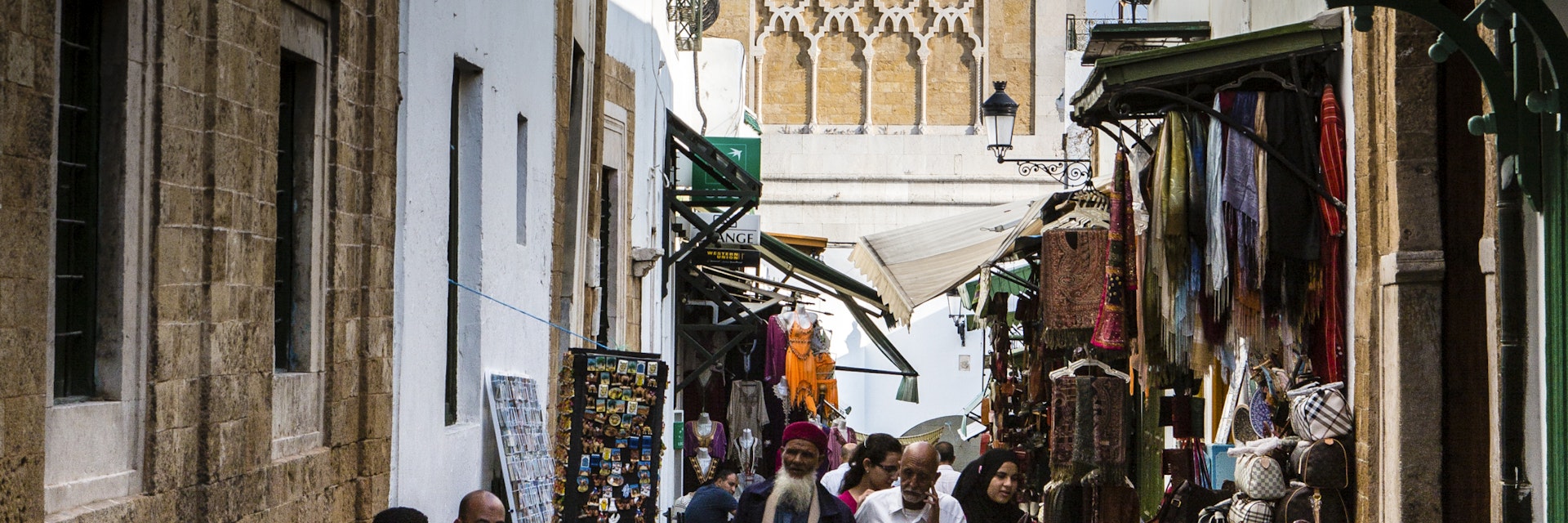
Getty Images/Lonely Planet Images
In Tunisia's capital, the term "living history" really does apply. Here, periods of conquest, trade and independence have woven into the city's fabric and culture a rich and complex flavor that becomes apparent wherever you explore.
Attractions
Must-see attractions.
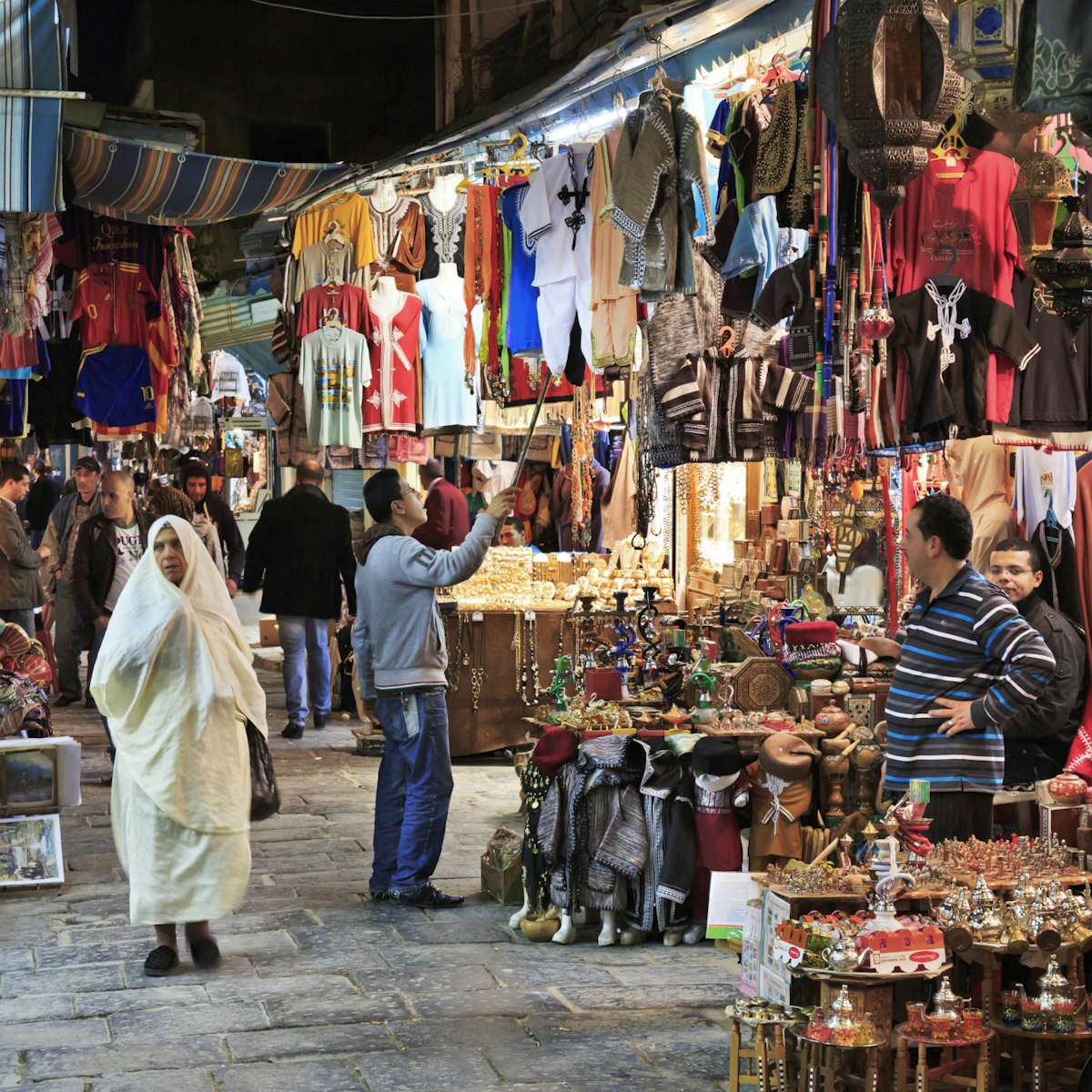
This sprawling maze of ancient streets and alleyways is one of the most impressive medieval medinas in North Africa and one of Tunisia's great treasures…
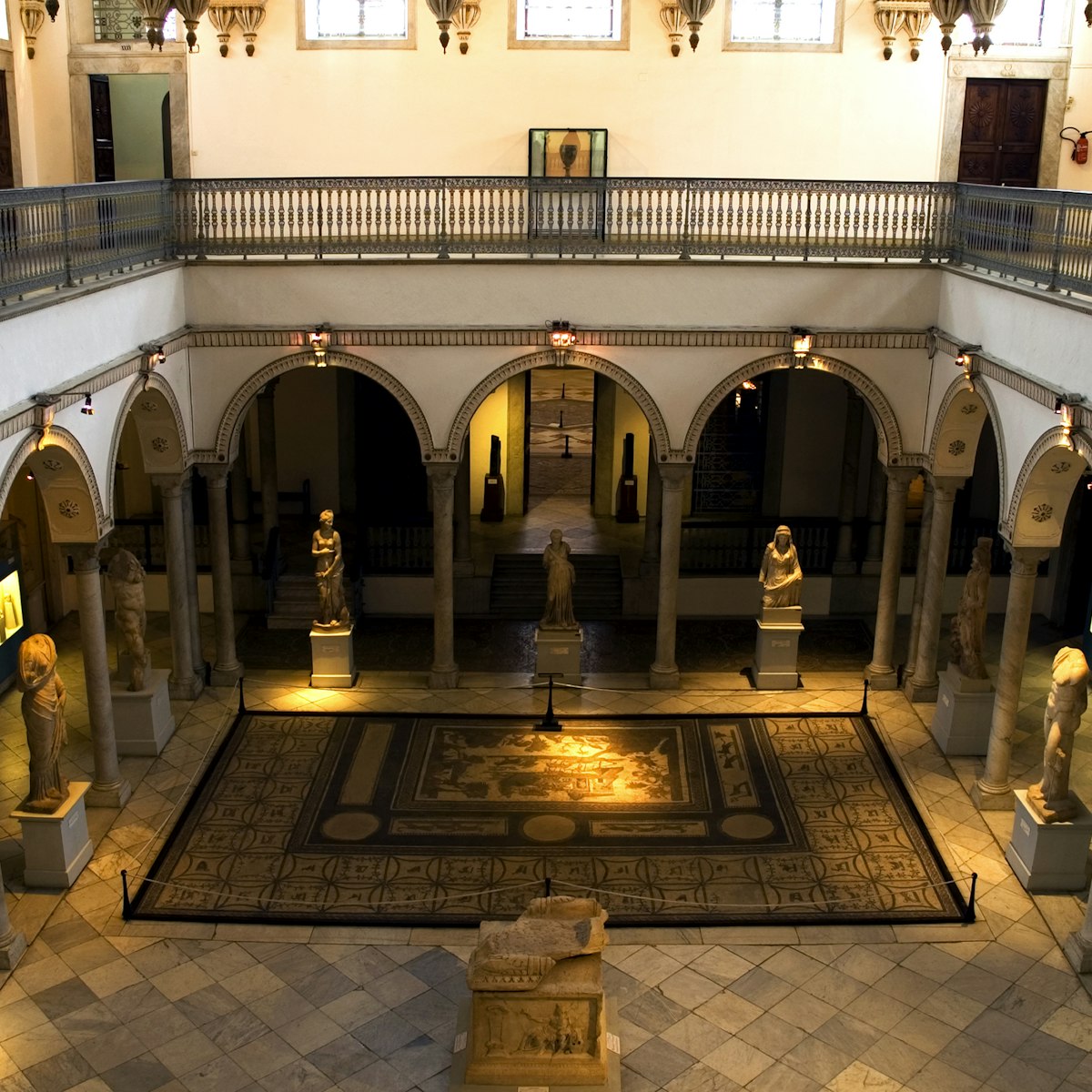
Bardo Museum
The main draw at the Tunisia's top museum is its magnificent collection of Roman mosaics. These provide a vibrant and fascinating portrait of ancient…
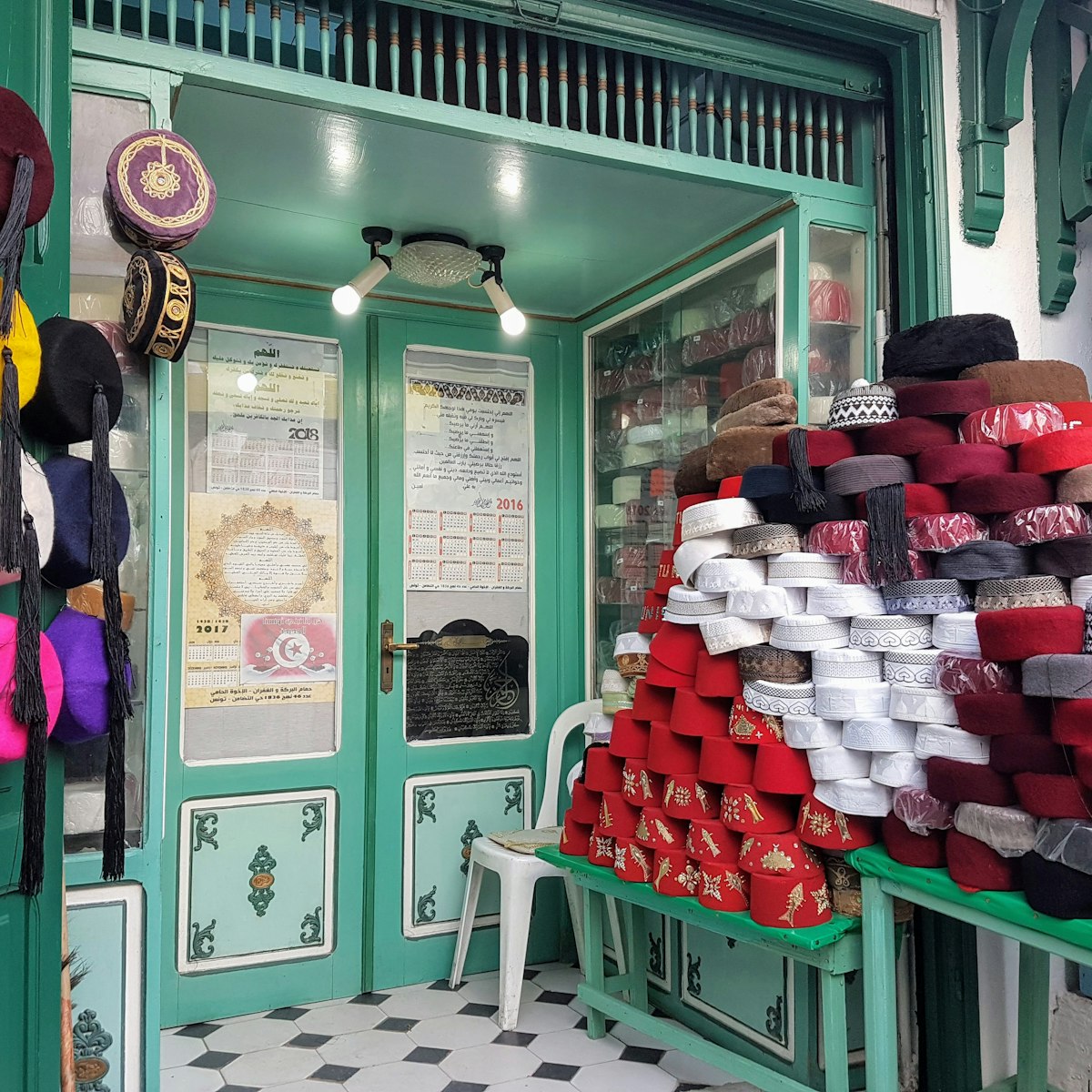
Souq des Chechias
A medina highlight, this hugely atmospheric souq is filled with exquisitely decorated shops producing and selling chechias, Tunisia's traditional blood…

Marché Centrale
Tunisian food markets offer a great introduction to local culture, and Tunis' Marché Centrale is particularly atmospheric. The original market building…
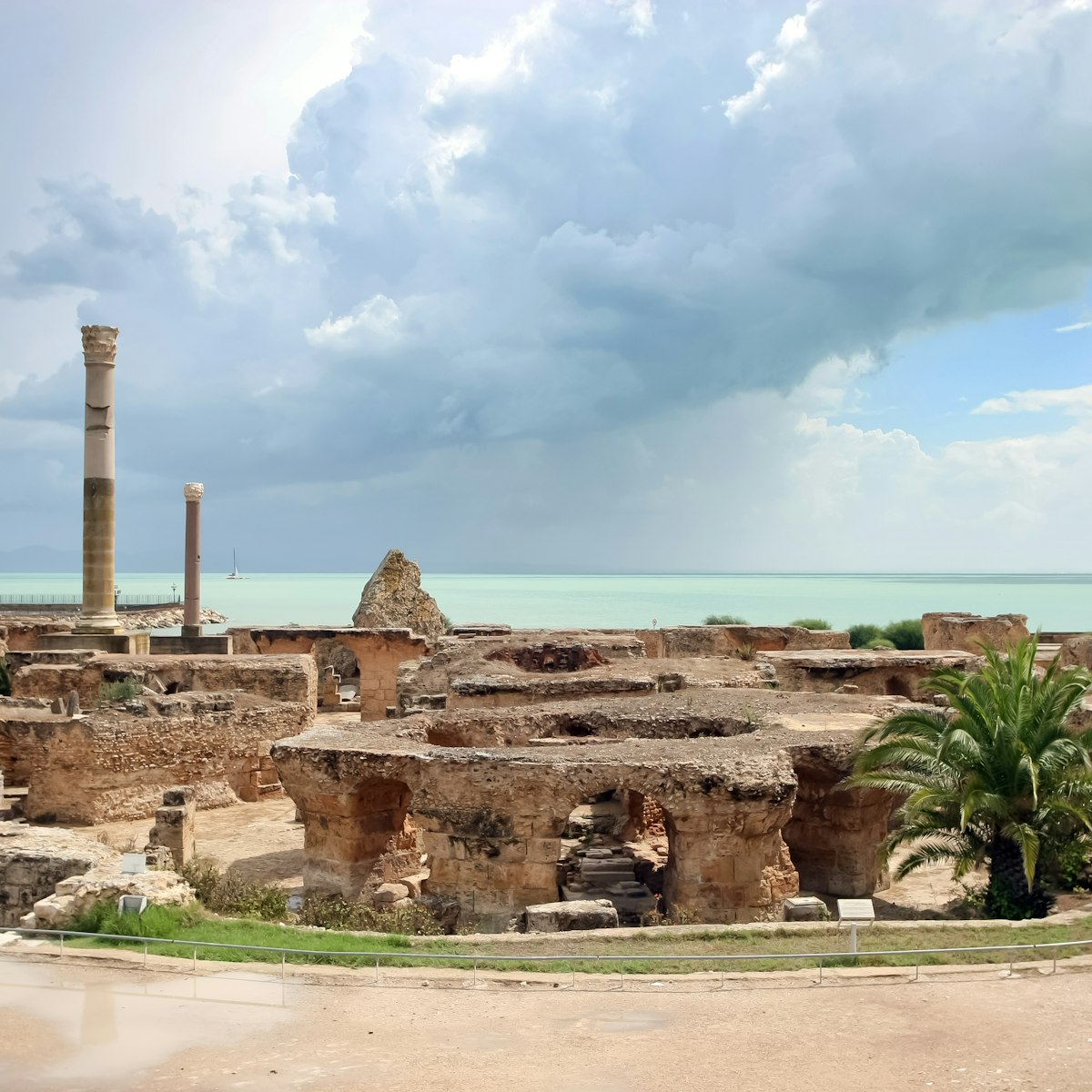
Antonine Baths
The Romans chose a sublime seaside setting for this monumental terme (bath complex), a short walk downhill from the Roman villas. Begun under Hadrian and…
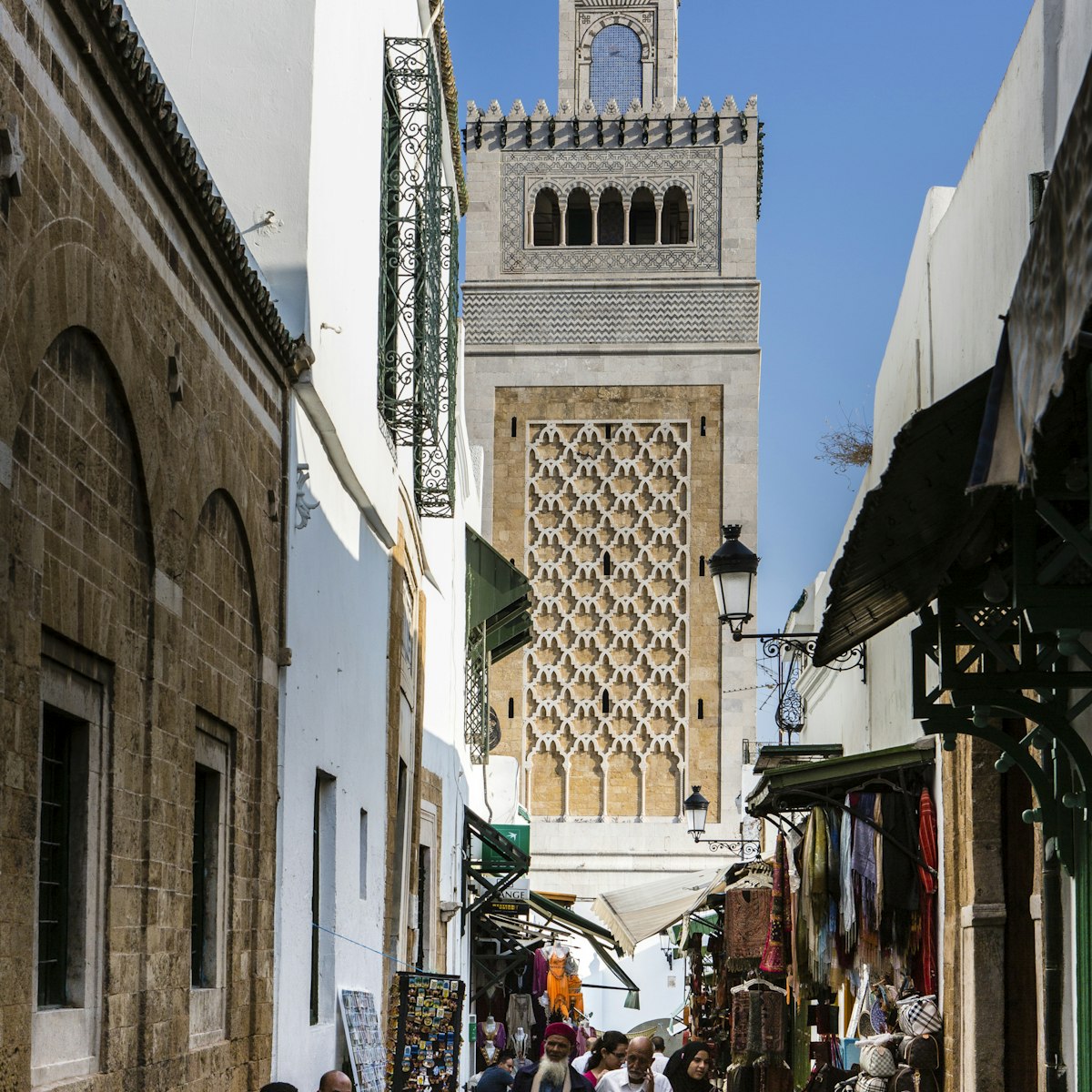
Zitouna Mosque
Located in the heart of Tunis' medina, this important mosque was founded in 734 and built on a site once occupied by a church. It was totally rebuilt in…
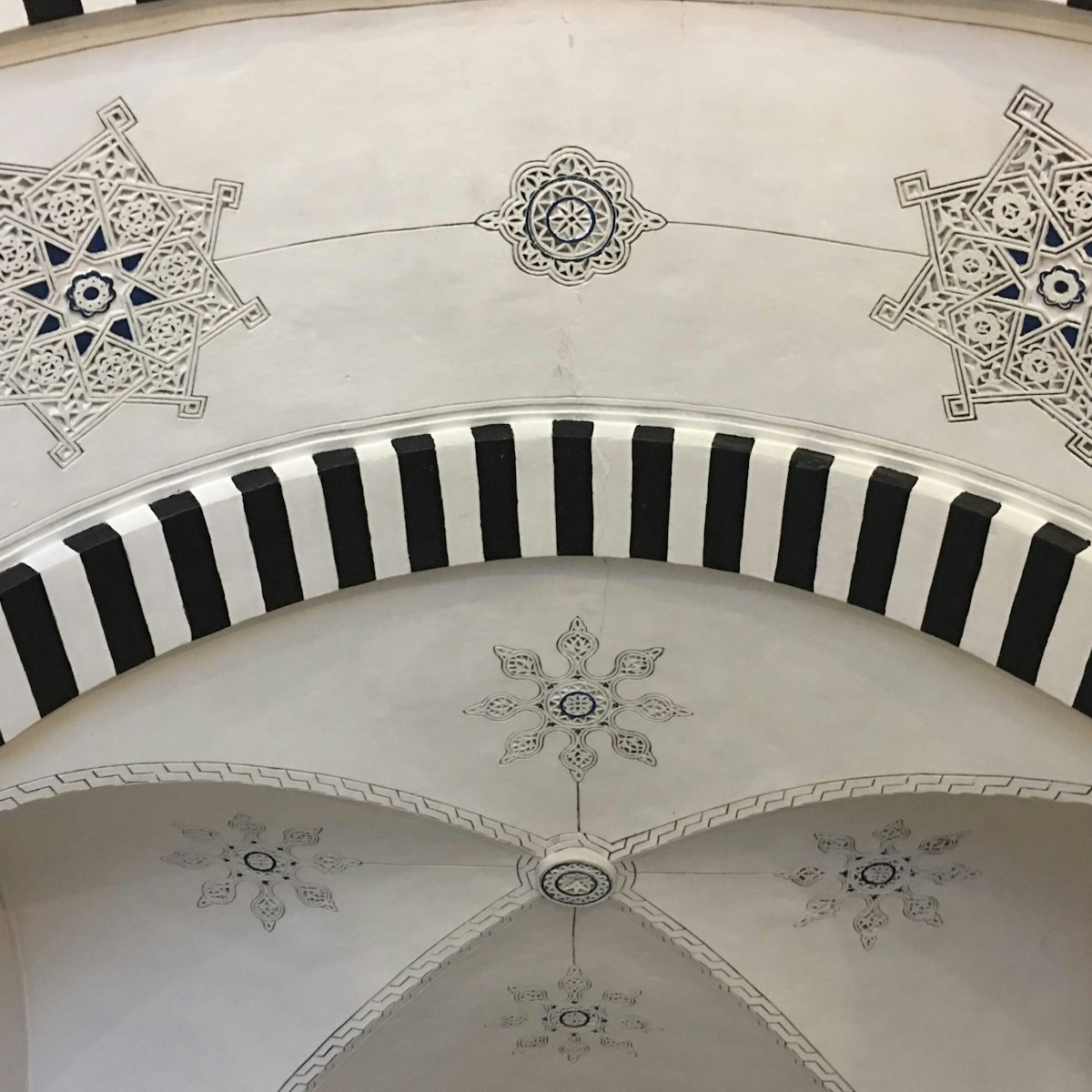
Once home to the Lasram family, who provided the beys with scribes, this magnificent building dates from the early 19th century and was one of the first…
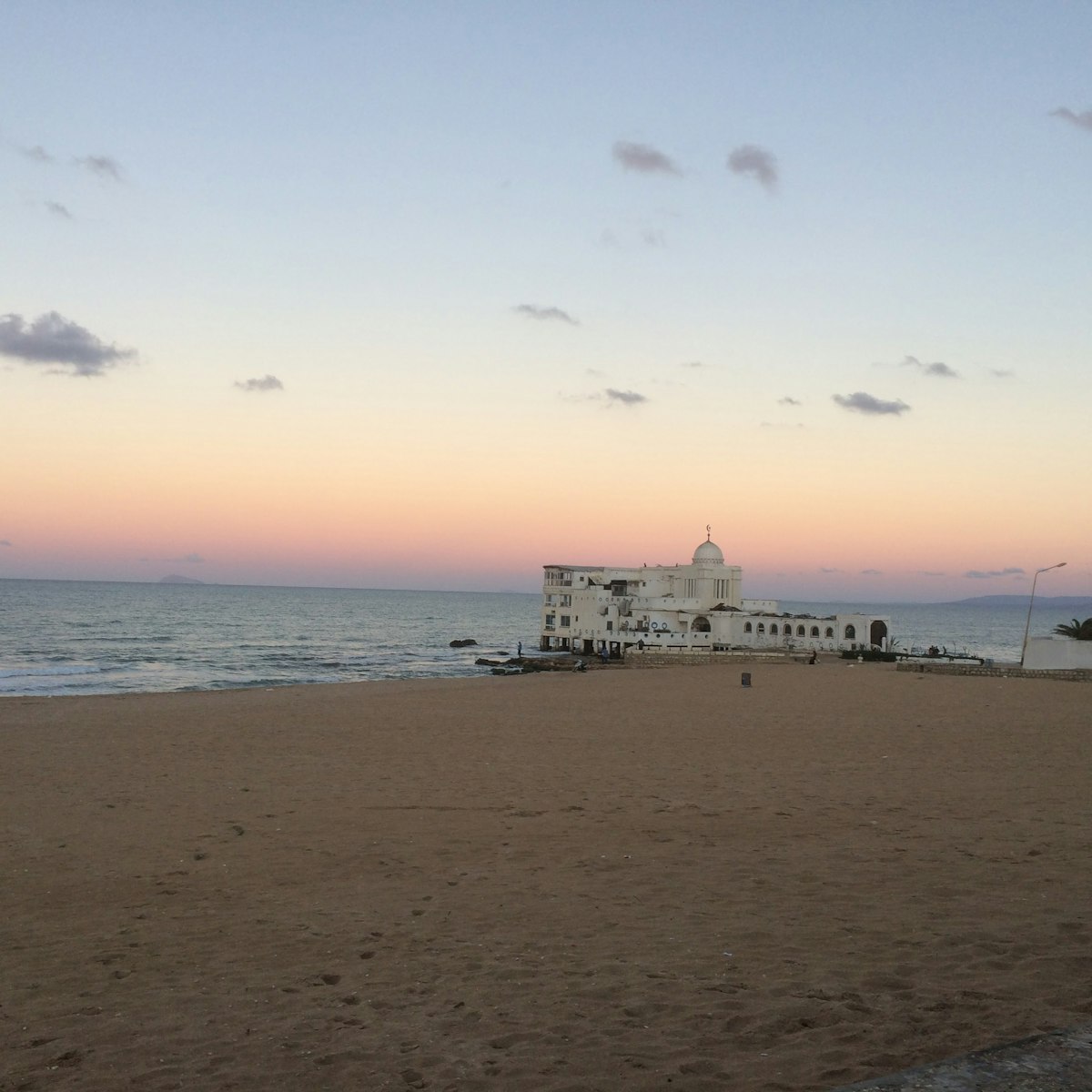
La Marsa Beach
Join the local crowds flocking to this urban beach to escape the summer heat with a dip in the clear waters of the Med. In colder months, the sand becomes…
Latest stories from Tunis
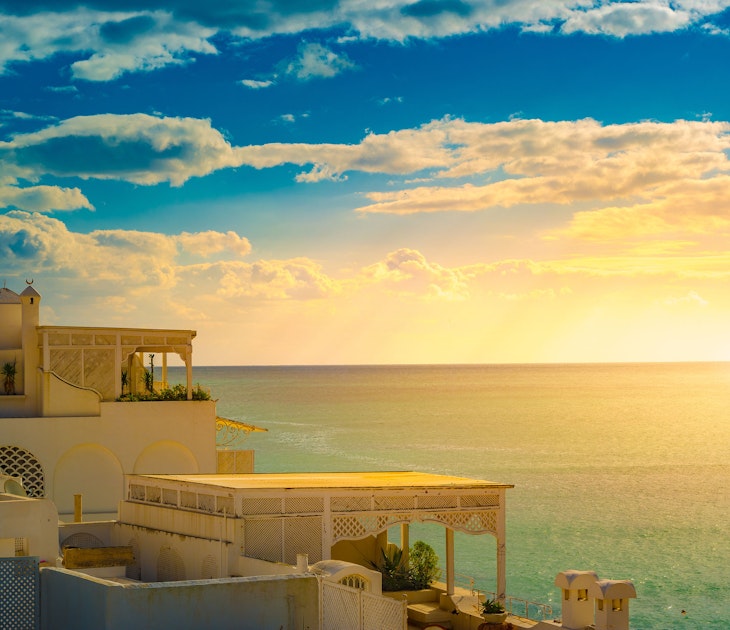
Jan 13, 2020 • 2 min read
Another big airline is resuming flights to Tunisia after a years-long hiatus. Popular budget airline EasyJet is bringing back flights to Enfidha, near the…
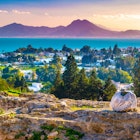
Nov 20, 2019 • 6 min read
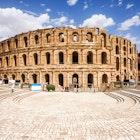
Nov 13, 2019 • 5 min read
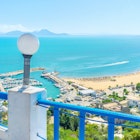
Apr 17, 2019 • 6 min read
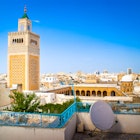
Mar 14, 2019 • 7 min read

Feb 22, 2019 • 5 min read

Jan 4, 2019 • 5 min read
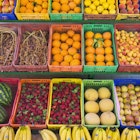
Oct 19, 2018 • 7 min read
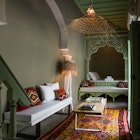
Jul 18, 2018 • 5 min read
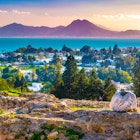
Jul 2, 2018 • 7 min read
in partnership with getyourguide
Book popular activities in Tunis
Purchase our award-winning guidebooks.
Get to the heart of Tunis with one of our in-depth, award-winning guidebooks, covering maps, itineraries, and expert guidance.
Tunis and beyond
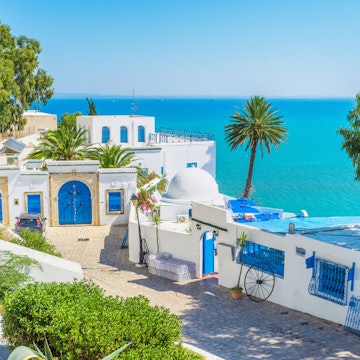
- Skip to main content
- Skip to "About this site"
Language selection
Search travel.gc.ca.
Help us to improve our website. Take our survey !
COVID-19: travel health notice for all travellers
Tunisia travel advice
Latest updates: Laws and culture – updated information on Ramadan 2025
Last updated: April 15, 2024 14:40 ET
On this page
Safety and security, entry and exit requirements, laws and culture, natural disasters and climate, tunisia - exercise a high degree of caution.
Exercise a high degree of caution in Tunisia due to the nationwide risk of civil unrest and terrorist attacks.
Regional advisory - Avoid all travel
- the governorate of Kasserine including the Chaambi Mountain National Park area
- Mount Mghila, located between the governorates of Kasserine and Sidi Bouzid
- the forest located northwest of the city of Jendouba and the forest located west of Ain Draham, in the governorate of Jendouba
- Mount Orbata, located in the governorate of Gafsa (east of the city of Gafsa, between El Ksar and Sened)
- within 30 km of the borders with Algeria, except for the tourist cities of Tabarka, Nefta, Tamerza, Chebika, Mides and Ain Draham
- within 40 km of the border with Libya in the governorates of Medenine and Tataouine
- the militarized zone in Tataouine Governorate that lies south of, but does not include, the towns of Dehiba and El Borma
Regional advisory - Avoid non-essential travel
- the towns of Jendouba, Remada and Sidi Bouzid, as well as the road corridor from the town of Sbeitla to Sidi Bouzid
- Tunisia’s Greater South in all areas south of the Jebil National Park, excluding areas south of Dehiba and El Borma, where we advise against all travel
Back to top
Political situation
In March 2022, Tunisia's president dissolved the Parliament.
Demonstrations may occur. They could turn violent and lead to clashes between protesters and security forces.
If you are in Tunisia:
- avoid all demonstrations and gatherings
- monitor local media to stay informed about the situation
- follow the advice of local authorities
Mount Chambi National Park
There is a threat of terrorist attacks and kidnapping in the area of Mount Chambi National Park in Kasserine Governorate. Ongoing Tunisian military operations against suspected terrorists occur regularly in the area. The use of improvised explosive devices (IEDs) has been reported in the area.
Regularly review your security practices and remain alert to the changing situation.
Border areas with Algeria and Libya
There is an ongoing threat of terrorist attacks and kidnapping along the border with Algeria, especially in the mountainous areas in the northern half of Tunisia. The use of IEDs has been reported in the area.
Due to the flow of suspected terrorist cells and militants, as well as contraband, between Tunisia and neighbouring countries, the Tunisian government has increased its security presence at borders with Algeria and Libya. However, the threat of cross-border terrorist activity remains and attacks have targeted security forces.
Tunisian security forces regularly conduct counter-terrorism operations in the border areas of the governorates of Jendouba, Kasserine and Kef.
The border between Tunisia and Libya may close with little or no notice and for an unspecified period of time.
Tunisia’s greater south area
The deterioration in the security situation in neighbouring Libya has resulted in greater volatility in southern Tunisia, particularly in remote areas. Remote areas, including the area south of Jebil National Park and desert areas, can have unreliable cellphone reception and few resources for assistance.
Several attacks have occurred throughout Tunisia.
On May 9, 2023, a shooting took place near the Ghriba synagogue on the island of Djerba, resulting in several casualties. This attack took place despite heightened presence of security forces during the annual Lag Ba'omer pilgrimage.
Tourist resorts and attractions, as well as Tunisian military and government institutions have been targeted. A number of suspected terrorists and arms traffickers have been captured in various regions of the country, including in Tunis. Extremist elements are present and the regional instability continues to pose a general threat to the security of foreigners, religious sites, and tourist facilities. Security forces are always on a state of alert and carry out anti-terrorism operations across the country to prevent attacks.
Despite these efforts, terrorist attacks could occur at any time. Targets could include:
- government buildings, including schools
- places of worship
- airports and other transportation hubs and networks
- public areas such as tourist attractions, restaurants, bars, coffee shops, shopping centres, markets, hotels and other sites frequented by foreigners
Always be aware of your surroundings when in public places.
Be particularly vigilant during the following:
- sporting events
- religious holidays
- public celebrations
- major political events, such as elections
Terrorists could use such occasions to mount attacks.
State of emergency
The state of emergency has been in effect in Tunisia since 2015 and is regularly extended due to the threat of terrorism.
While a state of emergency is in effect, security forces have increased powers to:
- perform searches
- conduct seizures
- detain persons of interest
If you’re travelling in an area where a state of emergency is in effect:
- be aware that you may be subject to searches by security forces
- always cooperate with military and police officers
- carry valid ID at all times and be prepared for various checkpoints
- allow extra time to reach your destination
- follow the instructions of local authorities
- monitor local news to stay informed on the current situation
Kidnappings have occurred, along border areas. Kidnappings are not numerous and do not usually target foreigners but cannot be ruled out.
Demonstrations and civil unrest
Political, social and economic tensions have caused civil unrest throughout the country, but mostly occur in central and southern Tunisia and in parts of Tunis. Some demonstrations and labour strikes have led to roadblocks, burning tires and have deteriorated into violent clashes between the police and demonstrators, resulting in considerable property damage, injuries and deaths.
There is an ongoing threat of a general strike in the field of transportation. Rail, maritime, air and public transportation could be affected on short notice. Occasional fuel and food shortages have been reported.
- Avoid areas where demonstrations and large gatherings are taking place or could occur as local conditions may change rapidly
- Follow the instructions of local authorities
- Monitor local media for information on ongoing demonstrations
Mass gatherings (large-scale events)
Sport events
Avoid the crowds that can form at soccer matches, as such events have led to incidents of violence.
Street crime, including theft, pickpocketing, purse snatching and scams, has been much more frequent in Tunisia since the 2011 revolution.
“Drive-by” thefts by individuals on scooters and motorcycles have occurred in tourist areas.
Women’s safety
Women travelling alone may be subject to certain forms of harassment and verbal abuse. Be aware that Tunisian men have targeted Canadian women for fraudulent marriages (see Fraud).
Advice for women travellers
Young Tunisian men have pursued marriage with older Canadian women in coastal resorts, for financial gain or in order to gain entry to Canada.
Overseas fraud
Road safety
Driving can be dangerous, particularly after dark.
Traffic signs and signals are routinely ignored.
Many roads in urban and rural areas don’t have adequate road lighting.
When walking, be especially cautious as cars don’t routinely stop at pedestrian crosswalks or stoplights.
Motorists sometimes drive on the wrong side of the road and ignore lane markings.
Bicycles, mopeds and motorcycles often operate without sufficient lights and reflectors, and regularly dart in and out of traffic.
Sidewalks are not consistently present and pedestrians are sometimes forced to walk on the street.
Pedestrians often cross the road while dodging traffic and ignore vehicles.
Police officers frequently stop cars for inspection, especially rental cars.
Public transportation
Taxis are available but may be scarce in major cities at peak hours. Most taxis are equipped with fare meters, which should be activated for all trips. Few taxis have functioning seatbelts.
Buses are crowded. Petty crime occurs in buses.
Rail service is generally safe. Petty crime occurs on city and inter-city trains. Be extremely vigilant with your belongings at all times.
We do not make assessments on the compliance of foreign domestic airlines with international safety standards.
Information about foreign domestic airlines
Every country or territory decides who can enter or exit through its borders. The Government of Canada cannot intervene on your behalf if you do not meet your destination’s entry or exit requirements.
We have obtained the information on this page from the Tunisian authorities. It can, however, change at any time.
Verify this information with the Foreign Representatives in Canada .
Entry requirements vary depending on the type of passport you use for travel.
Before you travel, check with your transportation company about passport requirements. Its rules on passport validity may be more stringent than the country’s entry rules.
Regular Canadian passport
Your passport must be valid for at least 3 months beyond the date you expect to leave Tunisia.
Passport for official travel
Different entry rules may apply.
Official travel
Passport with “X” gender identifier
While the Government of Canada issues passports with an “X” gender identifier, it cannot guarantee your entry or transit through other countries. You might face entry restrictions in countries that do not recognize the “X” gender identifier. Before you leave, check with the closest foreign representative for your destination.
Other travel documents
Different entry rules may apply when travelling with a temporary passport or an emergency travel document. Before you leave, check with the closest foreign representative for your destination.
Useful links
- Foreign Representatives in Canada
- Canadian passports
Tourist visa: not required for stays up to 90 days Business visa: not required Student visa: not required
If you intend to stay in Tunisia longer than 90 days, contact the Embassy of the Republic of Tunisia in Ottawa for information about visa, work permit or temporary resident status regulations prior to your departure.
In Tunisia, you must report to a police station or the Ministry of the Interior.
Dual citizenship
Tunisian authorities may ask Canadians with Tunisian citizenship to enter Tunisia on their Tunisian passports.
If Canadians with Tunisian citizenship are permitted to enter on a Canadian passport, it is likely that they will be required to obtain a Tunisian passport before exiting the country.
Dual citizens have been questioned at length and, as a result, have missed their flight.
If your Tunisian passport is no longer valid, contact the Tunisian embassy in Ottawa prior to travel.
Children and travel
Learn more about travelling with children .
Yellow fever
Learn about potential entry requirements related to yellow fever (vaccines section).
Relevant Travel Health Notices
- Global Measles Notice - 13 March, 2024
- COVID-19 and International Travel - 13 March, 2024
This section contains information on possible health risks and restrictions regularly found or ongoing in the destination. Follow this advice to lower your risk of becoming ill while travelling. Not all risks are listed below.
Consult a health care professional or visit a travel health clinic preferably 6 weeks before you travel to get personalized health advice and recommendations.
Routine vaccines
Be sure that your routine vaccinations , as per your province or territory , are up-to-date before travelling, regardless of your destination.
Some of these vaccinations include measles-mumps-rubella (MMR), diphtheria, tetanus, pertussis, polio, varicella (chickenpox), influenza and others.
Pre-travel vaccines and medications
You may be at risk for preventable diseases while travelling in this destination. Talk to a travel health professional about which medications or vaccines may be right for you, based on your destination and itinerary.
Yellow fever is a disease caused by a flavivirus from the bite of an infected mosquito.
Travellers get vaccinated either because it is required to enter a country or because it is recommended for their protection.
- There is no risk of yellow fever in this country.
Country Entry Requirement*
- Proof of vaccination is not required to enter this country.
Recommendation
- Vaccination is not recommended.
* It is important to note that country entry requirements may not reflect your risk of yellow fever at your destination. It is recommended that you contact the nearest diplomatic or consular office of the destination(s) you will be visiting to verify any additional entry requirements.
About Yellow Fever
Yellow Fever Vaccination Centres in Canada
There is a risk of hepatitis A in this destination. It is a disease of the liver. People can get hepatitis A if they ingest contaminated food or water, eat foods prepared by an infectious person, or if they have close physical contact (such as oral-anal sex) with an infectious person, although casual contact among people does not spread the virus.
Practise safe food and water precautions and wash your hands often. Vaccination is recommended for all travellers to areas where hepatitis A is present.
Measles is a highly contagious viral disease. It can spread quickly from person to person by direct contact and through droplets in the air.
Anyone who is not protected against measles is at risk of being infected with it when travelling internationally.
Regardless of where you are going, talk to a health care professional before travelling to make sure you are fully protected against measles.
Hepatitis B is a risk in every destination. It is a viral liver disease that is easily transmitted from one person to another through exposure to blood and body fluids containing the hepatitis B virus. Travellers who may be exposed to blood or other bodily fluids (e.g., through sexual contact, medical treatment, sharing needles, tattooing, acupuncture or occupational exposure) are at higher risk of getting hepatitis B.
Hepatitis B vaccination is recommended for all travellers. Prevent hepatitis B infection by practicing safe sex, only using new and sterile drug equipment, and only getting tattoos and piercings in settings that follow public health regulations and standards.
The best way to protect yourself from seasonal influenza (flu) is to get vaccinated every year. Get the flu shot at least 2 weeks before travelling.
The flu occurs worldwide.
- In the Northern Hemisphere, the flu season usually runs from November to April.
- In the Southern Hemisphere, the flu season usually runs between April and October.
- In the tropics, there is flu activity year round.
The flu vaccine available in one hemisphere may only offer partial protection against the flu in the other hemisphere.
The flu virus spreads from person to person when they cough or sneeze or by touching objects and surfaces that have been contaminated with the virus. Clean your hands often and wear a mask if you have a fever or respiratory symptoms.
Coronavirus disease (COVID-19) is an infectious viral disease. It can spread from person to person by direct contact and through droplets in the air.
It is recommended that all eligible travellers complete a COVID-19 vaccine series along with any additional recommended doses in Canada before travelling. Evidence shows that vaccines are very effective at preventing severe illness, hospitalization and death from COVID-19. While vaccination provides better protection against serious illness, you may still be at risk of infection from the virus that causes COVID-19. Anyone who has not completed a vaccine series is at increased risk of being infected with the virus that causes COVID-19 and is at greater risk for severe disease when travelling internationally.
Before travelling, verify your destination’s COVID-19 vaccination entry/exit requirements. Regardless of where you are going, talk to a health care professional before travelling to make sure you are adequately protected against COVID-19.
In this destination, rabies is carried by dogs and some wildlife, including bats. Rabies is a deadly disease that spreads to humans primarily through bites or scratches from an infected animal. While travelling, take precautions , including keeping your distance from animals (including free-roaming dogs), and closely supervising children.
If you are bitten or scratched by an animal while travelling, immediately wash the wound with soap and clean water and see a health care professional. Rabies treatment is often available in this destination.
Before travel, discuss rabies vaccination with a health care professional. It may be recommended for travellers who are at high risk of exposure (e.g., occupational risk such as veterinarians and wildlife workers, children, adventure travellers and spelunkers, and others in close contact with animals).
Tick-borne encephalitis (TBE) is a risk in some areas of this destination. It is a viral disease that affects the central nervous system (brain and spinal cord). It is spread to humans by the bite of infected ticks or occasionally when unpasteurized milk products are consumed.
Travellers to areas where TBE is found may be at higher risk during April to November, and the risk is highest for people who hike or camp in forested areas.
Protect yourself from tick bites . The vaccine is not available in Canada. It may be available in the destination you are travelling to.
Safe food and water precautions
Many illnesses can be caused by eating food or drinking beverages contaminated by bacteria, parasites, toxins, or viruses, or by swimming or bathing in contaminated water.
- Learn more about food and water precautions to take to avoid getting sick by visiting our eat and drink safely abroad page. Remember: Boil it, cook it, peel it, or leave it!
- Avoid getting water into your eyes, mouth or nose when swimming or participating in activities in freshwater (streams, canals, lakes), particularly after flooding or heavy rain. Water may look clean but could still be polluted or contaminated.
- Avoid inhaling or swallowing water while bathing, showering, or swimming in pools or hot tubs.
Travellers' diarrhea is the most common illness affecting travellers. It is spread from eating or drinking contaminated food or water.
Risk of developing travellers' diarrhea increases when travelling in regions with poor standards of hygiene and sanitation. Practise safe food and water precautions.
The most important treatment for travellers' diarrhea is rehydration (drinking lots of fluids). Carry oral rehydration salts when travelling.
Typhoid is a bacterial infection spread by contaminated food or water. Risk is higher among children, travellers going to rural areas, travellers visiting friends and relatives or those travelling for a long period of time.
Travellers visiting regions with a risk of typhoid, especially those exposed to places with poor sanitation, should speak to a health care professional about vaccination.
Insect bite prevention
Many diseases are spread by the bites of infected insects such as mosquitoes, ticks, fleas or flies. When travelling to areas where infected insects may be present:
- Use insect repellent (bug spray) on exposed skin
- Cover up with light-coloured, loose clothes made of tightly woven materials such as nylon or polyester
- Minimize exposure to insects
- Use mosquito netting when sleeping outdoors or in buildings that are not fully enclosed
To learn more about how you can reduce your risk of infection and disease caused by bites, both at home and abroad, visit our insect bite prevention page.
Find out what types of insects are present where you’re travelling, when they’re most active, and the symptoms of the diseases they spread.
There is a risk of chikungunya in this country. The risk may vary between regions of a country. Chikungunya is a virus spread through the bite of an infected mosquito. Chikungunya can cause a viral disease that typically causes fever and pain in the joints. In some cases, the joint pain can be severe and last for months or years.
Protect yourself from mosquito bites at all times. There is no vaccine available for chikungunya.
Animal precautions
Some infections, such as rabies and influenza, can be shared between humans and animals. Certain types of activities may increase your chance of contact with animals, such as travelling in rural or forested areas, camping, hiking, and visiting wet markets (places where live animals are slaughtered and sold) or caves.
Travellers are cautioned to avoid contact with animals, including dogs, livestock (pigs, cows), monkeys, snakes, rodents, birds, and bats, and to avoid eating undercooked wild game.
Closely supervise children, as they are more likely to come in contact with animals.
Person-to-person infections
Stay home if you’re sick and practise proper cough and sneeze etiquette , which includes coughing or sneezing into a tissue or the bend of your arm, not your hand. Reduce your risk of colds, the flu and other illnesses by:
- washing your hands often
- avoiding or limiting the amount of time spent in closed spaces, crowded places, or at large-scale events (concerts, sporting events, rallies)
- avoiding close physical contact with people who may be showing symptoms of illness
Sexually transmitted infections (STIs) , HIV , and mpox are spread through blood and bodily fluids; use condoms, practise safe sex, and limit your number of sexual partners. Check with your local public health authority pre-travel to determine your eligibility for mpox vaccine.
Medical services and facilities
Medical facilities are generally good in major centres, but are usually very limited or unavailable in rural areas.
Physicians and hospitals often require a deposit or upfront cash payment for medical care. Some clinics may accept private insurance coverage if they have a guarantee of payment from the insurance provider.
Make sure you get travel insurance that includes coverage for medical evacuation and hospital stays.
Travel health and safety
Keep in Mind...
The decision to travel is the sole responsibility of the traveller. The traveller is also responsible for his or her own personal safety.
Be prepared. Do not expect medical services to be the same as in Canada. Pack a travel health kit , especially if you will be travelling away from major city centres.
You must abide by local laws.
Learn about what you should do and how we can help if you are arrested or detained abroad .
Penalties for possession, use or trafficking of illegal drugs are severe. Those convicted of these offences are subject to heavy fines and prison sentences of up to life.
Cannabis-derived products, including those containing CBD, are illegal. Detection of illicit drugs, including cannabis, in blood or urine tests can also lead to a conviction.
Drugs, alcohol and travel
Religious proselytism
Religious proselytizing is not permitted.
2SLGBTQI+ travellers
Tunisian law prohibits sexual acts between individuals of the same sex.
2SLGBTQI+ travellers should carefully consider the risks of travelling to Tunisia.
Travel and your sexual orientation, gender identity, gender expression and sex characteristics
Both valid Canadian driver’s licences and international driving permits are accepted in Tunisia.
International Driving Permit
Dual citizenship is not legally recognized in Tunisia.
If local authorities consider you a citizen of Tunisia, they may refuse to grant you access to Canadian consular services. This will prevent us from providing you with those services.
Travellers with dual citizenship
Child custody
A child born to a Tunisian mother or father can be considered by the Tunisian authorities as a Tunisian citizen, no matter where he or she was born and what other citizenship he or she has acquired.
In cases where one or more family members hold Tunisian citizenship, parents should consider the risks before their children travel to Tunisia, including that:
- at the request of family members, Tunisian authorities can prevent children from leaving Tunisia (a procedure known as a “stop order”)
- Canadian children who are identified as Tunisian citizens will be treated as Tunisian nationals
International Child Abduction
The Hague Convention on the Civil Aspects of International Child Abduction is an international treaty. It can help parents with the return of children who have been removed to or retained in certain countries in violation of custody rights. It does not apply between Canada and Tunisia.
If your child was wrongfully taken to, or is being held in Tunisia by an abducting parent:
- act as quickly as you can
- consult a lawyer in Canada and in Tunisia to explore all the legal options for the return of your child
- report the situation to the nearest Canadian government office abroad or to the Vulnerable Children’s Consular Unit at Global Affairs Canada by calling the Emergency Watch and Response Centre.
If your child was removed from a country other than Canada, consult a lawyer to determine if The Hague Convention applies.
Be aware that Canadian consular officials cannot interfere in private legal matters or in another country’s judicial affairs.
- International Child Abduction: A Guidebook for Left-Behind Parents
- Travelling with children
- Canadian embassies and consulates by destination
- Emergency Watch and Response Centre
Imports and exports
Strict regulations may be enforced on the temporary import and export of firearms, religious material, antiquities, medications and business equipment. Contact the Embassy of the Republic of Tunisia for specific information regarding customs requirements.
Dress and behaviour
The majority of the population is Muslim. Dress conservatively and respect religious and social traditions to avoid offending local sensitivities.
In 2025, the lunar month of Ramadan is expected to begin on or around February 28.
In public, between sunrise and sunset, be discreet when:
Taking photographs of military installations, government buildings and embassies is strongly discouraged. Ask permission before photographing individuals.
The currency is the Tunisian dinar (TND).
It’s prohibited to import and export Tunisian dinars (TND).
ATMs are widely available in tourist areas and can be found in all major centres. Credit cards are accepted at many establishments in urban and tourist areas.
Foreign currency declaration
Tunisian foreign exchange regulations are strict and complex.
There are restrictions on the import and export of foreign currency. You must declare all foreign currency in your possession equal to or superior to the equivalent of 20,000 TND:
- upon arrival
- upon departure
However, if you entered the country with foreign currency equivalent to 20,000 TND or less without declaring it, customs authorities may still confiscate any sums exceeding the equivalent of 5000 TND when you leave the country.
In addition, you will not be able to leave Tunisia with the equivalent of 30,000 TND or more, even if you declared it upon entry.
These rules apply to non-residents.
Residents of Tunisia may obtain a conversion allowance of up to 6000 TND in foreign currency per calendar year under certain conditions.
However, in order to leave the country as a resident with foreign currency in your possession, you must:
- declare all foreign currency you are carrying
- provide official proof to the customs authorities of the allowance obtained
If you’re travelling to Tunisia, you should:
- familiarize yourself with the regulations before you travel
- declare any foreign currency in your possession upon entry
- keep your declaration until you leave
- exchange foreign currency at recognized banks or exchange offices only
- plan accordingly
Foreign currency declarations apply to:
- traveller's cheques
Currency and exchange - Tunisian Customs (in French and Arabic only)
Tunisia is exposed to various natural disasters, such as:
- bad weather
- sand and dust storms
- earthquakes
Temperatures vary geographically and according to the seasons. In the north, summers are hot and dry and winters are rainy. In the south, the climate is semi-arid and it can be very hot in the Sahara, especially in the summer. Between June and September, temperatures can exceed 40°C and dust storms and sand storms frequently occur.
Severe droughts can last for several years reducing water supply.
In the event of a drought:
- always keep water supplies on hand
Rainy season
In the north of Tunisia, the rainy season generally extends from October to May. In the south, rainfall is much less important and frequent because of the arid climate. In the winter, roads can be blocked by downpours.
Seasonal flooding can affect overland travel and the provision of essential services. Roads may become impassable and bridges damaged.
- Monitor local media for updates, including road conditions
- Stay away from flooded areas
- Monitor weather reports
- Follow the instructions of local authorities, including evacuation orders
Dust Storms
Sand and dust storms are common.
During a dust storm:
- stay indoors
- keep windows closed
- be prepared to change, interrupt or cancel your trip at any time
- monitor local media for up-to-date information on the situation
Earthquakes
Although Tunisia is not in a high-risk earthquake zone, low seismic activity can occasionally occur.
Earthquakes - What to Do?
Local services
In case of emergency, dial:
- police: 197 / 193
- medical assistance: 190
- firefighters: 198
Consular assistance
For emergency consular assistance, call the Embassy of Canada to Tunisia, in Tunis, and follow the instructions. At any time, you may also contact the Emergency Watch and Response Centre in Ottawa.
The decision to travel is your choice and you are responsible for your personal safety abroad. We take the safety and security of Canadians abroad very seriously and provide credible and timely information in our Travel Advice to enable you to make well-informed decisions regarding your travel abroad.
The content on this page is provided for information only. While we make every effort to give you correct information, it is provided on an "as is" basis without warranty of any kind, expressed or implied. The Government of Canada does not assume responsibility and will not be liable for any damages in connection to the information provided.
If you need consular assistance while abroad, we will make every effort to help you. However, there may be constraints that will limit the ability of the Government of Canada to provide services.
Learn more about consular services .
Risk Levels
take normal security precautions.
Take similar precautions to those you would take in Canada.
Exercise a high degree of caution
There are certain safety and security concerns or the situation could change quickly. Be very cautious at all times, monitor local media and follow the instructions of local authorities.
IMPORTANT: The two levels below are official Government of Canada Travel Advisories and are issued when the safety and security of Canadians travelling or living in the country or region may be at risk.
Avoid non-essential travel
Your safety and security could be at risk. You should think about your need to travel to this country, territory or region based on family or business requirements, knowledge of or familiarity with the region, and other factors. If you are already there, think about whether you really need to be there. If you do not need to be there, you should think about leaving.
Avoid all travel
You should not travel to this country, territory or region. Your personal safety and security are at great risk. If you are already there, you should think about leaving if it is safe to do so.
TUNISIA TRAVEL GUIDE
Plan your trip to tunisia, choose a destination.
My trip to Tunisia was full of surprises. I did not know much about this country in North Africa. This was one of the reasons why I decided to plan this trip. Tunisia managed to surprise me as soon as I began exploring the country. A country with Roman ruins, charming people, beautiful villages, beaches with crystal clear water. The country is full of treasures.
Due to the Covid-19 outbreak, our road trip through the country was cut short. We were unable to visit one of the places we really wanted to visit: the Sahara Desert. We look forward to finishing this road trip and picking up where we left off sometime in the future.
Tunisian dinar. 1USD equals 2.87 TND.
BEST TIME TO VISIT
April, May, October and November.
TRAVEL TO TUNISIA
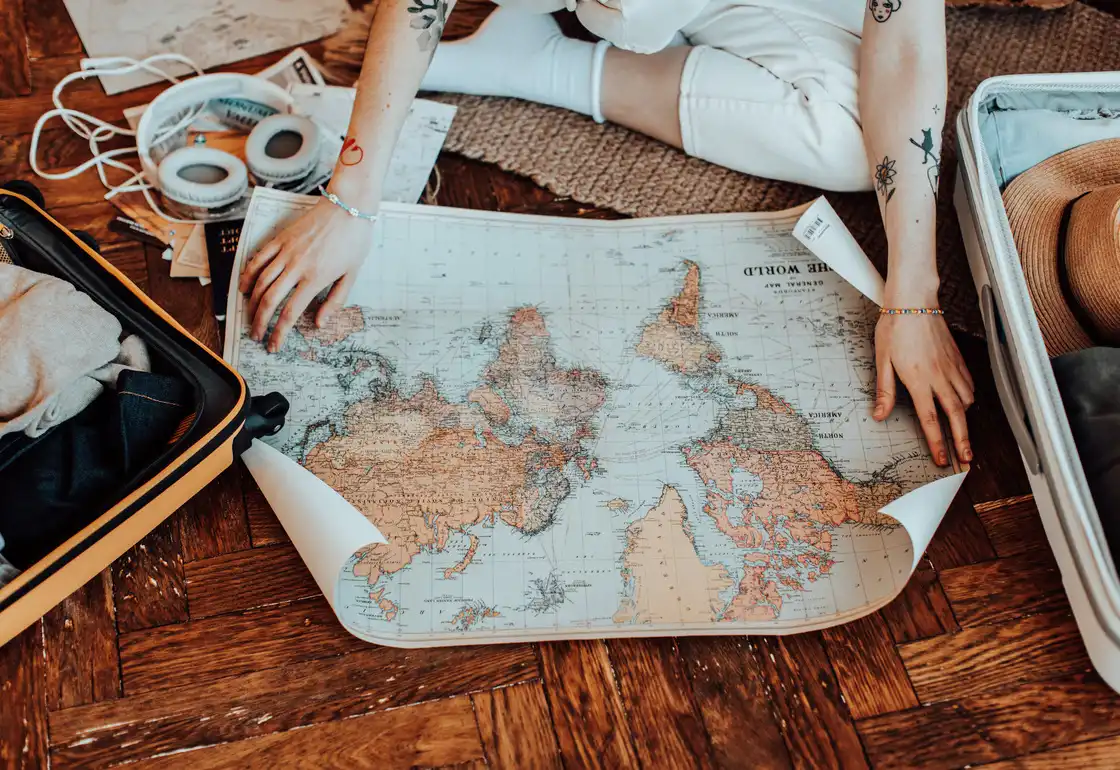
In this Tunisia travel guide you’ll find all my blog posts with information about the country. Gracias a estos consejos podrás organizar tu viaje a Túnez por libre. Thanks to the information and my experiences that’ll share with you, you’ll be able to plan your trip to Tunisia.
PLACES TO VISIT IN TUNISIA
Tips for every destination.
I’m certain Tunisia will surprise you as well. Not only because of how easy it is to travel around the country, specially if you rent a car, which I highly recommend, but also because of how friendly the poeple of Tunisia are. You will also be suprised at the variety of landscapes that you will visit throughout this small but complete country.
There are several cities and towns that you must visit on your trip to Tunisia. Tunis, the capital of Tunisia, is a place you must visit. A walk through the Medina of Tunis, declared a World Heritage Site, will bring you closer to the history of the country and local culture.
Another place that I recommend visiting is Sidi Bou Said, a small Mediterranean town that will make you fall in love the moment you set foot in it. The white and blue tone on the houses is one of the aspects that stands out about this mediterranean town.
Other places worth visiting in Tunisia are Hammamet, Sousse, Kairouan, Tataouine, Douz, Tozeur, Monastir and El Djem, where you will find an impressive Roman amphitheatre. If you want beaches, the best destination is Djerba. As for Roman ruins, do not miss Bulla Regia, Dougga, Thuburbo Majus, Uthina and Sbeitla.
Any trip in Tunisia will most likely begin in Tunis. The capital is a fairly small city, therefore, you will not need more than a day to get to visit its most interesting places. I recommend walking through the Medina of Tunis, where the main tourist attractions of the city are located. Do not forget to visit the Bab El Bhar gate, Zitouna Mosque, the central market, Kasbah Square and Café Panorama which has some amazing views.
You can go on several day trips from the city of Tunis. Near the capital you can visit Sidi Bou Said, the Roman ruins of Uthina, Dougga and Bulla Regia.
HOTELS IN TUNIS
Tours in tunis.
Hammamet is one of the most interesting cities to visit in the Mediterranean coast in Tunisia. Its beaches and preserved old town attract many visitors every year. You must take a stroll through the Medina and visit the Kasbah of Hammamet, originally from the 13th century. At the top there is a small cafeteria, ideal for smoking shisha and drinking tea. I also recommend going to Sidi Bou Hdid Café.
HOTELS IN HAMMAMET
Tours in hammamet.
Sousse is the third largest city in the country and one of the best places to visit in Tunisia. Again, taking a long walk through the Medina is the best way to get to know this town. You must visit the Kasbah, the Ribat, the Great Mosque of Sousse and the souk. If you are looking for beaches, I recommend visiting the Port El Kantaoui area. Near Sousse you can also visit Hergla, a small beautiful town.
HOTELS IN SOUSSE
Tours in sousse.
Djerba is the main island in Tunisia. Although its incredible white sand beaches and crystal clear water are the main attraction of Djerba, this island has a lot to offer. Some of the places you must visit are Djerbahood, Guellala and Houmt Souk, the main city of Djerba. I recommend eating at Restaurant Lagune.
HOTELS IN DJERBA
Tours in djerba.

Search Smartraveller

Latest update
Exercise a high degree of caution in Tunisia overall due to the threat of terrorism.
Higher levels apply in some areas.
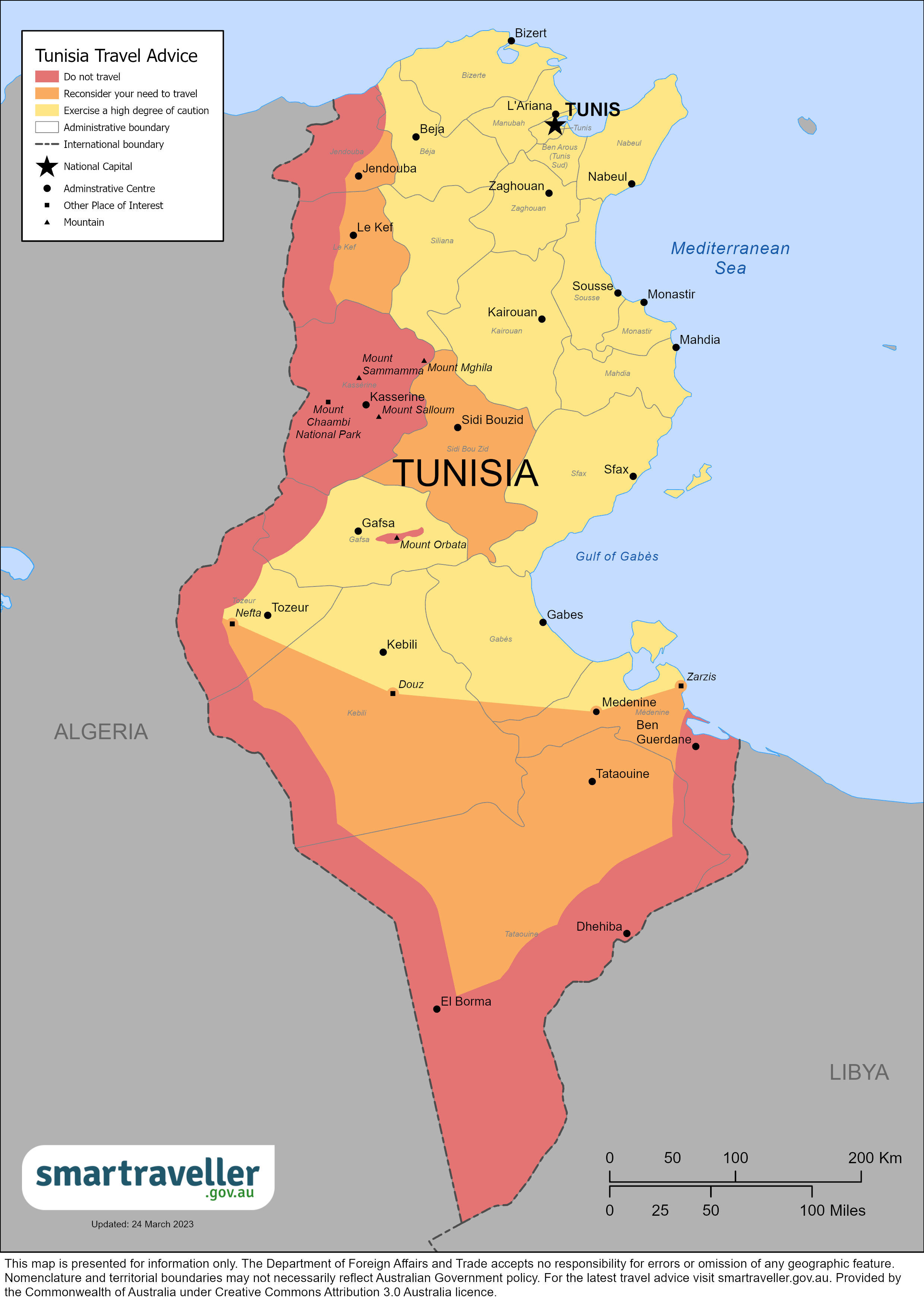
Tunisia (PDF 219.5 KB)
Africa (PDF 1.68 MB)
Local emergency contacts
Fire and rescue services, medical emergencies.
Call 190 or go to the hospital.
Call 197 or 193, or go to the local police.
Advice levels
Exercise a high degree of caution in Tunisia overall.
Do not travel to the militarised zone south of the towns of El Borma and Dhehiba, within 30km of the border with Algeria and within 40km of the rest of the Libya border area north of Dhehiba, including the town of Ben Guerdane and immediate surrounding areas.
Do not travel to:
- the militarised zone south of the towns of El Borma and Dhehiba
- within 30km of the border with Algeria
- within 40km of the rest of the Libya border area north of Dhehiba, including the town of Ben Guerdane and immediate surrounding areas
due to the ongoing threat of terrorist attack and kidnapping.
See Safety
Do not travel to the entire governorate of Kasserine including Mount Chaambi National Park, Mount Salloum and Mount Sammamma; Mount Mghila, located between the governorates of Kasserine and Sidi Bouzid; and Mount Orbata, located in the governorate of Gafsa (east of the city of Gafsa, between El Ksar and Sened).
- the entire governorate of Kasserine including Mount Chaambi National Park, Mount Salloum and Mount Sammamma
- Mount Mghila, located between the governorates of Kasserine and Sidi Bouzid, and
- Mount Orbata, located in the governorate of Gafsa (east of the city of Gafsa, between El Ksar and Sened)
due to ongoing security force operations and the high threat of terrorist attack and kidnapping.
Reconsider your need to travel to areas south of, and including, the towns of Nefta, Douz, Medenine, and Zaris; governorates of Le Kef, Jendouba and Sidi Bouzid due to the ongoing threat of terrorist attack and kidnapping.
Reconsider your need to travel to areas south of, and including, the towns of:
- Medenine, and
and the governorates of:
- Jendouba, and
- Sidi Bouzid
- Terrorist attacks are an ongoing risk in Tunisia, including at tourist and religious sites. Local authorities have increased security. Be alert to possible threats.
- Instability in Libya and Algeria has made Tunisia less safe. Kidnapping is a high risk near the borders. If you plan to travel to these areas, seek professional security advice.
- Civil unrest is common. Protests, demonstrations and strikes can occur with little or no warning a nd can become violent, especially on days of national significance and around Friday prayers. Avoid all protests and large gatherings. F ollow the advice of local authorities.
A state of emergency was declared in 2015, is regularly extended and remains in effect until further notice. The state of emergency grants authorities and security forces exceptional powers against threats of terrorism or organised crime. It allows actions such as preventative arrests, banning strikes or meetings and control of media.
- Petty crime, including pickpocketing and bag-snatching, occurs. Don't leave valuables in parked cars or unsecured in your hotel room.
- Women may be sexually harassed on the street. Take care when travelling alone or at night.
Full travel advice: Safety
- Insect-borne diseases are common, including leishmaniasis and West Nile fever. Use insect repellent. Ensure your accommodation is insect-proof.
- Other infectious diseases include typhoid, hepatitis and rabies. Boil drinking water or drink bottled water. Avoid ice cubes.
- If a dog, monkey or other mammal bites or scratches you, get medical help at once.
- Medical facilities in Tunisia's major centres are generally of a good standard. French and Arabic are the main languages. Not many staff speak English. Medical care can be expensive and payment is usually required before treatment is given. Get appropriate travel insurance.
Full travel advice: Health
- It's illegal to live or stay as an unmarried couple, to try to convert a Muslim to another religion, or to import or export Tunisian currency.
- Be careful when taking photos. It's illegal to take photos of government and military sites, infrastructure or places around them.
- Same-sex sexual activity is illegal. Avoid public displays of affection. Victims of same-sex sexual assault may be charged and imprisoned.
- Tunisian dress and behavioural standards are conservative. Dress appropriately. If you're visiting religious sites or remote areas, wear clothes that cover your arms and legs.
- If you're a dual national, you may need to complete national service. Check with the Embassy or Consulate of Tunisia before you travel.
Full travel advice: Local laws
- You don't need a visa if you're visiting Tunisia for 90 days or less. Entry and exit conditions can change at short notice. You should contact the nearest embassy or consulate of Tunisia for the latest details.
- Libya and Algeria are becoming more dangerous. Border crossings with these countries may close at short notice. Consult local authorities and read the travel advisories for Algeria and Libya before deciding whether to travel.
- Get permission from Tunisian authorities before travelling to desert areas in the south, including the Sahara. You must have a licensed guide.
- Strikes can happen at short notice and may affect essential services such as ground and air transport.
- Protests and demonstrations can occur with little or no warning and may become violent. Avoid protests and demonstrations and follow the advice of local authorities.
Full travel advice: Travel
Local contacts
- The Consular Services Charter tells you what the Australian Government can and can't do to help you overseas.
- Australia doesn't have an embassy in Tunisia. The Embassy of Canada in Tunis provides consular assistance to Australians in Tunisia.
For passport and notarial services, please contact the Australian High Commission, Malta.
Australians may also contact the 24-hour Consular Emergency Centre on +61 2 6261 3305.
- To stay up to date with local information, follow the Australian High Commission Malta social media accounts.
Full travel advice: Local contacts
Full advice
There's an ongoing threat of terrorist attacks in Tunisia.
Terrorists have targeted:
- tourist sites
- religious sites
- government and security forces
Recent incidents include:
- 9 May 2023, a fatal shooting occurred on the island of Djerba, near where Tunisian and international visitors were taking part in the annual Jewish pilgrimage at the El Ghriba synagogue. Three security personnel and two civilians were killed, and ten people were injured.
- 24 June 2022, two security officers were injured in a knife attack near a synagogue in central Tunis.
- 29 January 2022, three passengers on a tram in Tunis were injured after a knife attack.
- 26 November 2021, police shot and wounded an assailant who attacked them with a knife and axe in front of the Interior Ministry in central Tunis.
- 6 September 2020, two National Guard officers in Sousse were attacked by three assailants armed with knives, leaving one dead and one injured.
- 6 March 2020, a bomb attack near the US Embassy in Tunis injured several people.
A current state of emergency gives the police and military extra powers to maintain civil order.
Tunisian authorities have increased security, including:
- security on the streets
- armed guards at tourist resorts
- security screening at hotels
Authorities often arrest and disrupt militants planning attacks.
Targets for future terror attacks could include:
- religious sites
- areas frequented by tourists, such as tourist attractions, restaurants, bars, shopping centres
- government buildings, including schools
- airports and other transportation hubs and networks
Be alert when visiting:
- western diplomatic missions
- oil facilities
- residential areas
- hotels, clubs, restaurants, bars
- tourist areas, including beaches
- schools, marketplaces, places of worship
- outdoor events
The safety situation is unstable in Libya and Algeria. This has led to unstable security in Tunisia, particularly near the borders.
The threat of terrorist attack and kidnapping is high in:
- southern Tunisia
- within approximately 30km of the Algerian and 40km of the Libyan border
The military is operating against suspected terrorists in:
- the Kef and Kasserine regions
- Mount Chaambi National Park
- the border with Algeria at El Kef and Ghardinaou
Government security forces engage with extremist groups in these areas.
To protect yourself from terrorist threats:
- consider the level of security at known terrorist targets and have a clear exit plan
- always be alert to possible threats around you
- report suspicious activity or items to police
- monitor local media and other sources
- take official warnings seriously
If there's a terror attack or threat:
- leave the affected area as soon as it's safe
- follow the advice of local authorities
- avoid gathering in a group.
Terrorism is a threat worldwide.
More information:
There's a high threat of kidnapping in some areas particularly in border regions. We advise that you do not travel to those areas.
The Australian Government's longstanding policy is that it doesn’t make payments or concessions to kidnappers.
If you plan to travel to an area where there is a threat of kidnapping:
- seek professional security advice
- have effective personal security measures in place.
Civil unrest and political tension
Protests, demonstrations and strikes can occur with little or no warning in response to political or economic issues.
Protests, demonstrations and strikes can become violent. Strikes may affect essential services including ground and air transport. Avoid protests and demonstrations and follow the advice of local authorities.
To protect yourself during periods of unrest:
- avoid all demonstrations, protests and large public gatherings
- avoid activities on days of national or commemorative significance
- be alert during the Friday prayer period
- carry your passport at all times
Be prepared to change your travel plans in case of civil unrest.
If you're affected by transport disruptions, you can contact your:
- travel agent
- travel insurer
- Demonstrations and civil unrest
Petty crime
Petty crime in Tunisia includes:
- pickpocketing
- bag snatching
Thieves sometimes steal high-value items from vehicles and hotel rooms.
Women may be harassed, including unwanted physical contact and comments.
Take care when travelling alone or at night.
Don't leave valuables in a parked vehicle or unsecured in a hotel room.
To reduce your risk of crime:
- be alert to pickpockets and bag snatchers, particularly in tourist areas
- be wary of friendly strangers
- be alert to possible scams.
- Advice for women
Cyber Security
You may be at risk of cyber-based threats during overseas travel to any country. Digital identity theft is a growing concern. Your devices and personal data can be compromised, especially if you’re connecting to Wi-Fi, using or connecting to shared or public computers, or to Bluetooth.
Social media can also be risky in destinations where there are social or political tensions, or laws that may seem unreasonable by Australian standards. Travellers have been arrested for things they have said on social media. Don't comment on local or political events on your social media.
- Cyber security when travelling overseas
Climate and natural disasters
Tunisia experiences natural disasters and severe weather , including:
- earthquakes
- dust and sandstorms
- heavy rains and flooding
Flash flooding can block roads, particularly in the south.
During a natural disaster:
- secure your passport in a safe, waterproof location
- keep in contact with your friends and family
- monitor the media and other local sources such as the Global Disaster Alert and Coordination System
Travel insurance
Get comprehensive travel insurance before you leave.
Your policy needs to cover all overseas medical costs, including medical evacuation. The Australian Government won’t pay for these costs.
If you can't afford travel insurance, you can't afford to travel. This applies to everyone, no matter how healthy and fit you are.
If you're not insured, you may have to pay many thousands of dollars up-front for medical care.
- what activities and care your policy covers
- that your insurance covers you for the whole time you’ll be away
Physical and mental health
Consider your physical and mental health before you travel, especially if you have an existing medical condition.
See your doctor or travel clinic to:
- have a basic health check-up
- ask if your travel plans may affect your health
- plan any vaccinations you need
Do this at least 8 weeks before you leave.
If you have immediate concerns for your welfare, or the welfare of someone you know, call the 24-hour Consular Emergency Centre on +61 2 6261 3305 or contact your nearest Australian Embassy, High Commission or Consulate to discuss counselling hotlines and services available in your location.
- General health advice
- Healthy holiday tips (Healthdirect Australia)
Not all medication available over the counter or by prescription in Australia is available in other countries. Some may even be considered illegal or a controlled substance, even if prescribed by an Australian doctor.
If you plan to take medication, check if it's legal in Tunisia. Take enough legal medication for your trip.
Carry a copy of your prescription or a letter from your doctor stating:
- what the medication is
- your required dosage
- that it's for personal use
Health risks
Insect-borne diseases.
Insect-borne diseases including leishmaniasis and West Nile virus are common in Tunisia.
To protect yourself from disease:
- make sure your accommodation is insect-proof
- use insect repellent
- wear long, loose, light-coloured clothing
Other health risks
Waterborne, foodborne, and other infectious diseases are common. These include:
- tuberculosis
Serious outbreaks sometimes occur.
Swimming in fresh water may expose you to parasitic diseases, such as bilharzia (schistosomiasis) .
To protect yourself from illness:
- drink boiled water or bottled water with sealed lids
- avoid ice cubes
- avoid uncooked and undercooked food, such as salads
- avoid contact with dogs and other mammals
Get medical advice if you have a fever or diarrhoea.
If an animal bites or scratches you, get medical help straight away.
- Infectious diseases
Medical care
Medical facilities.
Standards of medical facilities in Tunisia's major centres are generally good. Medical services in smaller cities and rural and remote areas are limited.
Most staff in hospitals speak French or Arabic, not English.
Hospitals or doctors require payment in advance before they'll treat you, even in an emergency. Even with proof of insurance, you may be required to pay up front.
You may need initial treatment or assessment at a public hospital before you can go to a private clinic.
If you become seriously ill or injured, you may need to be evacuated to a place with suitable facilities. Medical evacuation can be very expensive.
There is a decompression chamber at the Naval Base in Bizerte in north-east Tunisia.
You're subject to all local laws and penalties, including those that may appear harsh by Australian standards. Research local laws before travelling.
If you're arrested or jailed, the Australian Government will do what it can to help you under our Consular Services Charter . But we can't get you out of trouble or out of jail.
Penalties for drug offences include mandatory prison sentences.
- Carrying or using drugs
Penalties for some offences, such as murder and rape, include the death penalty.
In Tunisia, it's illegal to:
- live or stay as an unmarried couple
- try to convert a Muslim to another religion
- take photos of or near government buildings, military sites, other infrastructure
- import or export Tunisian dinars
- LGBTI travellers
Same-sex sexual activity is illegal.
Avoid public displays of affection.
If you're the victim of a same-sex sexual assault, you may be charged and imprisoned.
- Advice for LGBTI travellers
Australian laws
Some Australian criminal laws still apply when you’re overseas. If you break these laws, you may face prosecution in Australia.
- Staying within the law and respecting local customs
Local customs
Cultural sensitivities.
There are conservative standards of dress and behaviour in Tunisia. Take care not to offend.
If you're visiting religious sites or remote areas of Tunisia, avoid wearing short-sleeved garments or shorts.
Women may be harassed, particularly if they're unaccompanied.
The Islamic holy month of Ramadan is observed in Tunisia. This may affect government and private business opening hours. Respect religious and cultural customs and laws at this time.
During Ramadan, eating, drinking and smoking may be illegal in public during the day. If you're not fasting, avoid these activities around people who are. Seek local advice to avoid offence.
Explore our Ramadan page to learn more, including dates for Ramadan.
Dual citizenship
If you're a dual national, this limits the consular services we can give if you're arrested or detained.
Always travel on your Australian passport .
If you're a dual national, you may need to complete national service in Tunisia.
Check with the Embassy or Consulate of Tunisia before you travel.
- Dual nationals
Visas and border measures
Every country or territory decides who can enter or leave through its borders. For specific information about the evidence you'll need to enter a foreign destination, check with the nearest embassy, consulate or immigration department of the destination you're entering.
You don't need a visa if you're visiting Tunisia for 90 days or less.
For other types of travel, obtain a visa before you arrive.
Entry and exit conditions can change at short notice. You can contact the Embassy of Tunisia for the latest details.
Some countries won’t let you enter unless your passport is valid for six months after you plan to leave that country. It can apply even if you’re just transiting or stopping over.
Some foreign governments and airlines apply the rule inconsistently. Travellers can receive conflicting advice from different sources.
You can end up stranded if your passport is not valid for more than six months.
The Australian Government does not set these rules. Check your passport’s expiry date before you travel. If you’re not sure it’ll be valid for long enough, consider getting a new passport .
Lost or stolen passport
Your passport is a valuable document. It's attractive to people who may try to use your identity to commit crimes.
Some people may try to trick you into giving them your passport. Always keep it in a safe place.
If your passport is lost or stolen, tell the Australian Government as soon as possible.
- In Australia, contact the Australian Passport Information Service .
- If you're overseas, contact the nearest Australian embassy or consulate .
Passport with 'X' gender identifier
Although Australian passports comply with international standards for sex and gender, we can’t guarantee that a passport showing 'X' in the sex field will be accepted for entry or transit by another country. Contact the nearest embassy, high commission or consulate of your destination before you arrive at the border to confirm if authorities will accept passports with 'X' gender markers.
The local currency is the Tunisian Dinar (TND). It's illegal to import or export Tunisian dinars.
Declare all foreign currency on arrival in Tunisia. Keep the declaration receipt for departure.
You can exchange most major foreign currencies for TND at authorised banks or dealers. Australian dollars are unlikely to be accepted. Make sure you keep receipts.
When you leave Tunisia, you can convert TND into foreign currency if you declared the amount on arrival. Keep receipts for your customs declaration.
Limits on foreign currency imports and exports can change at any time.
Local travel
Local restrictions.
Health measures are subject to change at short notice. Follow the guidance of local authorities, as rules may vary by governorate.
Strikes, protests and demonstrations
Strikes can occur with little or no notice which can affect essential services including ground and air transport. Avoid protests and demonstrations and follow the advice of local authorities.
Border crossings
There's a heightened security presence at border crossings due to the deteriorating security environment in Libya and Algeria.
Crossings may close at short notice. Tunisian security forces control access.
Consult with local authorities and read the travel advisories for Algeria and Libya before deciding whether to travel.
Travel to desert areas
Higher travel advice levels apply in Tunisia, read our advice levels for Tunisia before travelling to desert areas. Read ' Travel advice explained ' for more information on what each advice level means.
You need permission from Tunisian authorities to travel to certain desert areas in the south. You must have a licensed guide.
Before travelling into the Sahara, the National Guard’s Tourism Brigade recommends you register your travel details at their offices in Douz, Tozeur or Tataouine.
Driving permit
To drive in Tunisia you need an International Driver's Permit (IDP).
You must obtain your IDP before leaving Australia.
For longer stays, contact the Ministry of Transport (French) about local licences.
Road travel
You're more likely to die in a motor vehicle accident in Tunisia than in Australia.
Driving in Tunisia can be hazardous due to:
- poorly maintained vehicles
- poor local driving practices
- poor road lighting
- bicycles, mopeds, and motorcycles without lights or reflectors
- animals on the road in rural areas
Locals often ignore:
- traffic signs and signals
- pedestrian crossings and stoplights
- lane markings
If you plan to drive in Tunisia:
- learn the local road rules
- make sure your vehicle has all required safety equipment
- avoid driving outside cities after dark
Military or police security checks on roads are common.
If you encounter a security check:
- approach checkpoints slowly
- don’t cross boundaries without permission
- be prepared to show photo ID if asked
- Driving or riding
Motorcycles
Avoid using motorcycles due to poor road safety standards.
Your travel insurer may not cover you when riding a motorcycle.
Always wear a helmet. Make sure your passenger does too.
Taxis touting for business outside the airport, hotels and tourist attractions often try to charge high prices.
If you need to travel by taxi:
- use licensed taxis or reputable limousine services
- get your hotel to make a booking
- make sure the driver uses the meter.
Public transport
Buses can be crowded. Petty crime occurs on buses.
TRANSTU, the Tunis Transport Company, manages buses and the light railway in Tunis.
The national transport company SNTRI and Trans-Tour buses travel to remote areas of Tunisia.
- Transport and getting around safely
Rail travel
The railway network connects:
- major cities in the north, including Tunis, Bizerte and Beja
- east coast towns of Sfax and Gabes
Petty crime occurs on city and inter-city trains. Always take care of your belongings.
Regular ferry services operate between:
- Sfax and the Kerkennah islands
- El-Jorf and Ajim on Djerba Island
International cruise ship services visit Tunis and other towns.
- Going on a cruise
DFAT doesn’t provide information on the safety of individual commercial airlines or flight paths.
Check the Aviation Safety Network website for details on aviation safety in Tunisia.
Security screening at Tunis-Carthage International Airport has increased.
Emergencies
Depending on what you need, contact your:
- family and friends
- insurance provider
Emergency service operators speak Arabic and French.
Always get a police report when you report a crime.
Your insurer should have a 24-hour emergency number.
Consular contacts
Read the Consular Services Charter for what the Australian Government can and can't do to help you overseas.
Australia doesn't have an embassy in Tunisia. The Embassy of Canada in Tunis provides consular assistance to Australians in Tunisia.
Canadian Embassy, Tunis
Rue de la Feuille d’Erable, Berges Du Lac 2 Tunis, Tunisia Phone: (+216) 70 010 200 Fax : (+216) 70 010 392 Email: [email protected] Website: canadainternational.gc.ca/tunisia-tunisie
Australian High Commission, Malta
Ta'Xbiex Terrace Ta'Xbiex, Malta Phone: +356 2133 8201 Fax: +356 2134 4059 Email: [email protected] Website: malta.embassy.gov.au Facebook: Australian High Commission, Malta Twitter: @AusHCMalta
See the High Commission website for details about opening hours and any temporary closures.
24-hour Consular Emergency Centre
In a consular emergency, if you can't contact an embassy, call the 24-hour Consular Emergency Centre on:
- +61 2 6261 3305 from overseas
- 1300 555 135 in Australia

Travelling to Tunisia?
Sign up to get the latest travel advice updates..
Be the first to know official government advice when travelling.

COMMENTS
Dosing info - Hep A. Hepatitis B. Recommended for unvaccinated travelers younger than 60 years old traveling to Tunisia. Unvaccinated travelers 60 years and older may get vaccinated before traveling to Tunisia. Hepatitis B - CDC Yellow Book. Dosing info - Hep B. Measles. Cases of measles are on the rise worldwide.
Winters are warm, and summers are (very) hot. Late autumn and winter are the rainiest season, with spring and summer being quite arid. Further south, Tunisia's climate falls in line with its desert landscape. In hotter seasons the desert can exceed 38°C or 100°F, and is prone to sandstorms.
Tunisia. It may be but a slim wedge of North Africa's vast horizontal expanse, but Tunisia has enough history and diverse natural beauty to pack a country many times its size. With a balmy, sand-fringed Mediterranean coast, scented with jasmine and sea breezes, and where the fish on your plate is always fresh, Tunisia is prime territory for a ...
Day 1, 2 - Visit the capital of Tunis. A third Mediterranean, a third European and a third North African, Tunis is a city with many cultural contrasts and most likely, the starting point of your Tunisia travel itinerary. On the one hand, the old city is composed of an African, Maghrebi medina, not very different from the ones you would find ...
Tunisia. Once home to ancient Carthage and now governed from its capital, Tunis, Tunisia's historical significance and cosmopolitan charm is world-renowned. Bookended by the Mediterranean Sea and Sahara Desert, the country's fertile landscape, coastal resorts, and warm temperatures draw holidaymakers in search of sights, sea, and sun. Read ...
DAY 9: DJERBA TO MATMATA (STAY IN STAR WARS HOTEL) DAY 10: MATMATA TO TOZEUR. DAY 11: TOZEUR Day trip to Chebika - Tamerza - Mides - Ong Jmel. DAY 12: TOZEUR TO KAIROUAN. DAY 13: KAIROUAN TO TUNIS. DAY 14: TUNIS DEPARTURE DAY. Travel Insurance for Tunisia. Things to know before you travel to Tunisia.
There's several international airports in this country, but the main ones are…. #1 Tunis-Carthage - best if you want to begin your travels in the capital Tunis or nearby Sidi Bou Said. #2 Enfidha-Hammamet International Airport - best option if you're heading for a beach holiday at the Hammamet resort.
Before you travel, check the 'Entry requirements' section for Tunisia's current entry restrictions and requirements. These may change with little warning. Monitor this advice for the latest ...
Some areas have increased risk. Read the entire Travel Advisory. Do not travel to: Within 30 km of southeastern Tunisia along the border with Libya due to terrorism. Mountainous areas in the country's west, including the Chaambi Mountain National Park area, due to terrorism. The desert south of Remada due to the military zone.
The U.S. Department of State has issued a Level 2 travel warning for Tunisia due to terrorism, and advises that travelers exercise increased caution. This includes avoiding areas where attacks are more likely, such as the western mountains (including Chaambi Mountain National Park), the city of Sidi Bou Zid in central Tunisia, and areas along the Libyan and Algerian borders.
One-week itinerary in Tunisia. Day 1 - Sfax. Day 2 - Djerba Island. Day 3 - Tataouine to Sahara desert. Day 4 - Matmata. Day 5 - Monastir. Day 6 - Carthage. Day 7 - Sidi Bou Said and Tunis. Travel tips - what do we need to know to visit Tunisia.
4) Download Maps.me App and use louage for transport. 5) Booking.com offers the best range of accommodation for travel in Tunisia. 6) Drink Only Bottled Water or Bring a LifeStraw. 7) Check Viator to book experiences in Tunisia. 8) Download XE currency converter. 9) Exchange your Tunisian Dinars before your departure.
These are some general guidelines. For a waiter at a nicer restaurant, you would tip between 5-10 dinars. A waiter at coffee shop 1-2 dinars. For a bellman or room service, you would tip between 1-5 dinars. For taxi drivers, I would tip between one to two dinars if they help me with any luggage.
Visiting the Star Wars Sets of Southern Tunisia. Ksar Ghilane, Tunisia: The Complete Guide. Tunisia Travel: Visas, Health, Transport, & More. Everything You Need to Know About Train Travel in Tunisia. Medina of Tunis. Stay in Luke Skywalker's home in Matmata, lounge at the beach resorts in Djerba, or visit the charming capital city of Tunis.
Call us in Washington, D.C. at 1-888-407-4747 (toll-free in the United States and Canada) or 1-202-501-4444 (from all other countries) from 8:00 a.m. to 8:00 p.m., Eastern Standard Time, Monday through Friday (except U.S. federal holidays). See the State Department's travel website for the Worldwide Caution and Travel Advisories.
Lets explore the best places to visit in Tunisia: 1. El Djem. Source: flickr. El Djem. It doesn't get much better than this for fans of the ancients. Colossal arches and elliptical amphitheaters to rival even the Colosseum in Rome are what mark the horizon of famous El Djem.
Well, you can't talk about Tunisia travel tips and not mention the duration one should spend during their visit. As hinted above, Tunisia has a lot of tourist attractions. Thence, we recommend you spend a minimum of seven days in this north African country to explore a couple of destinations. But if you want to have the best experience and ...
Female traveler recommendations: Women may want to bring a scarf for head covering in mosques. Male traveler essentials: Men should pack at least one pair of long pants for formal occasions or religious visits. ... Research travel advisories specific to Tunisia before planning road journeys. Stay updated on local news for any road closures or ...
Many of Tunisia's tour guides are highly educated and speak several different languages. Our tours include a main guide, and driver, as well as opportunities to visit cultural sites with local specialists. Travelling with a guide gives you that extra boost of confidence, and insider knowledge, as well as offering on-going employment and ...
Tunis. Tunisia, Africa. In Tunisia's capital, the term "living history" really does apply. Here, periods of conquest, trade and independence have woven into the city's fabric and culture a rich and complex flavor that becomes apparent wherever you explore. 01 / Attractions.
Regional advisory - Avoid non-essential travel. Avoid non-essential travel to the following areas: the towns of Jendouba, Remada and Sidi Bouzid, as well as the road corridor from the town of Sbeitla to Sidi Bouzid. Tunisia's Greater South in all areas south of the Jebil National Park, excluding areas south of Dehiba and El Borma, where we ...
Tunis, the capital of Tunisia, is a place you must visit. A walk through the Medina of Tunis, declared a World Heritage Site, will bring you closer to the history of the country and local culture. Another place that I recommend visiting is Sidi Bou Said, a small Mediterranean town that will make you fall in love the moment you set foot in it.
Safety. Terrorist attacks are an ongoing risk in Tunisia, including at tourist and religious sites. Local authorities have increased security. Be alert to possible threats. Instability in Libya and Algeria has made Tunisia less safe. Kidnapping is a high risk near the borders. If you plan to travel to these areas, seek professional security advice.
5483 Likes, 117 Comments. TikTok video from Thelifeofhadia (@thelifeofhadia): "Tunisia review & recommendations 🤍 #tunisia #holiday #holidayreview #allinclusive #sousse #travel #travelvlog #vlog #holidayvlog #holidays #vlogger #travelblogger #traveler #traveling". Tunisia Travel. Walking Around - Instrumental Version - Eldar Kedem.